#but i do think the spirituality/soul concept is by far the most interesting and gives some insight into not only the miq/trina situation
Explore tagged Tumblr posts
Text
I think I'm actually going to work on making a post outlining my haligtree twins / ancient egypt influence theory because I genuinely don't know if anyone has brought it up before but I think its interesting if nothing else, and has some weight since we know romans took a lot of influence/inspiration from the mythos
I want to cover things like Malenia + scorpions, herons, and the bennu bird but also Miquella/Trina + lotus, soul parts (ba, ka, akh)
#cinder rambles#its going to be long and mostly i'll just be sharing info from the source i use so it shouldnt take too long to draft up#but i do think the spirituality/soul concept is by far the most interesting and gives some insight into not only the miq/trina situation#but also the shadow lands and some things we see there like the spirit rock etc
12 notes
·
View notes
Text
It seems we really had picked up spiritual parasites or something. Because after Era had released the tension we've been holding onto for far too long, we really felt those psychological toxins like they were real on some nonphysical level of reality. He used our fire to burn them up and devour them. It was a bit like after a lifetime of being fed on, he said, “Hey, give that back.” Then he just took what they'd stolen back, and they were reduced to ashes. It wouldn't be the first time he technically just ate an entity, of course. He did that for a friend in real life before COVID, who had a quite nasty being attached and causing strife. He basically trapped the asshole in a disposable coffee cup, with the lid. And then it was magic blender time.
To be fair, we're an agnostic Christopagan at this point. We sometimes have to suspend our disbelief because we know ritual helps through, even if nothing else, at least the placebo effect. So we just roll with it, and Era was set on getting the asshole spirit gone asap. And yes, our friend in that situation felt better consistently afterwards. So whether anyone believes this or not, the real world effects can't be ignored.
The little parasites screamed the whole time he burned them to ashes that Saturday night. It was almost fun watching parasites realize this mortal host isn't going to just exorcise them and call it done. Though to be honest, I don't think I've ever heard of a living human outright devouring and digesting the nasties that attach to and feed on them. Let's call that part of being faekin/otherkin, plus that very bloody and absolutely terrifying childhood. And then I also come from a formerly strong line of hunters on Dad's side of the family. So we saw this as simply a case of eat or be eaten. And I really didn't want to allow them to go looking for someone or something else to feed on and hurt.
...Oh, right, we started getting into Soul Eater at one point after Mom died. That actually ñmight have had something to do with it. I wouldn't be shocked. Either way, we do this now when it comes to serious threats. But honestly, it's more of a last resort. We like to avoid it wherever possible, because it's really not a nice thing to do. It's actually sad for us, because that was another entity that existed. And now it's just gone, because it made itself too much of a threat within my vicinity.
And then suddenly, with the parasites gone, all the voices of paranoia we used to have to cope with were also just gone. Our mind has been so calm and quiet since Saturday night. We've finally managed to chill ourselves out and it feels amazing. Our attention span is starting to recover faster again. Because I spent a couple hours last night writing about the last few months in my little system journal. I wrote a lot of pages. And I had to stop and go to bed before I even got to the ask Era so excitedly wrote a whole several page essay for. It also got him to open up about our brainwashing on our Facebook account, where we have the most people we know from real life, including some family.
Honestly, we're too happy about the ask for words to really do it justice. When we finally figured out what we wanted this side blog to be, it was partially to help track our mental state. But we also hoped that if others found themselves here, that what we shared would also help them if they needed it. Getting that ask helped us in return because it made us realize exactly where we started versus where we are now. Hindsight is 20/20, after all.
Era spent about a day writing that essay. It was, in fact, several pages long in the Libre Office text document. None of us ever actually thought that posting about integrating through dronification would get very much interest or attention, since dronification is a very specific kind of kink. We knew it was an odd concept for healing to start with. Chalk it up to us always trying to think outside of the box, I guess. So honestly, we're kinda... I don't know the right word for it right now. But we feel so warm and fuzzy inside from it.
Remembering things is easy now, for those parts that are also the drone. It's really, actually not just completely shrouded in our mental fog anymore. We don't have to worry about amnesia between us. I was writing in the journal from more than just what I got after fusing with our introject of the original Lion-O (yeah, this is probably what prompted a lot of changes from my source). I was also writing from the book of memories we put back in order and rebound. It's really great to have everything we've gotten so far organized so neatly.
-Catra 🧨😻
#dissociative identity disorder#did#did system#dissociative amnesia#polyfragmented#polyfrag system#polyfrag did#dissociation#alters#integration#dronification#drone kink#paranoia#spiritual stuff#spiritual practices#otherkin#faekin#spirits#spirit worker#fire magic#adhd#executive dysfunction#journaling#brainwashing#programmed system#mind control#ramcoa#recovery#kink mention#personal shit
2 notes
·
View notes
Note
Let’s say England has a long-term girlfriend he knows isn’t the biggest fan of marriage bc her family had been really really pushy (before she got the heck out of dodge) about her marrying + reproducing ASAP. How might he react if she came to him and said she was kinda starting to like the general concept of marrying him — that is, the whole ‘together forever’ bit. Thanks!
I confess darling that I have been trying to finish this prompt for well over a year, and I offer my sincerest apologies that it’s taken me this long to finish it. Still, despite my tardiness, I hope you enjoy, and I thank you for your patience with me.

You had never intended to fall in love, not with the constant push of your relatives to fall in line like a perfect child.
First, marriage to someone they deemed acceptable, raising the perfect 2.5 children, followed by quietly settling into parenthood and complaisant contentment until the day you last drew breath.
Truth of the matter was, you had avoided all chances of romance for the first few years after you moved away from home, carefully slipping away from anyone who seemed remotely interested in you.
You knew your folks would have disproved such behaviour had they learnt the truth, but you couldn’t find it in your heart to care. You had your own dreams to pursue, your own story to tell, your own life to live; you didn't need someone by your side to feel complete.
You were happy as you were, finding enjoyment in your work and figuring out your place in the world.
You didn’t need, or frankly want, anything more than that.
That was of course until you met him.
Falling in love with Arthur Kirkland had been a complete accident. He slipped past all of your defenses and took up residence in your heart as if he had always belonged there.
It started out slow enough; at first you simply knew him as a familiar face from the cafe in Waterstones, steaming cup of Darjeeling and a chocolate croissant sitting forgotten on the table in front of him, always too focused on his reading to pay any attention to the outside world. After one particularly crowded Sunday afternoon, he began to transition into your favorite dining companion, the two of you often taking turns paying for each other’s food. Slowly but surely, you began forgetting about your books, too wrapped up in conversation, and before you knew it-
You had come to love every part of him- the gentleman that you begrudgingly introduced to your parents, the rebellious and passionate activist, the cocky and playful little shit who had long ago memorised all the best ways to disarm you, and the ancient soul who cared so deeply, who still stretched himself thin most days in effort to protect each of his loved ones.
You fell in love with his voice, whispering sonnets and sonatas and sweet nothings in your ear while his arms cradled you from behind.
You fell in love with his eyes, still losing your footing sometimes when the light caught them just right, dreaming momentarily of summer forests and grassy glades and the misty dews of spring.
You fell in love with his smiles, from the satisfied grin at stirring up Peter’s ire to the breathless wonder each time you kissed or complimented him, to the bright, beautiful, blinding smile he wore when he was incandescently happy, his entire countenance iridescent from his joy.
You loved him completely- for his devotion, for his sweet gestures, for his damned impishness, for his wit, his sass, and the soft spoken affection.
You loved him: for his patience, for his recklessness, for his resilience, for his possessive pride that was somehow more charming than alarming.
He was unique, an enigma that, even after having lived together for years and dating even longer, kept you on your toes, his energy and random spouts of spontaneity proving to you that, even if you spent one hundred lifetimes with him, he would always remain a puzzle you would never fully solve.
And by God did you want to.
Arthur had stolen your heart away from you before you had even noticed he was close enough to take it, offering his own in its stead.
You had remained reluctant, confided in him your fears about settling down, how much you dreaded becoming trapped in a monotonous rut of tedium. He was quick to reassure you, showing through words and actions far more impassioned and teasing than he had ever shown prior, that an eternity with him could never be boring.
Even on quiet days, like today, with a steady drizzle painting the world in greys, Arthur humming quietly while adding another patch to his denim vest, and no other disturbance apart from the cat’s chittering at the robins playing in a puddle by the iron fence- Even now, you weren’t so much bored as you were pensive.
You had been thinking about a future with him a lot in the past few days, some irrelevant ad on your mobile about wedding venues catching your attention and slithering into the back of your mind.
What kind of wedding would he like? Would Arthur prefer something small and intimate, or would his hubris crave a larger venue, giving him yet another chance to prove to the world that he belonged at your side, no one else? You couldn’t help but wonder if he would wear his uniform or a suit, if he would leave the rats' nest he called a hairstyle untouched, or if he would perhaps slick it back in that way that somehow made the normal rakishness disappear, a confident, refined cavalier standing in his place.
You knew of course that none of this mattered unless you actually talked to him first; as far as you were aware, he was content with the current arrangement, and he respected your views of marriage.
He had known, for a long time, just where the grim outlook stemmed from, and he never breached the subject again.
But now-
You had thought it was enough to hold his love, his faith, his vulnerabilities. But life was so fleeting, and now those few things were no longer enough.
You wanted to wake up every morning next to him, wanted the cheesy partners’ towel and flip flop sets. You wanted the physical reminder that you held his heart, the comforting reminder that he completely possessed your own. You wanted to be by his side forever, holding his hand through the good and the ill, facing new worlds and challenges and the uncertain future together.
You knew the risks, of course.
Marriage to a Nation carried an even heavier burden than the simple oath of “till death do us part.”
No, marrying Arthur would mean weaving your entire lives together, binding you on a spiritual level far surpassing mortality; it would mean sacrificing your chance to ever grow old, to eternally give yourself away: heart, mind, body, and soul.
But this was Arthur, who sang showtunes in the shower, who spent hours making silly faces at the cat, who was ridiculously competitive about Halloween costumes, the man who sat down and memorised the entirety of The Tempest in one night just for the bragging rights.
He already owned your heart, constantly invaded your thoughts and daydreams, and God knew he had long, long ago claimed your body, making certain not a single millimeter of his new territory went unexplored.
Would it really be so bad to give him your soul, too?
Glancing back up, seeing his eyes narrowed in concentration, his fingers handling the needle with expert precision, lips slightly parted, reading glasses fallen halfway down his nose-
You knew your answer.
It was always going to be Arthur for you, only Arthur.
Forever, should he have you.
But now you faced the challenge of telling him that.
It should be simple enough; you really held no more secrets from him, and he no longer bothered trying to hide anything from you. You loved how open you were with one another, cherished the honesty that served as the very foundation to your relationship.
But the truth was that you were terrified.
It had been so long since either of you had spoken of marriage, since the topic was even a thought in your minds, and-
What if he didn't want you anymore?
What if he-
"I can see the steam coming outta your ears."
The unexpected presence of Arthur's voice startled you, eyes darting back over to the very man who was unwittingly tormenting you.
He had barely moved from his earlier position, though his glasses had been pushed up into his hair and he was studying you curiously, if not bemusedly.
"You good there?"
By default, you nearly responded with an affirmative, some playful, lighthearted thing that would have dismissed his concern immediately. You cut yourself off mid-start, then, while shifting to sit properly in the armchair, you decided to push forward. "Can we talk?"
You watched as his expression shifted, revealing his concern as he tied off his thread, setting aside the patchwork and gestured for you to join him on the sofa.
There were a few awkward moments where you took up your favourite positions, Arthur tossing an afghan across the pair of you despite your insistence that you didn't need one, the flicker of a grin as you begrudgingly thanked him, and then shifting around as you both got comfortable, but soon enough-
"Alright, now; talketh at-eth me."
It was impossible to fight the smile his choice of words triggered, a reference to an inside joke so old now that you could scarcely recall its origin. Seeming to deem it a success, his own soft, reassuring smile greeted you.
"Seriously though, luv-" His hand came to rest atop your own, his fingers gently tapping a familiar rhythm against your skin. "What's troubling you?"
You were half-tempted to offer something short of sincerity, something innocuous and mundane that you could both laugh over and forget again within a few hours. Yet, you knew that if you didn't tell him now, didn't ask him now, you would never find the courage again.
"I've been thinking-"
"Ah. A scary premise in its own right."
"Oh, shut up," you retorted to his tease, smacking his arm for his troubles. He rewarded you with a grin, all fondness and mischief. Opting to ignore him, you pressed on, eyes downcast to avoid whatever judgement he may offer.
"As I was trying to say earlier, before I was so rudely interrupted-" The teasing fell off, and the worry crept back in. "I've been thinking. About us."
"O-oh?"
Were you not so consumed by your own anxieties, you would have noticed his stutter, would have seen the sudden tension in his posture, the fear in his eyes. As it was, you were completely oblivious to all of it, and made yourself continue at his prompting.
"I- I think I'm ready."
He mimed the word "ready" to himself, parroting it with utter befuddlement. "For wha-"
"I mean, I know I wasn't for such a long time, and-" Suddenly, you were off, half unhinged. Now that you had admitted the truth aloud, it was all rushing out of you, everything you had come to love about him, everything that-
A finger pressing firmly against your lips stopped you mid-tangent, and when you glanced up to find piercing, blazing emerald focused on you as if you were the very center of the universe, whatever remained of your ramblings disappeared entirely.
"What are you trying to say?"
A simple question, so easy to answer, yet it carried with it the weight of Infinities, demanding nothing save the truth, in its most basic state.
You were lost in his gravity, half-drowning in whatever this new feeling was. It was addicting, another riddle to be solved.
"Marry me."
Time stood still, the words weighing heavily in the space between you, now seemingly insurmountable despite being no more than mere decimeters.
Arthur showed no reaction, revealed no indication that he had even heard your plea, your query, your command, your request, and yet it echoed over and over in your own mind, the tone, the weight, the untimeliness-
Every facet- from your inflection to chosen tempo- crescandoed as an accusation, a mocking symphony that he would reject you, that you would be left with only the haunting strains of your ill-conceived proposal.
And yet-
There was a hesitation in his eyes, the face of a man who wanted wholeheartedly to believe what he had heard, but had been burned far too often in the past to dare allow himself hope.
"You-" His eyebrows furrowed, eyes narrowed as he studied you once more, only for the suspicion to disappear again almost immediately, disbelief swiftly taking its place. "You're serious?"
It was then that you finally read his nervousness, understood the strange emotion reflecting in his eyes.
You had lead him to a precipice, the vast Unknown before you both, and-
And he was just as fragile as you were, even if he was better at hiding it.
You gave his hand a light squeeze, hoping to ground you both, and offered him a nod. “If you’ll have me, anyway.”
His eyes flickered between your own, darting back-and-forth so quickly in search of a lie, of any doubts, of any hint that you were less than certain- yet you knew he would find none of that.
“What about your family?”
The question took you by surprise; in the moment, you had completely forgotten anyone else even existed.
You weighed his question carefully. Marrying Arthur would give your family leave to gloat in self-satisfaction, and you knew with absolutely certainty that they would hold it over your head for the next three decades. But looking into the eyes of the man before you, remembering all that you had already seen and done together, you found that others' opinions no longer mattered, really hadn't mattered in a long, long time.
“I couldn’t care less about them. Arth-”
Whatever you were going to say was forgotten as he closed the remaining distance between you, moving so swiftly that you scarcely had a moment to steady yourself before he captured you in a searing kiss, one of his most passionate by far.
Somehow, despite the suddenness of it all, the initial force, the intensity-
He was being incredibly gentle, and moving slowly enough to almost be more a torment than a treat. Almost.
You found yourself lost in a daze when he finally pulled away, just enough for each of you to catch your breaths, just far enough that he could study you with rapt attention. You could have drowned in his eyes, endless greens magnetizing in their intensity. His hands were still cradling your cheeks, still holding you firmly in place, a not completely foreign expression creasing his features.
You couldn't quite place it, even as your memories shifted desperately in search of its mate.
"'If I'd have you?'" His words, a rhetorical refrain of your own mere moments earlier, were scarcely a shared breath between you, murmured in timbre so low it summoned a shiver. There was the smallest twitch of his lip, his head tilting ever so slightly as more of that damned deviousness made its presence known. "I fully intend to have you regardless, luv. But the formality of it all certainly adds a particular je ne sais quoi, wouldn't you agree?"
You'd be damned if he knew just how that made your heart flutter, if he knew just how much weight that reassurance had lifted from your shoulders.
Carefree, content, you offered a playful smile. "Till death do us part then?"
Arthur no longer bothered trying to restrain his smile, soft and sincere in a way that left you breathless. "I'll love you till even the stars go cold, my dear."

Thanks for reading~
#england x reader#aph england#arthur kirkland x reader#hello lovelies~!#hws england#hetalia england#aph arthur kirkland#hetalia arthur kirkland#hws arthur kirkland#reader insert#hetalia x reader#hello lovelies!#readerfic#thanks for reading!#aph england x reader#hetalia england x reader#hws england x reader
336 notes
·
View notes
Text
I have several ideas about how I would have written Starclan’s function in warriors and I MUST write them down I must express them. I have two different ideas, one in which I maintain the canon fact that Starclan cats can fade/be killed, and another in which I do away with the fading thing.
First, a few things I would want for Starclan regardless of whether or not the spirits can fade:
- All cats, regardless of the age they die at, are given a full warrior name. Kits or apprentices who die early are either named by their leaders at their vigil and carry that name to Starclan, or they’re named by Starclan spirits.
- After a leader dies, the -star suffix is removed and they return to using their warrior suffix as a Starclan spirit. Perhaps the -star suffix is given up right at the moment of death, or the -star suffix is given up after the leader ceremony of the succeeding leader to indicate an official transfer of leadership.
- The point behind everyone having a warrior name in Starclan as opposed to any of the “determined by status” suffixes (kit/apprentice/leader) is to further express that all cats are equal in Starclan. There aren’t any clan borders in Starclan’s hunting grounds, and neither should there be different ranks.
No Fading Starclan:
- Cats in No Fading Starclan are given otherworldly wisdom upon entering Starclan, regardless of the age of the cat. All of Starclan shares the same knowledge of the past/present/future.
- However, this knowledge takes a form such that Starclan aren’t able to express it to the living in clear and understandable ways, which is why they speak in riddles when delivering prophecies. Like Starclan is trying to translate some kind of language of the universe into meows and at most it does like a google translate quality.
- Individual Starclan cats each have a limited amount of spiritual/magical energy which they can use to interact with the living world. The longer the clans all exist, the more manpower Starclan has, which explains why their abilities from arc 1 to arc 4 grow from “clouding over the moon during gatherings” to “entering the living realm to fight a ghost battle.”
- Similarly, the Dark Forest spirits have their own kind of energy that grows the more cats they have in their realm. However, as a punishment for their sins, they don’t get their godly wisdom, and their ability to reach out to the living is a little foggy. They ARE, however, able to latch on to cats who have negative energy surrounding them, and will try to bring troubled souls into their ranks prior to their deaths so they can gain more energy when those cats DO die.
- In this AU, spirits can’t be killed, so the Starclan/Dark Forest battle ghost casualties (Tigerstar, Hawkfrost, Spottedleaf) will not have died. Instead, the buildup to the battle is the Dark Forest attempting to take power from Starclan by reaching out en masse to the troubled living cats with the end goal of “replacing” or at least being on par with Starclan in terms of power, in order to maybe fight their way into the good afterlife or continue reeking havoc as revenge on Starclan/the living. The battle itself is then the Dark Forest’s attempt to overthrow Starclan and gain control over the living clans to ensure they stay in power. Ivypool’s role of convincing her fellow Dark Forest trainees to fight for their clans/Starclan instead then takes away the power the Dark Forest had built up for itself, and having this rejection of the Dark Forest’s influence become a part of the clan’s history/culture keeps the Dark Forest from rising back up. Not to mention, the Dark Forest having used to much energy to manifest and do battle will have left them drained, especially after their defeat, and even if Dark Forest cats have the ability to replenish their individual powers somehow, it would take a long time to do it.
- Spottedleaf continues to exist, as previously mentioned, but as a general rule in every single one of my AUs she and Firestar aren’t romantically interested in one another at all. The only interest Spottedleaf would ever have had in Firestar was because the “Fire Alone Will Save Our Clan” prophecy was Her prophecy, she was the one to interpret it, and she felt responsible to see it through even after her death. When Firestar dies in the battle, Spottedleaf feels that her role in that prophecy is finally through and she just does regular Starclan cat things like climbing starry trees and eating ghost mice.
- In the case of the great battle, spirits who have manifested on the physical plane I think should still have the ability to kill the living, so the deaths in the great battle still happen just for the sake of being consistent with who’s alive in what arc.
- Also regarding the great battle, perhaps Tigerstar’s spirit can kill Firestar’s mortal form, gloat about it, but then Firestar’s spirit rises up and with his Starclan Spirit Powers he takes Tigerstar down. I just think that would have been cool.
Fading Starclan:
- In Fading Starclan, there are actually two levels of Starclan, but the living clans only KNOW about one. The living clans know Lower Starclan, the Starclan made up of recently dead/not-faded spirits who impart the prophecies onto the living. Lower Starclan are Also recipients of the prophecies they then translate to the clans, but they don’t fully understand them and believe these premonitions to be coming from some essence of the universe.
- In fact, the prophecies are first foretold by Upper Starclan, which is made up of the energies of the faded spirits. Upper Starclan spirits, since they’re faded, lack the identities they had in life and are more accurately interpreted as a hivemind. Like a God with a million faces. Upper Starclan are the ones who block the moon with clouds, control the weather, and do stuff like set fires in the living world to impart prophecy.
- Lower Starclan functions more like a transitional spiritual plane. It’s a place for the spirits to rest from their mortal lives, and then eventually shed their previous personalities and ascend. Lower Starclan being given the prophecies first to then give to the living gives the living cats more reason to listen, because these messages are coming from spirits who are still personable and likely cats who the living interpreters knew and respected in life.
- The Dark Forest is a place to hide away the spirits of cats who would impede on the goals of Upper Starclan. They eventually fade away too and are permitted into Upper Starclan because they’re no longer a threat without their mortal memories/personalities getting in the way of their roles as God(s).
- The Tribe of Endless Hunting’s spirits also fade away into Upper Starclan because the two groups have the same origin. Like Endless Hunting and Lower Starclan manifested because of the split in the groups and Upper Starclan just said “Okay We can work with this”
- True Reincarnations only occur when an Upper Starclan spirit returns to a mortal form. Jay’s Wing, Lion’s Roar, and Dove’s Wing’s spirits had all faded into Upper Starclan but were reborn as new mortals in order to fulfill the Power of Three Prophecy. This also explains why they have “the power of the stars”, they were part of the Cat God Collective prior. Cinderpelt/Cinderheart was a “reincarnation” that was NOT sanctioned by Upper Starclan, which is why Cinderpelt and Cinderheart have separate souls.
- The reason the Power of Three thing happened was because Upper Starclan saw their Dark Forest Timeout corner spirits being naughty and worried that those spirits weren’t as out of the way and not hurting their goals as previously presumed. The battle was orchestrated to reinstate faith in Starclan and have some of the more troublesome Dark Forest Spirits fade so they would stop causing trouble. Technically, Tigerstar, Brokenstar, and Hawkfrost are all part of Upper Starclan after the great battle, but none of them have those identities anymore, or at the very least, those identities are not “in use.”
- The only spirits that can walk in Both Upper and Lower Starclan are legendary/historical figures like the clan founders and probably other significant cats who have legends made of their life experiences.
- Goosefeather, by some mistake or intention(?) was granted a mental connection to Upper Starclan instead of just Lower Starclan like other medicine cats, which is why his visions were so intense and so far into the future, and just the sheer number of them. He could see Lower Starclan spirits as well like Beetail because I guess if you can connect to Upper Starclan than Lower Starclan is just a side effect.
- Spiresight and Shadowsight might also have this connection to Upper Starclan? Idk I can’t decide. Shadowsight did as a kit at least, but perhaps Upper Starclan decided to chill after seeing how poorly Goosefeather’s connection turned out for him.
- Upper Starclan’s concept otherwise is very vague. Their goals seem to be to ensure the continuation of the clans, which ensures their growth and power, but power for what reason? idk what to do with that
Since the Broken Code arc isn’t complete at this time I’m not sure what direction I wanna take for either Fading or Not Fading Starclan to explain Starclan’s disappearance or Ashfur’s ability to mess with other spirits... perhaps in the Fading version, Ashfur is the one Lower Starclan cat to discover Upper Starclan and figures out how to tap into his full spiritual ability before shedding his mortal personality and uses this to cause chaos. idk what to say for Not Fading rn tho
#warriorcats#warrior cats#warrior cats headcanon#warrior cats au#starclan#power of three#omen of the stars#the broken code
481 notes
·
View notes
Note
You talk a lot about how the Digimon are born from the kids own souls, would you be interested into describing how the digimon partners reflect their humans' personalities?
Oh man, I love this topic! (You’ll have to forgive me in that my desire to do justice for it is why it ended up taking me this long to answer it.)
The part about the Digimon literally being part of the kids’ souls comes directly from official (it’s been mentioned several times, not only in what I just linked). This was never stated outright in the original Adventure or 02, and it took until Kizuna to really shove the link between the partner and the human’s inner self in your face and make it a huge part of the actual story, but fans had been catching onto it long before that, and even without reading what the staff had said. Kizuna throws a bit of a nail in this because it’s said to be a bit lore-noncompliant, but considering how much of the background lore it still goes out of its way to adhere to, and the fact it still does match the fundamental concept of “human heart = Digimon partner” regardless of detailed minutiae, we can still apply and analyze this concept with no problem, especially since Adventure and 02 always walked the line between sci-fi and fantasy, and there is undoubtedly a spiritual element to them no matter how you look at it.
(My personal comfort zone in analyzing Adventure and 02 comes moreso from a human behavior and mentality perspective, which is also why my meta on this blog tends to focus more on the human drama aspects of Adventure and 02 and especially the latter’s story being so heavily about human relationships, but if you’re interested in said spiritual elements, I heavily recommend @analyzingadventure‘s very comprehensive meta on Adventure background lore and themes, which also covers similar territory in detail. We’re different people, so our takes on it probably differ in some respects, but that’s the beauty of having different perspectives, after all.)
In any case, back to your question. I think it would be best to break this down piece-by-piece with the Adventure and 02 kids in detail, so more is under the cut!
...Well, okay, before we continue, I do want to touch on something briefly, and it’s regarding the fact that “evolution” in this series is generally a metaphor for human growth. That counts for when everyone gets their evolutions, but it also counts as a metaphor overall -- after all, Adventure is about self-assertion and pushing oneself as far as possible (the major evolution gimmick being tied to Crests), whereas 02 is about cultivating differing aspects of yourself and applying it to how you form relationships with others (the major evolution gimmick being tied to Digimentals and ultimately Jogress). The human self is quite a flexible thing, and the Digimon themselves quite often change personalities as they evolve. (I touched on this briefly in my discussion of honorfiics and first-person pronouns earlier, but in Japanese, the Digimon will often even change personalities and speech patterns as they evolve.) This also leads to a few other potential observations (not really corroborated by official, just my personal view of it):
Speaking from a meta perspective, the fact that only the “front protagonists” end up getting the highest level forms is pretty obviously so they don’t have to spend toy budget on allocating it to everyone, but from an in-story perspective, Adventure episode 50 adds an implication that not reaching as high of a form may also have to do with how inherently attuned one is to combat (Jou says that he believes that Gomamon will never reach Ultimate because he doesn’t have the sort of strength Taichi and Yamato do, and it contributes to his conclusion that his skills are more meaningfully applied as a healer instead of as a fighter). Of course, none of the Adventure or 02 cast is necessarily the belligerent type that inherently likes fighting in itself, but of course certain ones are less emotionally drained or more attuned to it, so you might be able to see a rough pattern there. (Again, I’m not going to sugarcoat how this still has a lot of dismaying issues on the meta level, but the difference between “how much this sucks on a meta level” and “whether this at least tracks in-story” is a common theme on this blog.) In a franchise sense, Digimon were of course conceptualized as fighting monsters, but within the narrative of Adventure, it probably stands to reason that having a manifested part of your soul or inner self shouldn’t necessarily mean they have to be fighting things all of the time unless it’s necessary.
It’s very often been pointed out that the 02 cast is at a sort of “combat disadvantage” compared to their seniors (well, and Takeru and Hikari, anyway) because their highest forms require two people/Digimon to be in play, so their overall combat power is rather low. My impression is that this is by design (and it’s a subversion of the usual expectation of shounen anime sequels where the sequel will often power creep everything to make the new guard outdo the first). That the 02 team is inherently dependent on each other for support, and to a degree far more than their seniors, is rather baked into its narrative, and moreover, from an in-story perspective, the 02 group doesn’t seem like the type to really care about being outflanked by their seniors (on the contrary, they’d probably take that as more proof that their seniors are amazing). Moreover, the forms you see their Digimon in most of the time tend towards the smaller Baby-level forms instead of the Child-level ones, and while this is partially due to plot logistics about being in the real world (and, admittedly, kind of inconsistently applied), it gives you a much stronger impression of the 02 kids and their partners in general being people who aren’t that individually imposing or strong and get more mileage out of flexibility and variety (see: the Digimentals and the huge number of lower-level forms the kids have access to).
With this kind of metaphor, I caution against taking it too literally as a 1:1 thing (especially since official has been generally quiet about it and there isn’t much in the series text itself to corroborate this), but I do think there is certainly some kind of relevance that’s worth thinking about.
Many people, including the official notes I just linked, refer to there being some Digimon partners that are "like-minded” with their partner, and some that are “opposite” in personality. This is roughly true, but I find this to be a very simplified description of the concept; it’s more like all Digimon partners are a reflection of the less easily exposed part of their human partner (and, most pertinently, the part that would allow them to express themselves in ways they wouldn’t normally), it’s just that the kids with more straightforward or less extreme personalities don’t have as much to hide or cover up in the first place, and so their partners come off as more “like-minded”. Even Urawa Megumi, voice of Iori and Armadimon (arguably one of the pairs of partners that seem “opposing” in personality), stated that she didn’t personally feel like the two characters are all that different, since humans have different sides to them, and Armadimon is functionally an expression of the side of Iori that isn’t apparent.
Because the Adventure narrative has the Digimon partners be linked to human mentality, this leads to the side effect that you won’t have a Digimon partner who ever truly denies the human partner (barring external factors like Evil Ring-induced brainwashing), which is something producer Seki Hiromi was quite insistent about. That said, this is a very Adventure and 02-specific thing, since other series go more into different angles about how one would approach partnership when this factor is not in play; half of Tamers’s drama regarding partners comes from the fact they are not necessarily mentally linked all of the time, and need to find a way to build a relationship by bridging that gap, and so non-Adventure universe entries are more freely able to explore the concepts of a Digimon partner more consciously entering conflict with their human partner. Well, that’s the beauty of having a multi-entry franchise, after all.
Taichi and Agumon
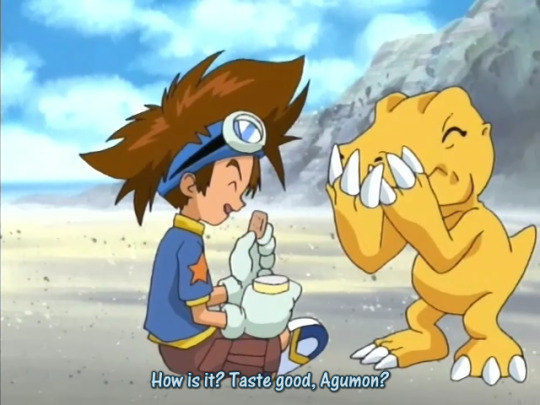
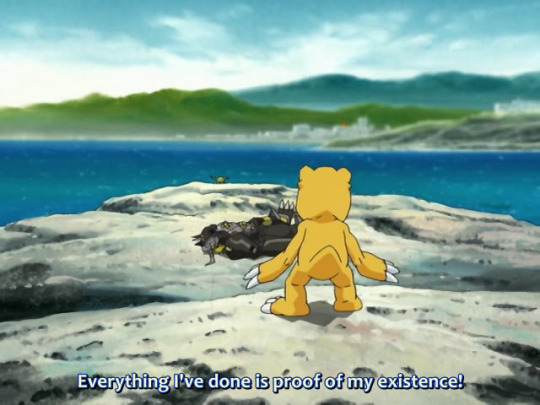
Taichi and Agumon immediately jump to mind as the first among the “like-minded” pairs, especially since the series shows them so often in sync and chilling together. Taichi himself is a straightforward person, so it stands to reason that his straightforward personality would also lend to Agumon coming off as being rather much like him.
However, there is one slight difference between the two, and it’s that Agumon has a somewhat stronger sense of “easygoing chill” than Taichi does, right down to using the more polite boku first-person pronoun in contrast to Taichi’s more assertive ore. He also lacks Taichi’s penchant for mild insensitivity -- in fact, very unlike Taichi, he has an incredible amount of emotional insight (02 spends quite a bit of time in 02 episodes 32 and 46 to showing off Agumon as someone who makes up for all of his lack of intellectual understanding with emotional and borderline poetic insight). And, really, while Taichi is a bit surface-insensitive, and while he seems to be impulsive, he actually is a conscientious person and is trying his best in his own way, and he isn’t the kind of person who cares about societal things like seniority, and he demonstrates multiple times that he’s easygoing and chill, and so you can say that’s a part of Taichi as well. Remembering that a Digimon partner’s presence helps their own human partner grow, Agumon being so openly friendly helps Taichi maintain good relations with others without running afoul of them.
One of Agumon’s most famous traits is that he likes food, which is not actually something that was in the original Adventure or 02 all that much but has been somewhat exaggerated since. That said, back in Adventure, while it was established that all Digimon regularly need food in order to maintain their evolutions, Agumon would usually be the first to complain “I’m hungry,” and whenever they did get food, Agumon would be one of the most prominently enjoying it. Food is, after all, one of the simplest and most universal of pleasures, and there’s a lot of visual framing of Taichi chowing down just as ravenously as Agumon is -- so, honestly, he probably got it from him.
Taichi also speaks a bit about his pain of being separated from Agumon in the space between Adventure and 02, and he directly refers to Agumon as “the other me”. The word “partner” was not actually used very much in the original Adventure or 02, and Taichi is not able to fully elucidate the sentiment of Agumon’s connection to his own self, but he still understands this much and why the loss cuts him so deeply, and by the time we get to Kizuna, it’s presumably why he uses similar language in his thesis proposal to refer to him. (I already covered the circumstances of Agumon’s relationship to Taichi’s existential crisis in Kizuna and how it led to their separation earlier, so I will omit it here for the sake of avoiding redundancy.)
Yamato and Gabumon

This might surprise some people to hear, but I would also pin this as one of the more ostensibly “like-minded” pairs. Gabumon is shy on the surface, but turns out to be quite passionate -- he uses the same assertive ore as Yamato, in contrast to Agumon’s boku, and he demonstrates his capacity for passion and action in that he’s arguably one of the most assertive in the cast. Note his taking initiative against Yamato’s frostbite in Adventure episode 9, or declaring his intent to stay with Yamato even if it means going against the others in Adventure episode 44, or singlehandedly dragging Yamato out of the hole of darkness in Adventure episode 51.
And, of course, Yamato himself is someone who initially seems a little awkward or detached around everyone, but is actually very passionate, so that’s all the same. And because Gabumon himself is so open about communicating with the otherwise closed-in Yamato, Yamato is able to express himself better over the course of Adventure.
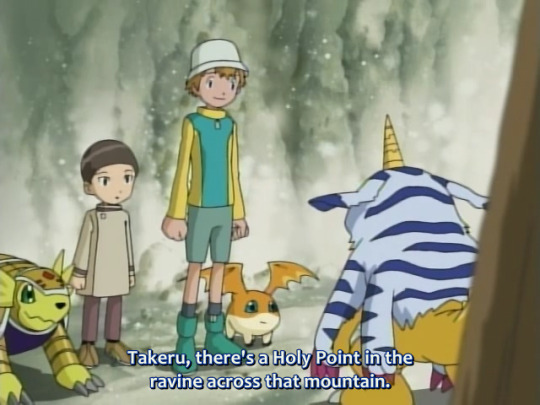
Funny thing about that “shyness”, too -- the idea of Gabumon being particularly shy isn’t present in 02 much at all (we don’t get to see him very much, so it’s hard to say whether it’s completely gone, but it’s at least gone enough for the duration of his appearances). Which is funny, considering: guess who else stopped being shy and became naturally outgoing in 02? Yeah, so, as much as you might hear people (even official!) claim that the Digimon are static while their partners change, that’s not completely true -- the Digimon themselves develop in personality in the same way their human partners do. It’s just more subtle and less drastic, since they’re representing an abstract single part of their personality rather than being an exact match.
Sora and Piyomon
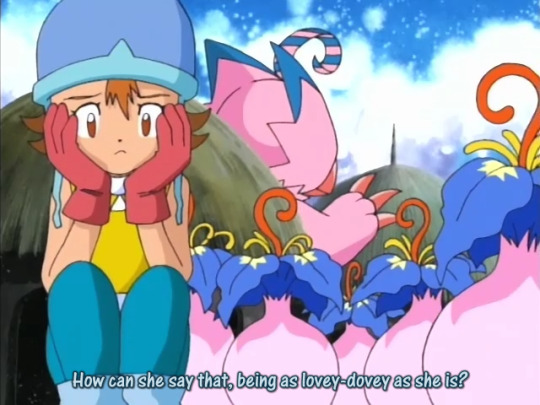
Sora and Piyomon have an interesting relationship in that they’re the only one where their relationship started off on a note of conflict -- mainly in that Sora was very put off by Piyomon at first and even looked down condescendingly on her (well, only for the duration of a single episode). In fact, Sora’s own surface behavior is very different from the kind and caring Sora we know -- Sora dislikes associating with the clingy and affectionate Piyomon for being “mushy”, and even declares that she doesn’t want to “take responsibility” for lugging her around.
Of course, Sora’s character arc later revolves around the fact that she has abysmally bad self-awareness and doesn’t even realize that she has a compulsive sense of responsibility to others. So Sora is affectionate and loving -- she just puts up a front of trying to act a little above that (well, at least, during this part of the series) and doesn’t even see herself as someone capable of being like that (again, purely during this part of the series).
Piyomon is also interesting in that she has one of the most dramatic personality shifts even as early as Child to Adult, where she suddenly switches from the casual atashi to watashi (sometimes even kono watashi, which is super regal), and becomes incredibly dignified and regal even as Birdramon, and you can certainly see why Sora immediately started taking her seriously thereafter. It also begs a lot to think about, considering Sora’s very convoluted character and the many layers of herself that even she isn’t consciously aware of.
The way Piyomon helped Sora shift her own mentality is pretty directly handed to you on a plate in Adventure episode 26 -- because Piyomon played the role of Sora in the metaphor of Sora’s behavior towards Piyomon correlated to Toshiko’s behavior towards Sora, Sora was able to re-adjust her position relative to her family and consider her both someone capable of love, and someone who is loved.
Koushirou and Tentomon
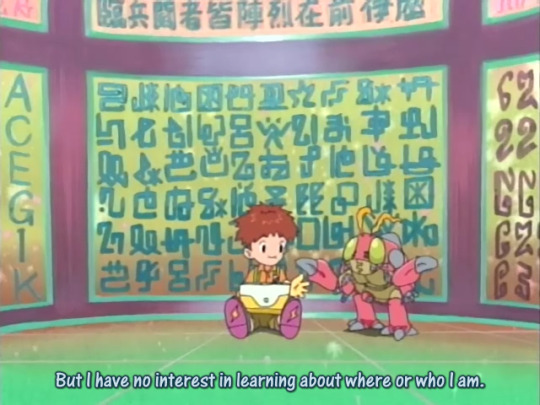
Koushirou and Tentomon are another pair that initially seem like they’re opposing types, with Koushirou being constantly curious and Tentomon being comparatively simple-minded, but the first key to figuring out where the similarity is ends up being a bit deceptive -- Tentomon says in Adventure episode 5 that he’s not particularly interested in himself. And, certainly, Koushirou is interested in Tentomon, but he, too, is not interested in himself -- in fact, he considers himself to be a topic he’d rather avoid instead of looking into everything else.
As far as language goes, while Tentomon does also use the stereotypically easygoing Kansai dialect, he also specifically uses the polite form, mirroring Koushirou’s own perpetual use of polite language. But unlike Koushirou, who uses it to keep distance from others, Tentomon is in fact very sociable, and is even portrayed as a Digimon who’s conscientious of others and “takes care” of them. And because Tentomon is so openly friendly, he manages to coax Koushirou out of his shell and allow him to think about more complicated things related to his own position in the world that he’d been avoiding.
As Koushirou’s character arc proceeds, we learn that he’s polite not only out of distance but also because he really is a very kind person, and moreover that he does eventually want to open up to others. And the payoff for this eventually comes in 02...

...when he ends up becoming one of the most visible members of the older Adventure cast to appear in the series, checking in on the younger kids and developing into someone capable of organizing and managing people. Hmm, seems familiar.
Mimi and Palmon

This one’s an easy one. Mimi is possibly the most straightforward person in the original Adventure cast -- well, that’s the point of her Crest after all -- and so Palmon is almost exactly like her, being a cheerful type who loves being cute. Any contrast between them is only really apparent in the very early episodes of the series, and that’s not even a contrast in theory as much as it’s just something that might intrigue audiences at first when Mimi spent a lot of those episodes complaining, but that’s also mostly because she was heavily under stress, and otherwise Mimi has always been kind and cheerful and indulgent in being cute.
Perhaps the only real difference is that Palmon, being a plant, is more willing to get involved with dirt and other things that Mimi ostensibly would rather not, but as the series progresses, Mimi manages to gain a higher sense of tolerance and get past her initial sense of materialism (which is something she’d had the capacity for the whole time).
Jou and Gomamon

Of the Adventure pairs, this one is probably the one that seems like the biggest contrast on its face, with the overly high-strung and constantly stressed Jou, and the more playful and relaxed Gomamon.
In the end, Jou is someone who’s defined by his desire to support others, and even admits at the end of the series that he’s better suited for a support role than for fighting, and that there’s nothing wrong with that as long as he continues to channel his desire to help people in a way he’s most comfortable with. So, in the end, he’s not actually an inherently aggressive type. And, meanwhile, Gomamon is the kind who’s constantly looking out for Jou, to the point of knowing (such as in Adventure episode 7) when he’s about to do something phenomenally stupid and minding him so that nothing bad happens to him, and so, this is probably why they’re ultimately able to settle down and end the series eye-to-eye (or perhaps hand-to-hand).
And, again, recall that Digimon partners generally reflect a part that’s vital to their own human partner’s growth; considering that Jou is most certainly one of the more extreme personalities in this cast, you get the feeling that he probably needs someone this chill to keep his massive stress tendencies in check.
Takeru and Patamon

Takeru and Patamon are an interesting case largely due to the two of them being so present for a whole two series. In Adventure, both of them seem to be largely like-minded, being playful, innocent, and childish -- although Patamon is more open about expressing the childishness that Takeru keeps trying to cover up. Patamon being roughly on the same playing field (no pun intended) as Takeru means that Takeru has someone he’s willing to be open with and let himself loose a little (such as in Adventure episode 12), because for the first half of the series, he’s almost entirely in the presence of elders and stifling himself for the sake of being “well-behaved”, and it starts his long journey of being able to understand his position and his actual sense of emotions over the course of Adventure and 02.
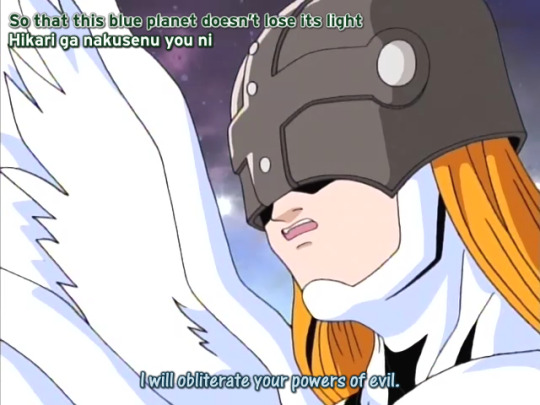
Patamon also has a striking personality change upon evolving, becoming the regal and dignified Angemon, and, interestingly, his appearances have a very “knight templar” vibe where he takes a no-compromise stance against dark forces and states that he’ll condemn all of them to oblivion. This is a stance that’s unnervingly similar to Takeru’s own no-compromise stance against the darkness in 02, and it’s interesting in that Takeru himself had been advocating for pacifism in Adventure episode 12, but this incident traumatized him enough to start taking a position that more resembled Angemon’s.
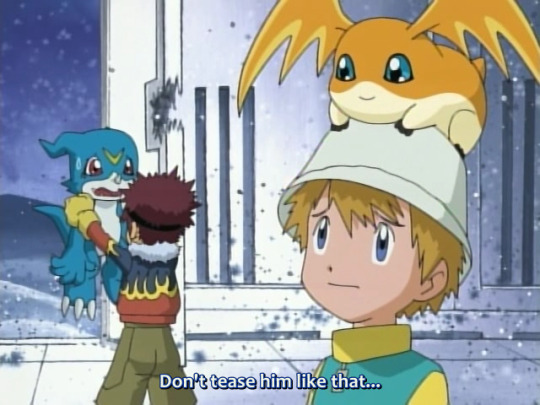
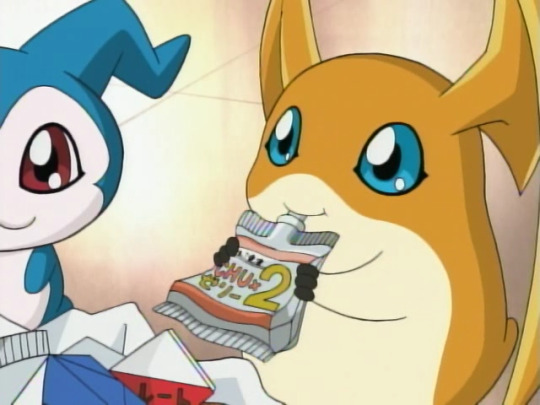
As we go into 02, Takeru’s contrast with Patamon initially seems like an increased mismatch, since Patamon is still ostensibly childish and playful while Takeru is ostensibly more mature. But for one, Takeru’s character arc is about the fact that he’s still pretending he’s more in control of his emotions than he actually is, and in some way you can also glean that there’s a sort of naivete present in his character that he keeps covering up with confident smiles. Patamon, for his part, does actually seem to have adopted a bit of a mentor role to the other Digimon, and we also learn that he’s capable of deliberately trolling people instead of just being generically playful -- much like Takeru himself, who’s a bit evasive and not entirely honest.
We do actually see Patamon reach HolyAngemon in 02 episode 34, but it doesn’t work out well, and while this is partially for plot mechanic reasons, it also says a lot that the “knight templar” stance that both Takeru and HolyAngemon have, with the full depth of no-compromise, isn’t going anywhere, and in the end, something more effective is only possible when Shakkoumon appears in 02 episodes 36-37 -- that is, Takeru is only able to better move on with Iori’s support.
Hikari and Tailmon
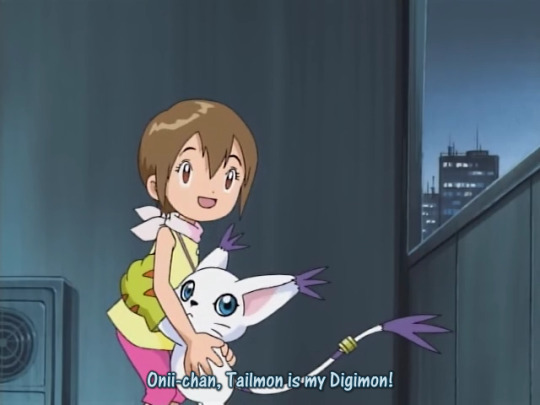
Hikari is the only of the Tokyo Chosen Children to have a Digimon who “defaults” to Adult instead of Child or lower, and it means that Tailmon herself comes with a certain amount of maturity -- on top of having been become a bit hardened due to her experiences being isolated. This is an ostensible contrast to the more pure-hearted and innocent Hikari, but note that Hikari’s own will can be pretty assertive when it comes down to it. On top of that, as much as Tailmon is a bit standoffish, Hikari is also “emotionally isolated” -- she has trouble vocalizing her negative feelings, and it’s difficult for anyone in Adventure or the first half of 02 to truly connect with her internal thoughts. Recalling that the Digimon partner reflects a side of the human partner that’s less easily exposed and allows the human partner to grow in ways they wouldn’t before, Tailmon’s sheer presence gives Hikari a route to action in ways she probably wouldn’t have beforehand.

In 02, Hikari becomes a little more mischievous and playful, and Tailmon also becomes a bit more willing to indulge (she even switches first-person pronouns in sync with Hikari, going from the more polite watashi to the more casual atashi). Both of them are now more able to enjoy themselves more openly. That said, Tailmon still has a certain degree of stuffy personal pride (she snarks at everyone quite easily for fussing over snacks in 02 episode 3), and Hikari herself remains emotionally elusive and repressive at the start of this series.
Tailmon evolves temporarily to Angewomon in 02 episode 13, which is the first time anyone (in this case, Takeru) makes some degree of headway to reaching out to her and allowing her to open up a bit more, but it’s not until 02 episode 31 when Hikari is fully reached out to via Miyako, which marks the first appearance of Silphymon.
Daisuke and V-mon

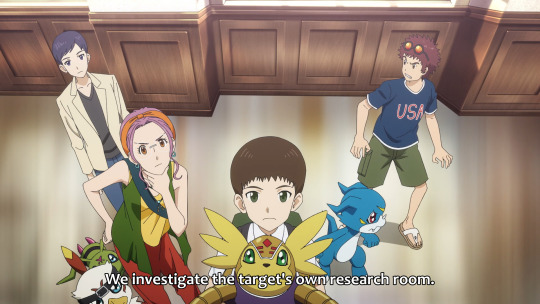
Now here’s a very like-minded pair, even more so than Taichi and Agumon -- and, after all, Daisuke is simple-minded, so painfully simple-minded that he’s practically incapable of hiding anything, and so V-mon is almost exactly like him, down to using the same ore pronoun and being feisty and mischievous (a point is also made that he plays soccer with Daisuke, something that Agumon didn’t necessarily do with Taichi), and, heck, in a rare show of Digimon-Digimon crushes, has a crush on Tailmon in the exact same way Daisuke has on Hikari. (By the time we get to Kizuna and its higher animation budget, a lot of attention is paid to having even their body language mirror each other.)
There is only one real functional difference between the two in disposition, and it’s that V-mon is very straightforward, friendly, and kind, without being prone to getting angry or spiteful at anyone, and in the end, it’s indicative of the fact that Daisuke’s tendency to lash out defensively at everyone is just a front -- at his core, he’s friendly, supportive, and kind. Daisuke’s experiences and banter with V-mon contribute to him getting the sort of validation he needed without having to worry about being on edge or lash out defensively, and because of that, he was able to form a healthier and more supportive relationship with the rest of the group.
Miyako and Hawkmon
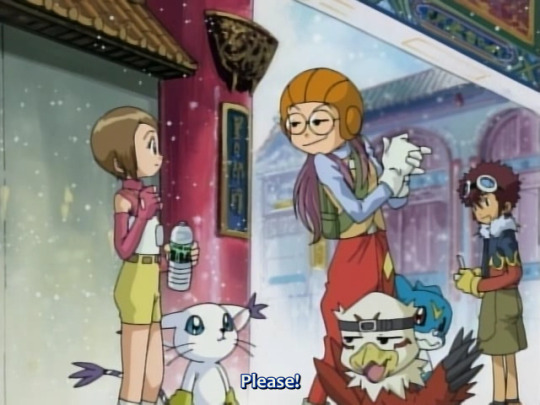
This one seems to be a contrast right off the bat -- Miyako is bubbly, over-the-top, and rather messy and lacking in restraint, whereas Hawkmon is formal, graceful, and polite. But Hawkmon’s most prominent trait is his absolute loyalty and devotion to Miyako -- he’s very often referred to by both official staff and fans as her “knight” -- and is constantly minding her to protect her and make sure she doesn’t go over her head (most prominently, 02 episode 18). And as far as Miyako’s relationship to others goes -- she’s also devotedly loyal to everyone she loves and is constantly going out of her way to help others, and her character arc in itself is about the fact she wants to do her best to reach out to people and help emotionally support them in the best way she can, and Hawkmon managing to channel that to its utmost extent to Miyako in turn (in a very “who watches the watchman?” sense) allows her to regain her bearings and have better control over herself in the aftermath of 02 episode 18.
On top of that, as the series proceeds, it turns out that Hawkmon also shares Miyako’s penchant for dramatic theatrics and being a bit over his head -- even if he seemingly has himself more together than Miyako does, he’s not completely above it all...
Miyako is also the franchise’s first example of a female character with a masculine Digimon partner, and while Miyako herself openly identifies with and indulges in all things hyper-feminine, she also has zero issue engaging in more masculine-associated things as they suit her -- most prominently her Digital World outfit, and the fact she often displays a rather aggressive go-getter and hot-blooded/in-your-face personality that would not be out of place on a male shounen hero in a more conventional show. (Although, as much as these have generally been on the thread of “less visible aspects”, it’s not like this was that less visible of an aspect of her to begin with...)
Iori and Armadimon
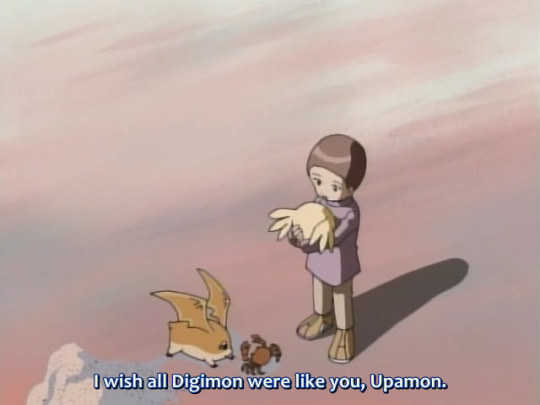
Iori and Armadimon hold the honor of being the only pair in the Tokyo Chosen Children to be voiced by the same voice actress (Urawa Megumi), driving the parallel down even further. And while their surface temperaments seem different, with Iori being rather uptight and strict on himself while Armadimon is laid-back, carefree, and even somewhat assertive, they’re not that different -- Armadimon is basically the curious, impressionable, somewhat childish spirit that Iori would be if he weren’t constantly holding himself back. (There’s a lot to be said about Submarimon going out of his way to take Iori for a ride in 02 episode 16 so that Iori can finally properly enjoy himself for once.)
Iori takes a lot of very stubborn, no-compromise positions over the course of 02, but Armadimon asking just the right kinds of questions allows him to “snap out of it” and be a little more receptive to considering alternatives, or at least taking into account more emotionally-oriented issues he’s dealing with. You can say that Armadimon (especially as Upamon) softening Iori up a bit -- since Iori will never be cold or unforgiving towards his partner, no matter what -- serves as a precursor to Iori starting to question the limitations of his black-and-white view of morality, which allows him to successfully break through to Takeru and fill out the rest of his character arc.
Ken and Wormmon
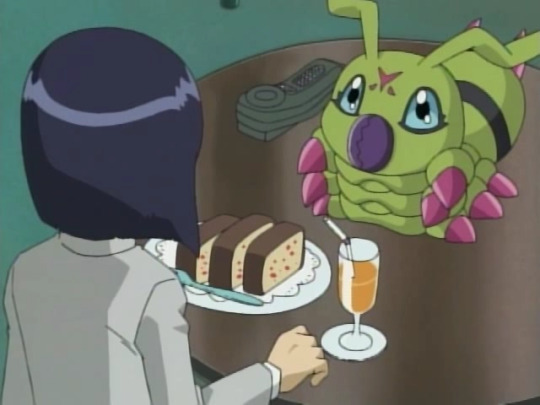
Considering how much of the plot revolved around this one, this one almost goes entirely without saying! During Ken’s stint as the Kaiser, Wormmon represents the heart that Ken’s not entirely willing to leave behind -- and, also, the affection that he’s still craving from his family. The Kaiser going practically out of his way to deny Wormmon yet paradoxically keeping him around is basically his attitude towards his own “weak” and naturally kindhearted self. Notably, recall that the principle of “a Digimon will never deny their partner” applies here -- Wormmon’s “betrayal” of the Kaiser isn’t really any kind of denial, since he was doing it mainly for Ken’s own sake, and, more symbolically, it’s Ken reaching his own limit and coming to realize that this path isn’t what he really wants.
Wormmon is unusually clingy to his own partner over the course of 02, and it’s vital to Ken needing to learn to love himself and also getting important validation that he needs, especially during the critical point in time during 02 episodes 23-30 when he’s still not sure how to approach the rest of the group -- Wormmon gives him someone to talk to honestly and openly, giving him a proper springboard to sort out his complicated feelings about the others and himself. You can say also that as Ken becomes more open and straightforward over the course of the latter half of 02, he, in turn, becomes much more shameless about showing affection and opening his own heart.
Wallace, Gumimon, and Chocomon
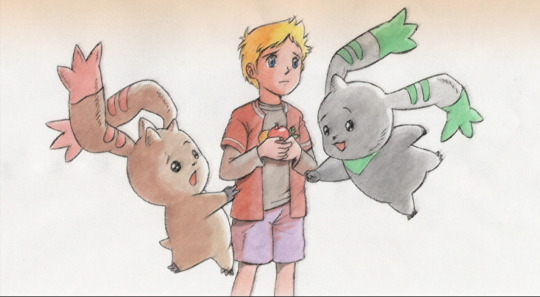
Bonus round!
While it’s hard to fully apply Hurricane Touchdown to this theory (by official admission, it wasn’t properly cross-referenced with the original Adventure/02 series lore, and trying to correlate all of the evolutions in this movie to something metaphorical will give you a headache), Wallace’s two partners still fit very neatly into this overall theory of Digimon partners as a part of the self. Wallace is a character with very sharp duality, trying to be a flirt who asserts himself as a vagrant who’s about to “become an adult”, yet still feels an obligation to keep calling his mom and is engaging in increasingly self-destructive behavior.
Most pertinently, Gumimon and Chocomon represent the two stances Wallace is torn between: wanting to “return to the past” (Chocomon) because he’s still hung up on having lost Chocomon and is convinced that he can make everything just like it was before, and “being able to productively move on” (Gumimon). For most of the early parts of the movie, Wallace is stuck on Chocomon’s mentality of fixating on the past, and Gumimon isn’t even remotely subtle when he draws an explicit parallel between the two (saying that Chocomon didn’t like the heat, followed by offering to give Wallace shade as a hat). But once the conflict escalates and Wallace realizes just how deep in denial Chocomon is, to the point of being destructive to himself and others, Wallace comes to embrace Gumimon’s stance of practicality and moving on. In the end, the ultimate conclusion is reached, and Wallace is forced to fully accept that latter stance when Chocomon dies, but the movie’s ending (and Kizuna) provide an extra option: allowing the past to come back, but in a new form and treading new territory instead of trying to make it “the way it was before”.
#digimon#digimon adventure#digimon adventure 02#digimon adventure last evolution kizuna#kizuna spoilers#qwertyshuman#shihameta#shiha's ask box
205 notes
·
View notes
Text
Bleach Canon Vs. Studio Clown Episode 1
Intro to the series
WARNING: Long read but theres plenty of pictures

The first deviation we’re greeted with is what the anime presents as the arrival of hollows into the human world. With a likely artistic rendition of them forming from the shadows of Hueco Mundo and dripping/bleeding over into the human world like splotches of ink, after which they disappear - unable to be perceived by humans.
A/N: Which, kubos to the anime, is rather neat.

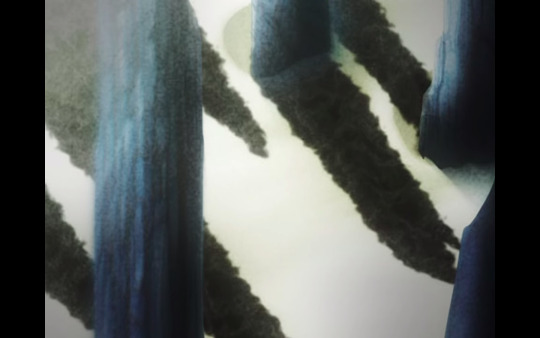


The anime also decided to incorporate the first volume poem which is the thematic beginning and a great establisher of the mood/themes of Bleach, which roughly translates to:
我らは 姿無きが故に それを畏れ
“We fear that which cannot be seen”
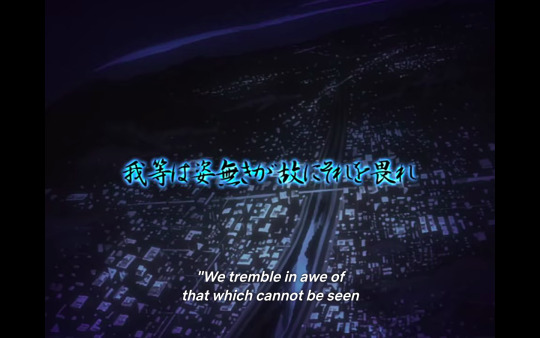
And then they curiously add a line to this poem?
姿無き故に敬う
”We revere that which cannot be seen"
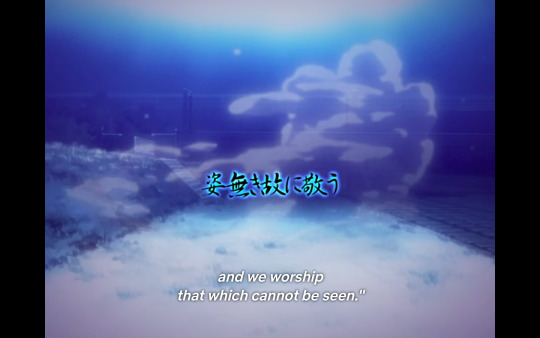
A/N: Which, initially seems on brand with the spiritualism of that “which is not seen” - the shinigami, DEATH itself if you will. However, unlike the themes of “fear” and “fear of death/the unseen”, “reverence” is not really a theme prevalent or definitive for bleach. Reverence is not particularly reserved for death or death gods, but antagonists with themes of divinity/the Soul King himself, but I digress.
Next off the bully scene has a couple of missing/reworded lines, as well as some of the delivery changed, but overall it’s not significant enough to mention.
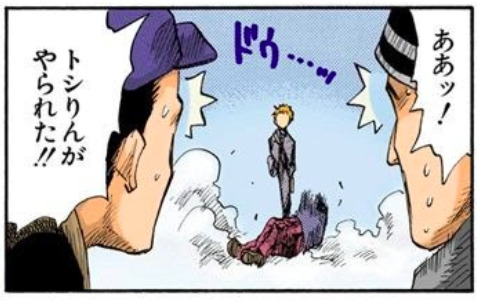
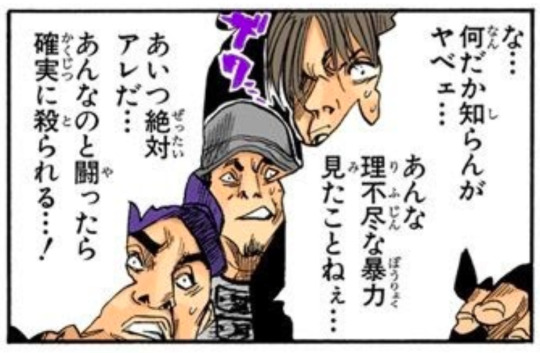
I also wish they’d kept Ichigo’s shit yourself scary face from this moment right here, since it really underlines how serious and personally invested Ichigo is in bringing small justice to the souls of the departed, but I can only pray a future remake does include it.
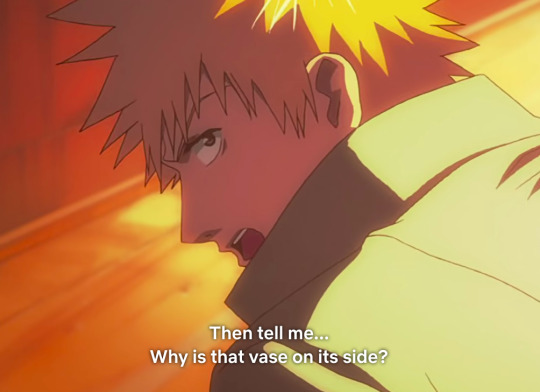
^ I am disappointed in y’all :/
vs.
v Karma delivery, bitch

Then for some reason the next scene is changed significantly:
In the manga, it builds up slowly to Ichigo’s reveal of supernatural abilities with the iconic TM character profile intros (which I can see why weren’t recreated in the anime, but I sure wish they put them in....)

with him spooking the bullies off with the ghost girl right behind him
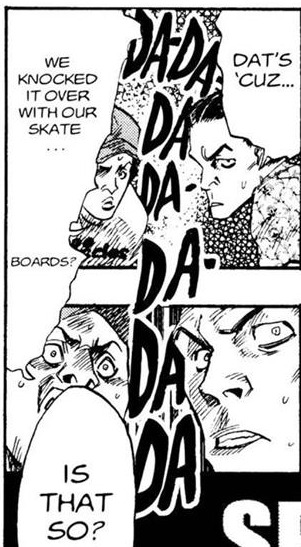
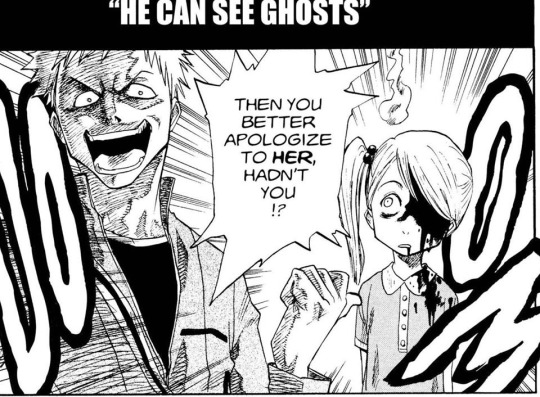
Versus his scary face doing the job instead.....

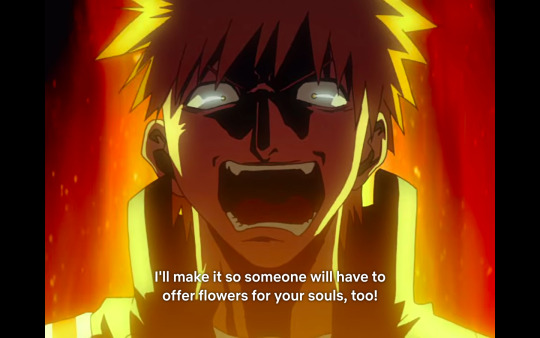

It’s a small change, and I can see why it would be opted for - we don’t really know if they even saw the ghost in the first place (then again you could argue that would spook them anyway). There is a tonal difference in the long run though. The manga emphasizes once again *why* ichigo is scolding them in the first place - he sees the people disrespected by them knocking down the vase, he wants them to acknowledge their actions *because* in his mind, there are real victims he knows from it. While in the anime, since the ghost is not yet introduced, it feels more like “you are disrespectful to the dead” in a more generalized way vs. him actually being acquainted with the dead and treating them like the living.
(Again, not sure why change it so much at all........the suspense and reveal are in the manga just the same.... but ok)
As well as cutting off this small moment where you can see Ichigo’s very human (and cute!) interactions with the ghosts. To him they’re just as real as the living, and he lends them a hand whenever they ask for help.

Also lmfao this 4kids level of censorship.....
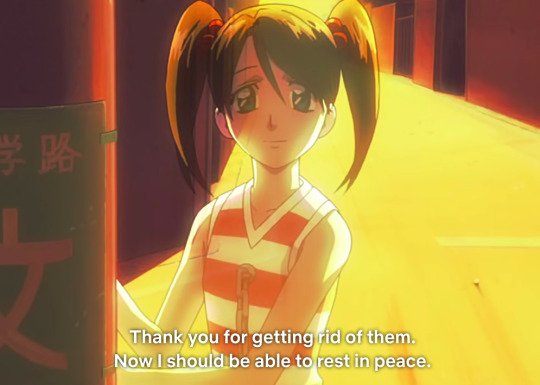
It goes on rather faithfully for a while, no significant omissions, then Pierrot decides to randomly replace Yuzu’s lines with Karin??
Manga:

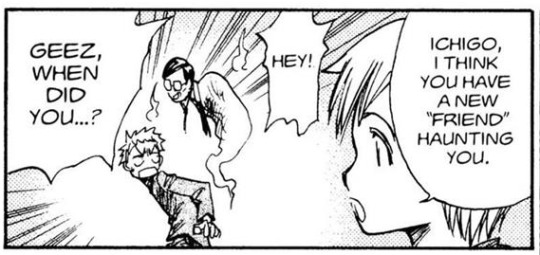
Anime:
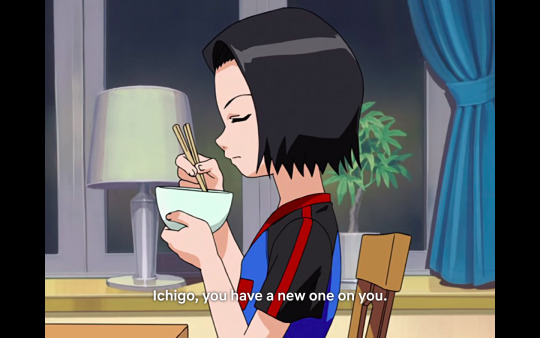
Which is an odd choice, given that not only does Yuzu sense ghosts just fine (albeit at a much lesser level than her family) and that later comes into play with Fishbone & Grandfisher, but Karin literally later admits that she doesn’t even want to acknowledge their presence, so why the change....?
They also cut short Karin’s little talk about Ichigo’s stats, which is a fair change for screentime’s sake, but mentioned for the record.
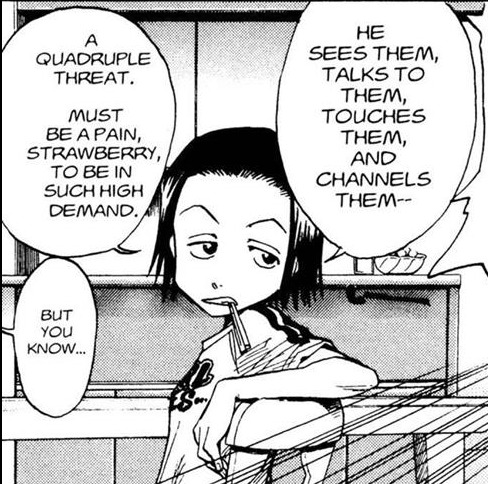
There’s a bit of a divergence with Yuzu lore, when the manga explicitly states she sees them, but not “clearly”, the anime focuses on her barely sensing them. I guess it doesn’t matter that much in the long run, since she is not that prevalent in the story, but it’s here for the record nonetheless.
Anime:
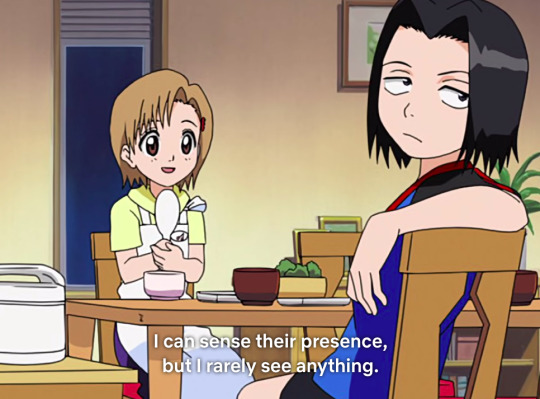
vs.
Manga:A
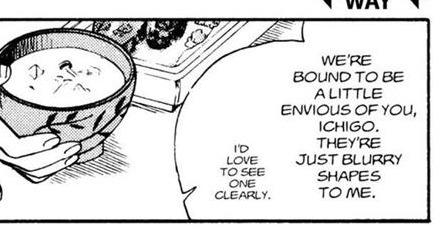
Also this next bit was removed, probably for the sake of pacing (which, totally fair!!), but it’s funny and I love the Kurosaki family so here it is:

It does make the flow a bit better in the manga, since this talk of selling his talents distracts Ichigo and creates an opening for his father to strike, in the anime, the same is done with Ichigo just randomly saying
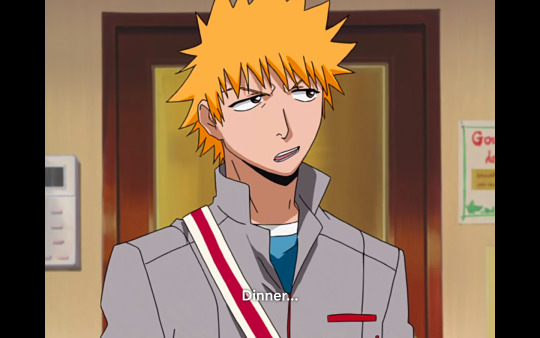
and thats where his father attacks him, which isnt really an issue, just kind of funny of how the manga is like:
Ichigo’s distracted by his sisters plotting to sell him out and hence Isshin has his chance to strike back
vs the anime being like:
Ichigo randomly thinks about dinner mid convo about ghosts and thats what distracts him from play-fighting with his dad
gfdkhlgfdg okayyyy....moving on
In the manga this scene is interspliced with Ichigo’s inner monologue about the nature of his powers (with hip jargon like “for real” courtesy of Viz )
(but my beef with Viz translations are for another day)

Also the line about “He told me more ghosts than ever have been haunting me” has been given to Karin for some reason, probably to make her feel more included in the scene/Ichigos life.
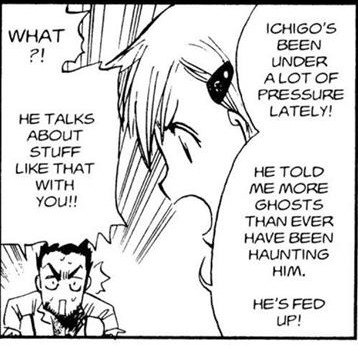
Notably, Isshin’s response is changed from “What?! He talks about stuff like that with you (Yuzu, singular)” to “What?! He talks about stuff like that with you guys?” as well, again probably to include Karin more into the dialogue. (Mmmm ok....)
Minor detail, but Karin’s lines has been changed to more “boyish” speech structure in the Japanese dub, which may seem insignificant, but ...... that is for later.
.....
This little exchange
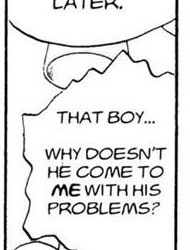
is replaced with:
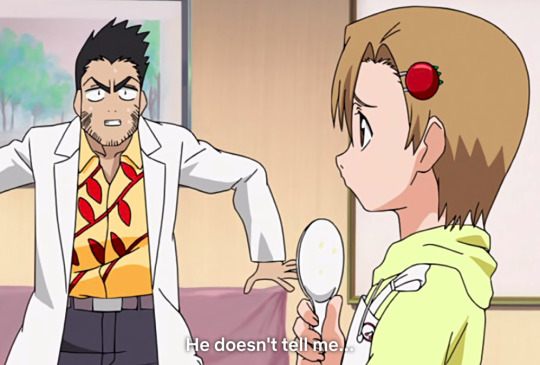
Which, seems innocuous adaptation differences, but Yuzu’s lines keep decreasing and it’s a short enough moment to like....include and establish how motherly Yuzu is acting towards Ichigo.....but ok...huh.
And now we get into the big boy changes.
So, probably for the sake of grounding the supernatural element of the series, the anime decided to skip time to the next morning and introduce the hollow attacks with a news report.


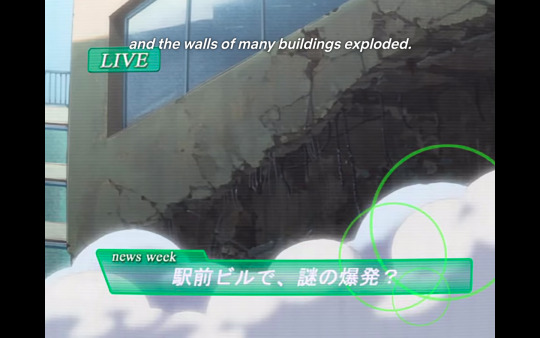
Which.....is an interesting choice. I am assuming this is addressing how the real world perceives the hollow attacks, which Bleach doesn’t put too much effort into addressing, but very soon after this we learn about stuff like memory replacement and other various technology to keep things under wraps so this is either redundant or implying that shinigamis have not been doing their job, which hm......
Next off is the bizarre choice to paint Isshin out of the picture for the night
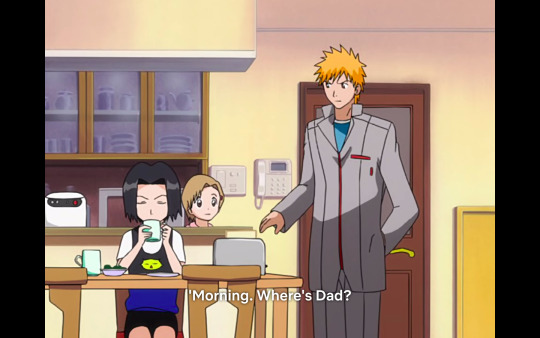
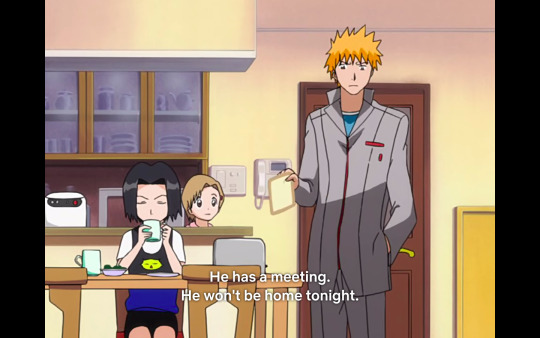
Not sure why, but ok

Again, where’s the shinigami with their Kikanshinki (memory replacement devices)??? Pierrot where’s the lore coherence......
Anyway, Ichigo goes to replace the girl’s vase, but suprise-surprise she’s gone-zo. Wonder what happened to her.....

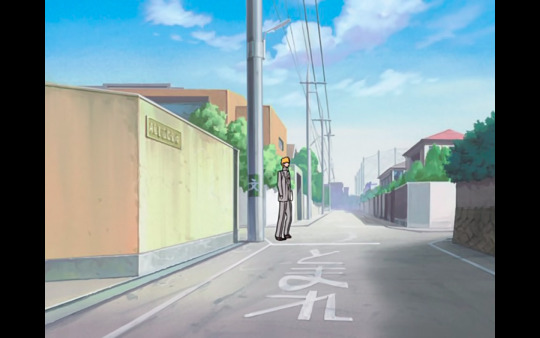
(And....again, people vehemently don’t want a reboot when the anime looks like this? )

So Ichigo hears a scream and a hollow scream and follows the sound (Ok?).

Totally random hollows attack. Which Ichigo somehow has never seen so far? Mind you, this isn’t like in the manga, where Fishbone was sent by Aizen specifically after Ichigo to make him aware of it. These are random-ass hollows attacking people, so how come Ichigo suddenly sees them. Ya coulda played it safe Pierrot, and stuck to the book, but we got plot inconsistencies episode one so let’s party.
The girl is, of course, not eaten and they run away.

She trips at the most inconvenient moment. (can ghosts trip? Ghost don’t even have legs in japanese lore and Kubo draws them floating around so okkkkkkkk)
(ok ok, im just being petty, bUT YKNOW)
(convenient tripping on deadass levelled ground is convenient)
(also God I really want that bag Ichigo’s got on his shoulder, it looks so nice)
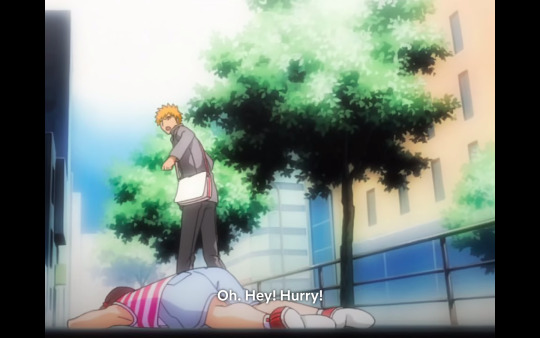
Random-ass hollow closes in and
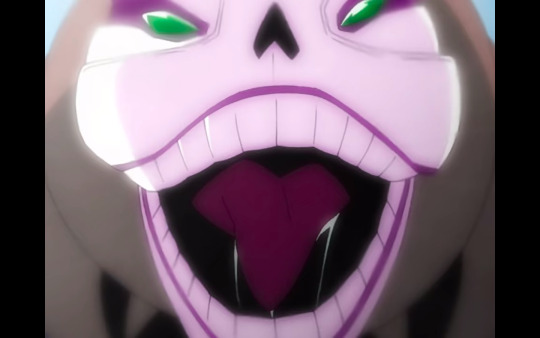
BOOM
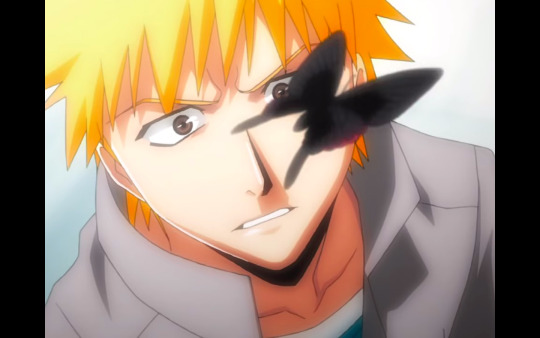
Rukia
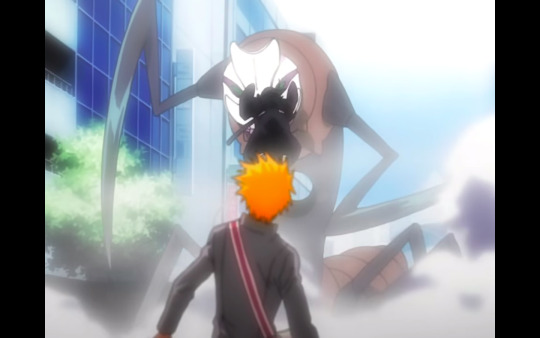
(Now, if the rest of Bleach and the manga didn’t exist I would like this moment. We get a glimpse into Rukia’s abilities, into shinigami as a concept and we don’t really get to see her slice and dice hollows that much overall so the moment itself is rad in isolation.
Now, unfortunately for Pierrot’s screenwriters, Bleach manga exists and so does it’s lore, which again, would not be inconsistent with each other if the adapation was faithful. Now, Ichigo sees a shinigami, for some reason, for the first time in his 15 years of life. All of a sudden.
You could argue, that much like in the manga, this is all part of Aizen’s plan TM, but like, she literally leaves right after leaving Ichigo gaping in awe ghfkjgdf. Why’d Aizen give him an appetizer, I really don’t understand how this change is benefitting the narrative in any way. It’s ....dare I say....generic.)
Rukia yeets the hollow
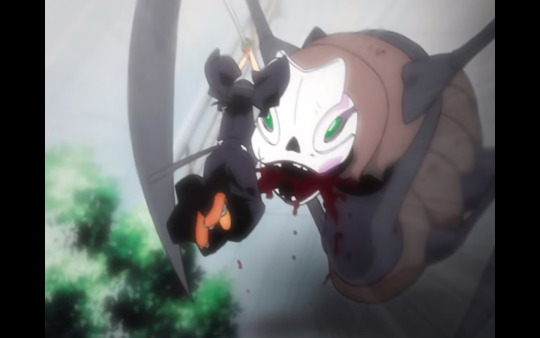
(why is this kid suddenly not wearing shoes?)
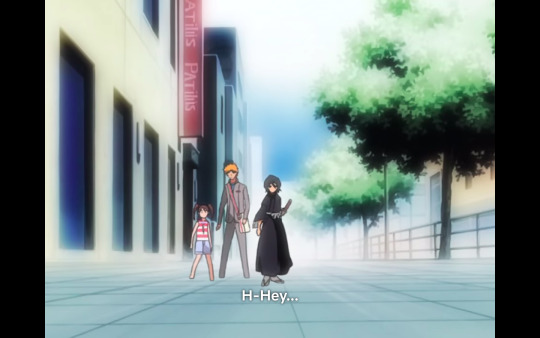
and goes off on her merry way, leaving Ichigo shooketh
ALSO RUKIA MA’AM THERES A FUCKING STRAY GHOST RIGHT AT YOUR RIGHT????? ISNT IT YOUR LIKE....JOB.......... TO HELP GHOSTS MOVE ON??? i know killing hollows is the fun part, but like ghjkfdlgfd ??? are you gonna ignore her???

( his fucking face ghfjdkgdlfgfd)
So after this wholeass pointless detour (you’ll see why it’s pointless in a moment) we timeskip again (the filler is strong in this one. These 6 minutes were worth not coming up with something cohesive and removing scenes that actually make sense ah yes)
Ichigo is in deep thought TM about who tf is the stranger he’d just seen. Likely mulling over the monsters and how this person was able to slay said monsters. Probably thinking how unusual they are.
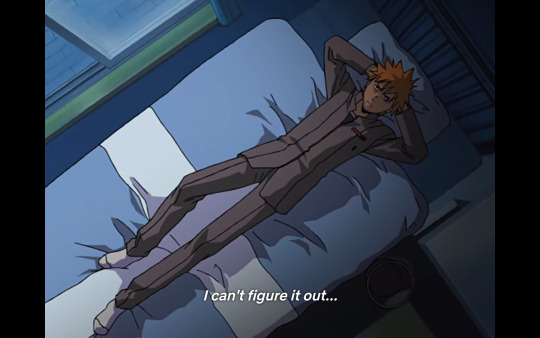

and as if on cue

the stranger makes their presence once more


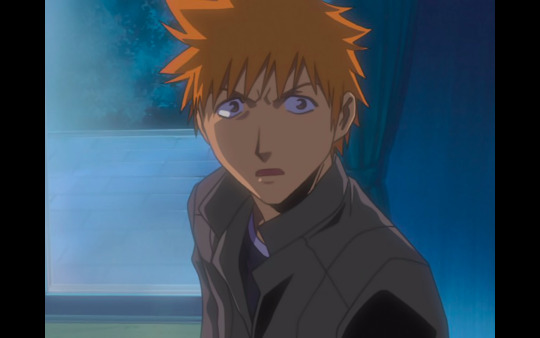
(my God these faces gfhgkldfg)
....
Now let’s briefly address what happens in the manga instead.
Instead of the whole timeskip scene with the fight, Ichigo simply returns to his room on the same day, and oddly enough recognizes the species of the butterfly he sees? (nerdy boi! nerdy!! boi!)
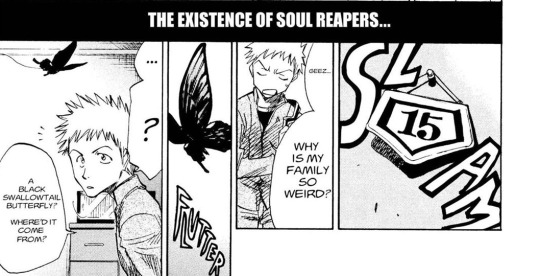
rukia arrives much the same

(With the little text emphasizing how he’d never been aware of soul reapers, which is unsurprising given their secrecy, and makes sense in the long run since their first meeting is specifically orchestrated by Aizen. Two species that werent meant to interact brought together by his schemes.)
Back to the anime:
Ichigo pauses to ponder who tf they are and why the fuck they’re there.
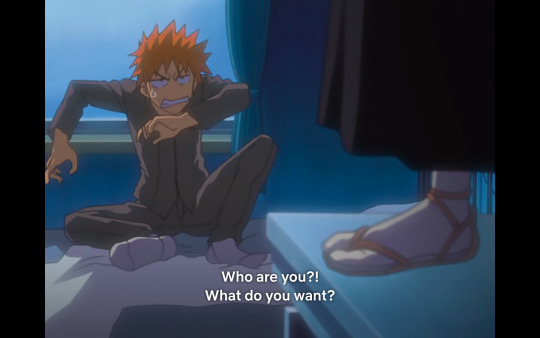
and then the anime has the gall to suddenly revert to sticking to the manga, which like.... Ichigo kicks her for no reason? I guess because she isn’t answering? Even though Ichigo knows she has a sword and can wield it? Reckless boy.
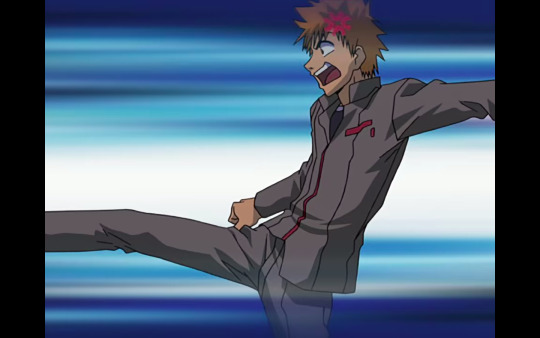
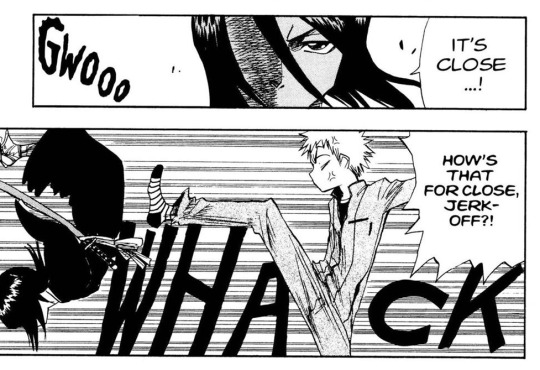
Manga Ichigo thinks she’s a burglar, therefore, unsurprisingly, is comfortable kicking her outta his house. It’s a silly moment, but it also shows how accustomed or stupidly brave he is with the supernatural.
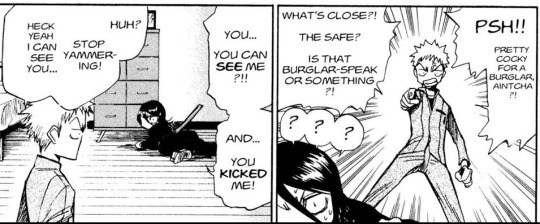
In the anime Ichigo asks her who she is instead of all that, and she responds pretty similarly to the manga
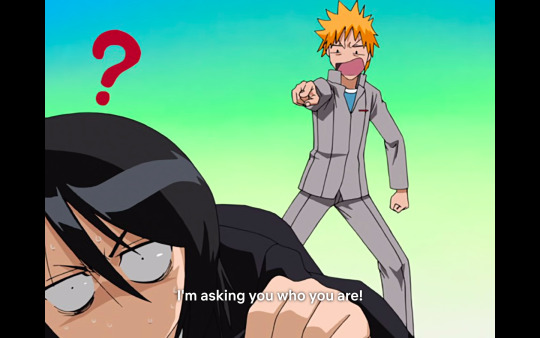
AND THE NEXT SCENE IS WHERE IT CLICKS WHY THEY WENT OUT OF THEIR WAY TO REMOVE ISSHIN FROM THE HOUSE.

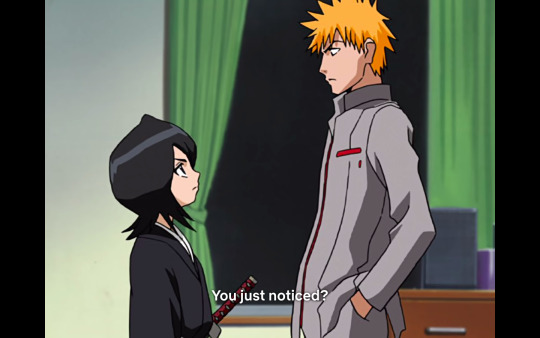
(Ichigo and Rukia addressing the pointless filler, this leads nowhere)
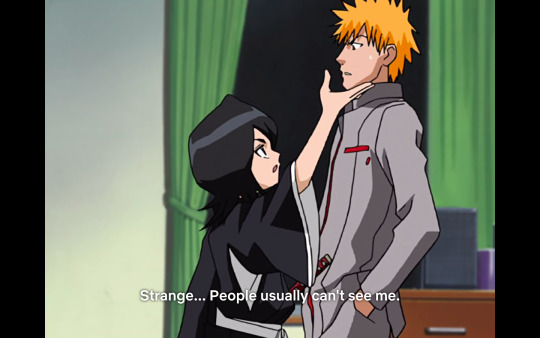
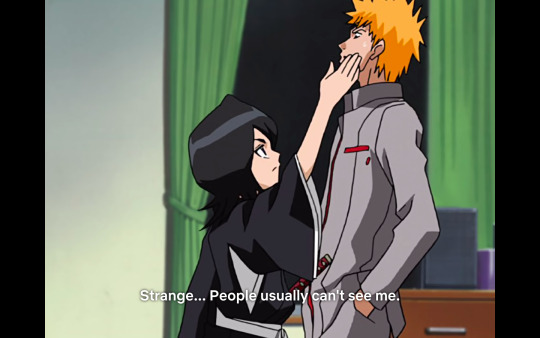

Rukia check him out like she’s checking if the oranges on sale dont have mold on them

slapstick ensues

and Rukia decides to answer his question.
Vs. the manga in which Isshin doesn’t leave his children home alone for some random conference and is actually used very efficient for two reasons:
1) building up on the burglar gag with actually funny slapstick that is based on a previously established joke
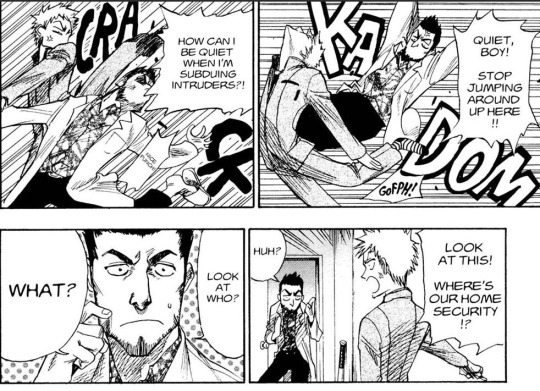
2) Instead of Rukia just saying “oh usually people can’t see me”, we get an actual demonstration of it, the reader gets to see “oh Isshin can’t see her - she must be a spiritual entity,” which further clicks with her surprised reaction at him being able to kick her in the first place.
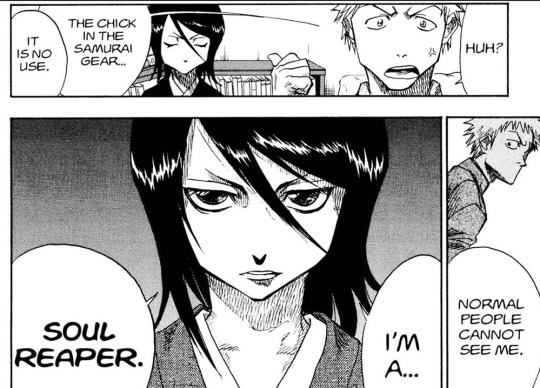
The next scene is the classique Pierrot censorship.
Ghost girl runs away from what I’m assuming is Fishbone.
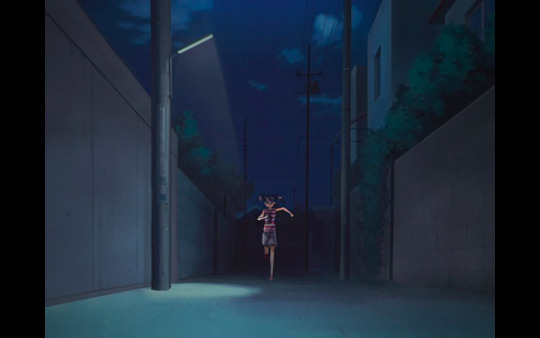
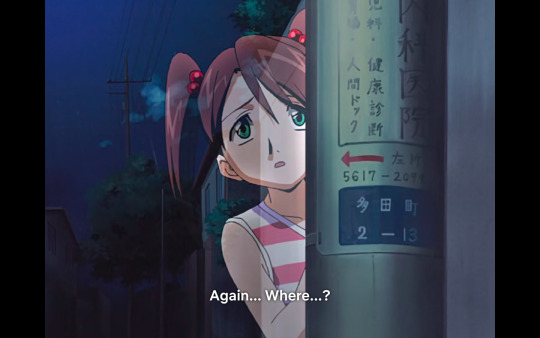
Aside from not showing her get eaten, the scene is pretty much delivering the same message,
bUT
BECAUSE OF THE STUPID ASS FILLER WITH THEM MEETING RUKIA BEFORE THIS, I CAN ACCUSE RUKIA OF NEGLIGENCE.
UNLIKE THE MANGA, where Rukia arrives the night before and is specifically seeking Fishbone, therefore having no time to help this girl pass away,
This vvvvvvv

could have been prevented if SOMEONE DID THEIR FUCKING JOB THE DAY BEFORE VVVVVVV

(I rest my case. Thank you Pierrot for making Rukia either negligent or an idiot. Awesome, And mind you, these changes were unnecessary. The manga’s pacing is fine. They could’ve extended scenes. But nope, had to go for making them meet beforehand.)
Anyway, we get to see some actual stakes in the manga
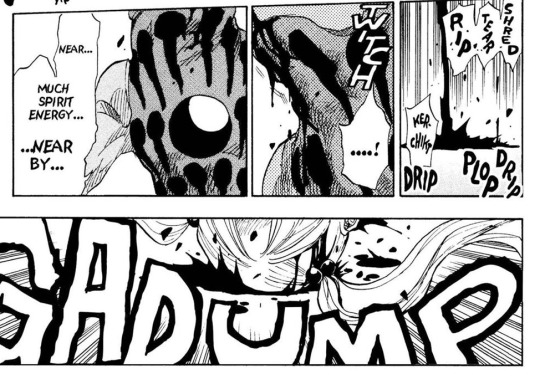
The next scene which is this in the manga
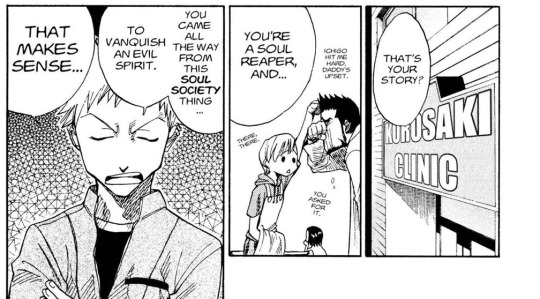
has two changes to it. Firstly, obviously Isshin being consoled by Yuzu isn’t included since he isn’t home in the anime, and even if he were, I can see why that would be removed, cute as it may be.
And secondly, due to them having met prior Ichigo asks two additional questions:
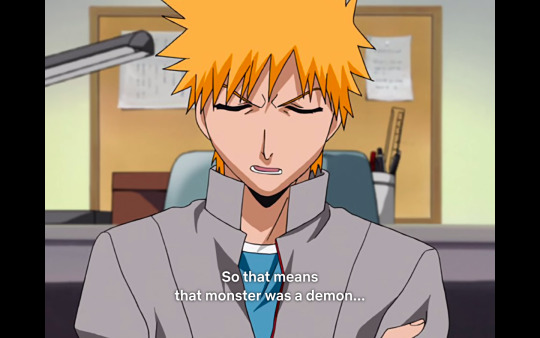

And Rukia nods at both, which means she acknowledges that she had seen the girl the hollow was after and yet did nothing to help her pass on.
(Reminder the Bleach anime was in production WAAAAY past the first 4 volumes, which gave a good general idea of the series, which y’know, was fine to adapt as is.
You’ll see these changes add up into becoming inconsistent with further Bleach lore. There’s a reason people call Bleach a hot mess, and I’m afraid Kubo ain’t really it.)
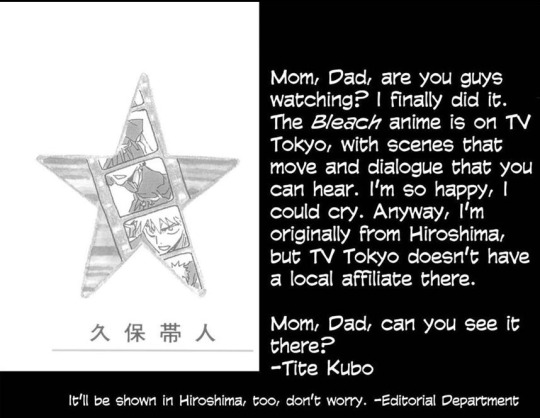
(Volume 14 Note from Kubo where he talks about the anime being announced)
Back to the series
Pet peeve time: Wish the anime was half as expressive as the manga
These scenes are supposed to represent
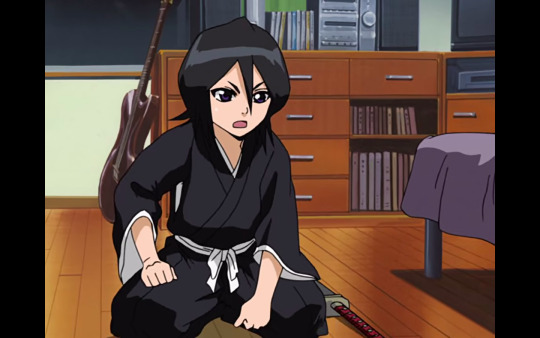
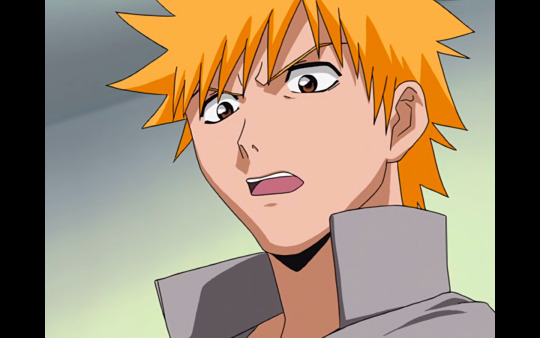
This panel:
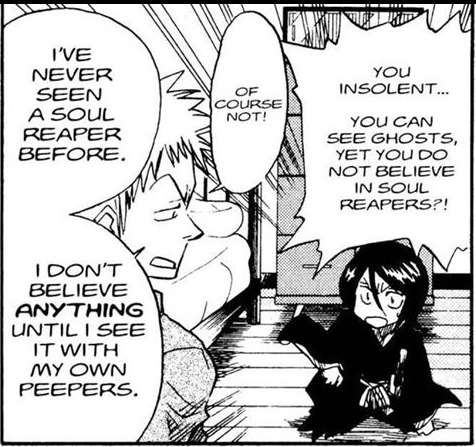
(Nitpicking? Perhaps, but idc)
So uh, this scene is odd
Again, because of the addition of that filler with the hollow
Ichigo has seen her in action
And they even added Rukia trying to convince him
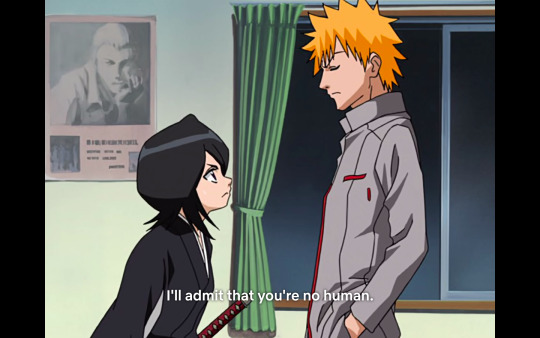


even though, yknow???
LITerally the previous day???

Anyway in the manga, where Ichigo has reason to be distrustful of her and her claims since y’know hes never seen her or a shinigami in action, but has enough proof that she’s a ghost bc his dad didn’t see her, he simply dismisses her before she can reply, and instead of just getting angry for being called a pipsqueak

she shows both Ichigo and the audience proof of her spiritual powers by binding Ichigo and forcing him to quietly listen to her explanations.

(To reiterate - Anime Rukia has to verbally try to convince Ichigo WHO SAW HER FIGHT A HOLLOW THE OTHER DAY that shes no ordinary ghost. And because of that, she has no other reason to use Sai on him other than that shes mad she was called a pipsqueak bc she just tried to verbally convince him shei is a shinigami. When they could just adapt the manga and have her both demonstrate her powers and put him in his place at the same time. Wild.)
Also CRIMINALLY BORING SHOT, WITH CRIMINALLY BORING RUKIA
#NotMyRukia
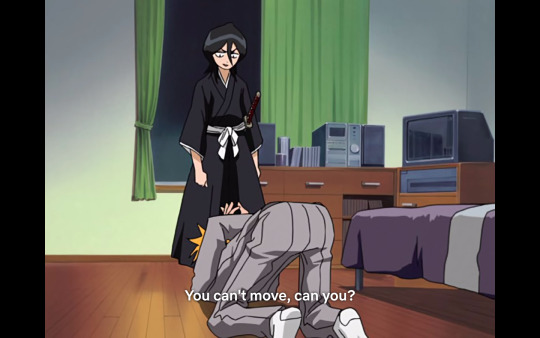

LOOK AT THE MANGA
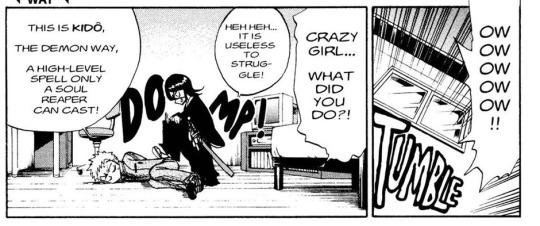

LOOK AT HER SMUGLY OWNING ICHIGO’S IGNORANT ASS #FuckYeahRukia
Also the subs may not show it if you’re watching it on Netflix, but anime Rukia says “I am not allowed to lay my hands on humans outside orders,” which like, you ARE LITERALLY DOING THAT. Manga Rukia is fine with bullying Ichigo, but she draws a line at killing him, but man Anime Rukia, you give no fucks about the laws huh.
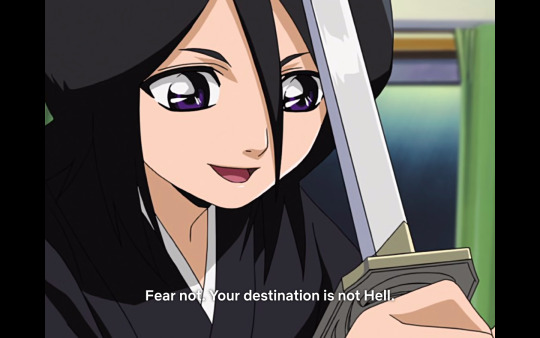
why so cheerful?
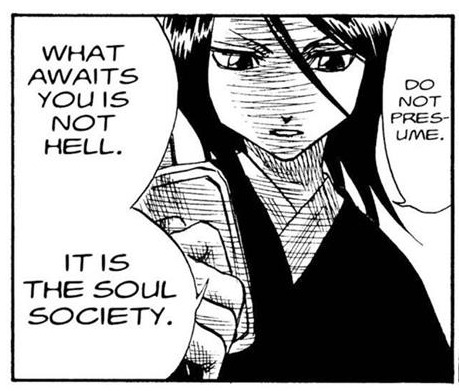

(also Rukia be right tho)
(specifcally compared to hell you could say Soul society is a resftul place lmfao)
Also anime salary man gets to rest in peace, even like, pray and shit
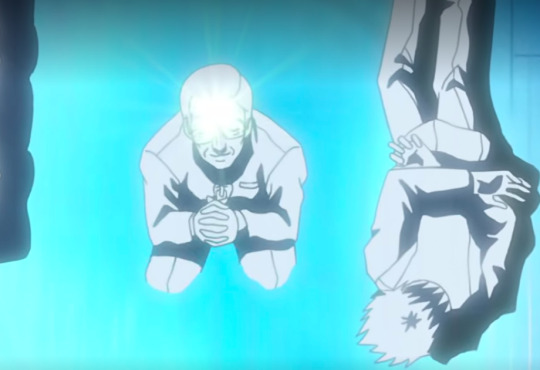
Meanwhile the manga
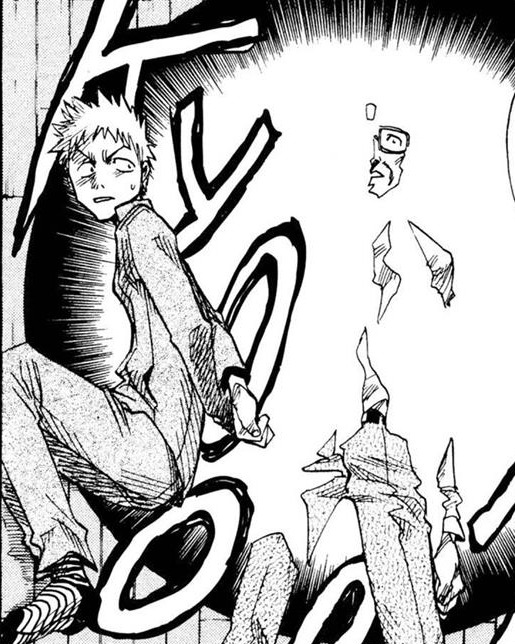
YEET TO SOUL SOCIETY
(also notice how we’ve been robbed of ichigo’s silly socks
I swear the anime knows how to suck the soul out of the manga
Get it? Soul! haha ....moving on.)


Really Rukia? One of your jobs?

GUESS YOU WERE OFF DUTY HERE!!!!!!!!!!!!!!
(I’M SORRY BUT LIKE, SEE HOW POINTLESS THIS FILLER IS UGH!!!)
(Again pet peeve but look at how ugly this screen is COMPARED TO THE MANGA)
(What have they done to you, queen)
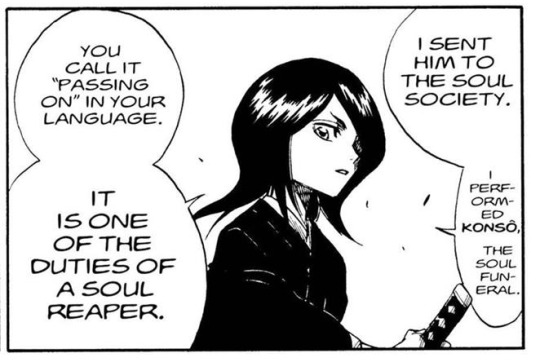
(also they never mention the name Konso ( or as Viz calls it here -”soul funeral”, thanks Viz)
Next on, not a pet peeve, but an observation:
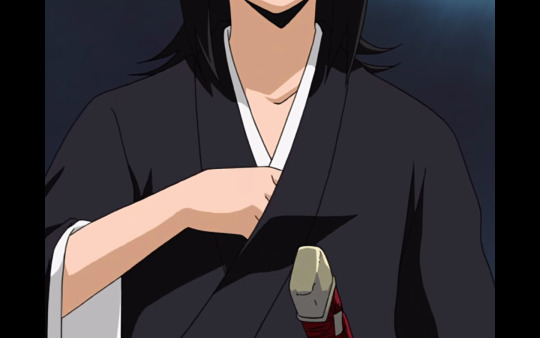
Anime Rukia keeps her sketchbook in her kimono
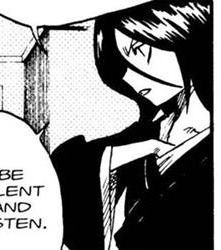
Manga Rukia keeps it at the titty
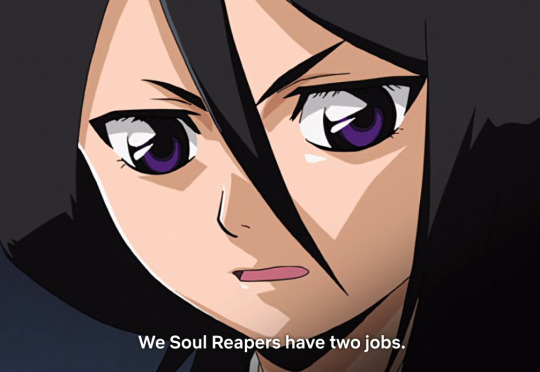
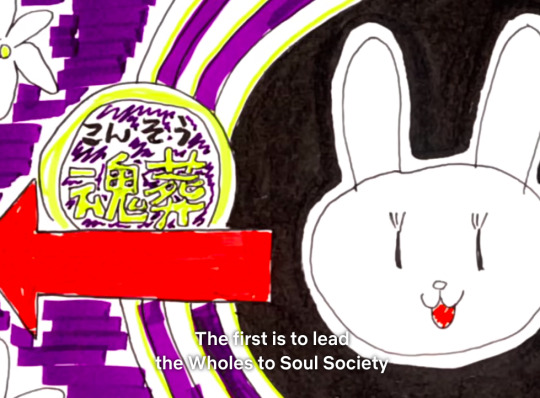
Yep, which you neglected to do the day before,

she literally says “With the konso I did just a moment ago” like she used the word before. Like you can contextually get it, but why cut that line out of the dialogue if you don’t change the next line it’s referenced in?
There’s also a dialogue change from the manga’s well, Viz uses “vaporize” which is not a bad choice given the specific wording Kubo uses, but the original says
昇華 • 滅却
sublimate/convert • extinguish
which is a clever little nod/foreshadowing to the nature of souls in bleach and that they can be “converted” in and out of a hollowfied state.
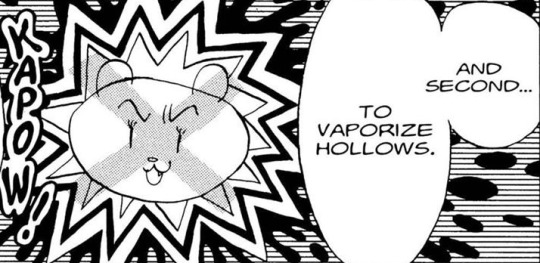
While the anime just says “to slay hollows”, and albeit it lacks the little nod the manga has to offer, I can’t see how they’d include it in the anime at that stage so I’m fine with them simplifying it to like, an exorcism.

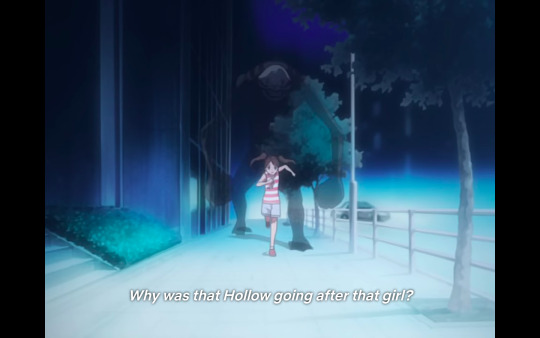
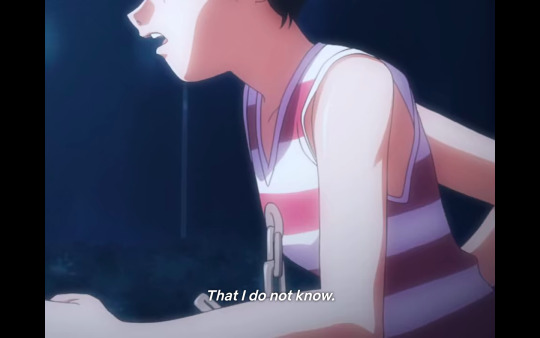
A better question then Rukia - WHY DIDN’T YOU SEND OFF HER SOUL????
also WAIT THE GIRL IS STILL ALIVE?? she’s dead-dead by this point in the manga.

BULLSHIT !!! YOU LITERALLY EXPLAIN LATER WHY!! ACTUALLY YOU EXPLAINED EARLIER WHY!!! YOU LITERALLY SAID THIS, 1 MINUTE AGO :

Anyway, Fishbone almost grants her the priviledge of escaping this God-awful anime, but is suddenly stopped?

AND CAN TALK??


wait WHY DOES FISHBONE TALK?? GHFJD isnt this supposed to be a juicy reveal for later when Ichigo realizes “hey theyre not actual complete monsters - but used to be humans!” Hm, ok.
Also leaves her alone? Damn ok...
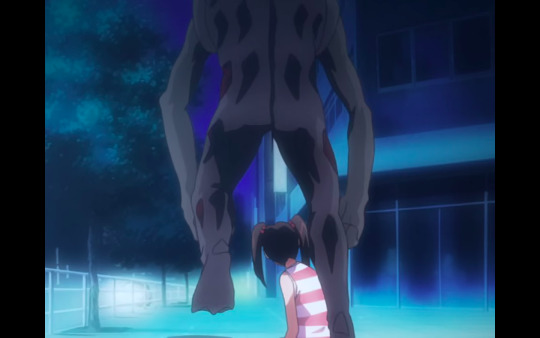
Reminder:

Moooving on...
Speaking of the manga, this little moment is missing:

Since there is no pointless filler that would make him ask about the ghost girl therefore exposing Rukia’s slacking off of her duty, Ichigo realizes that there must be a hollow nearby bc in the manga he actually has braincells to spare.
Also wiping off the Baron’s moustache moment is gone 😢
Missing and dearly missed is also this moment, which consolidates how protective Ichigo is of his family. He only needs to hear Yuzu scream to click that the hollow is nearby and his family is in danger. I feel like anime Ichigo should be even more worried since his sisters are alone but ok??
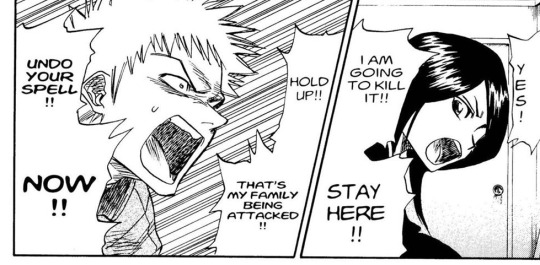
Also foreshadows their dynamic of Rukia trying to stop his reckless attempts at pushing himself to protect his family, bc yknow....she has her own Kaien trauma to process.
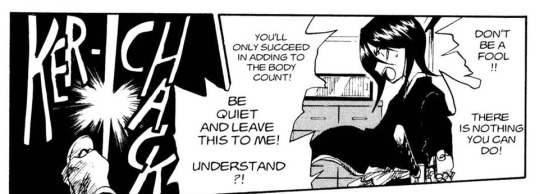
Next off....


This is .... a choice....
They were very eager to give Yuzu’s lines to Karin just a couple of moments ago but now this whole exchange:

Where we see a very pragmatic yet soft side of Karin
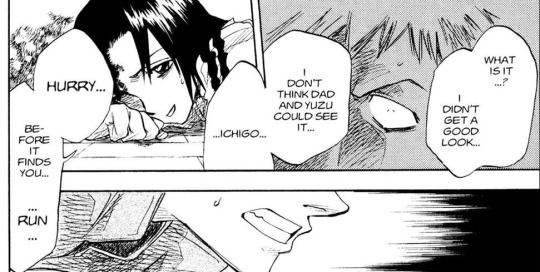
She doesn’t know what is happening, and doesn’t expect her brother to fight it - he just wants him to be safe, because she loves her family. At least warn him before it gets to him and hurts him.
is replaced with this:
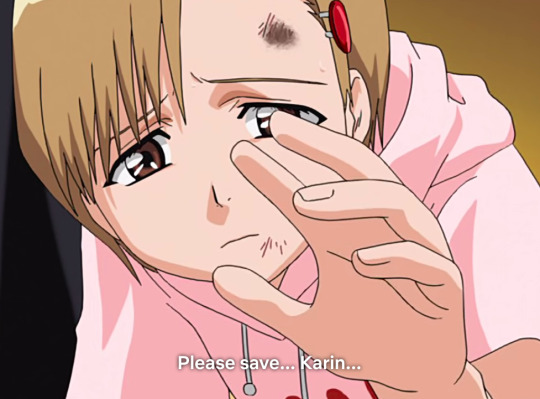
Yuzu, sweetie, what do you think he can do to achieve that.
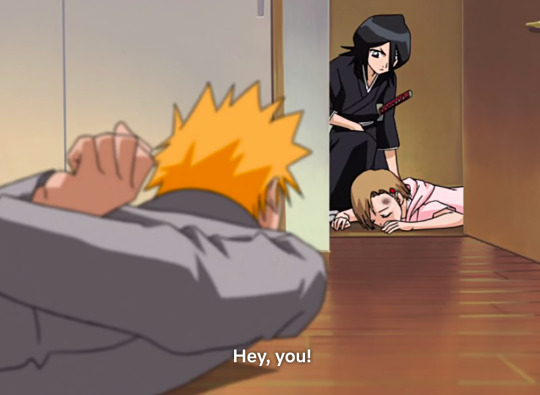
I guess at least Anime Ichigo tries to get Rukia to do her job as she looks down on Yuzu in silence.
But compare it to the manga:
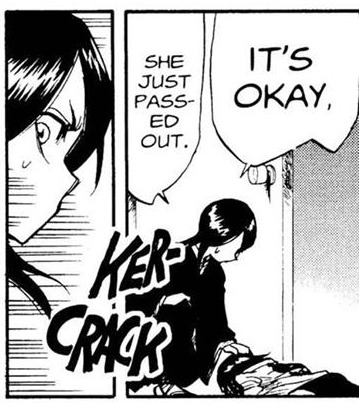
#MyRukia stops by Karin to check for a pulse and reassures Ichigo that his sister is alive.
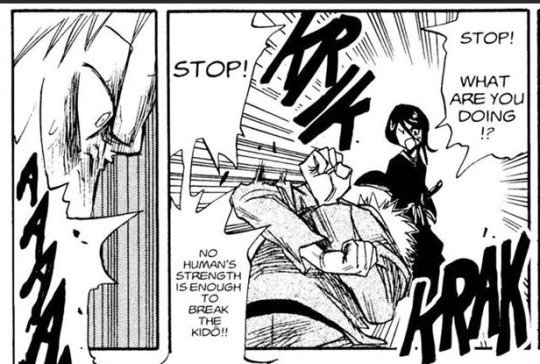
Manga Ichigo is NUMBER ONE oniichan in town and doesnt have time to call out to a stranger to save his family - HES BEYOND READY TO GO FIGHT, RECKLESS AS IT IS, EVEN THOUGH HIS OWN FAMILY BEGS HIM TO JUST RUN. because he cant let himself be unable to protect them. He cant live with himself if he doesnt try his darnest to protect them.

*elevator music playing as ichigo tries to get rukia’s attention but she fucks off downstairs, but instead of doing shit he just does the worm on the floor*
which I guess is more realistic for a teenage boy, but Ichigo is literally traumatized by being unable to protect a family member. Y’all think a ghost he’s never seen before is gonna stop him?
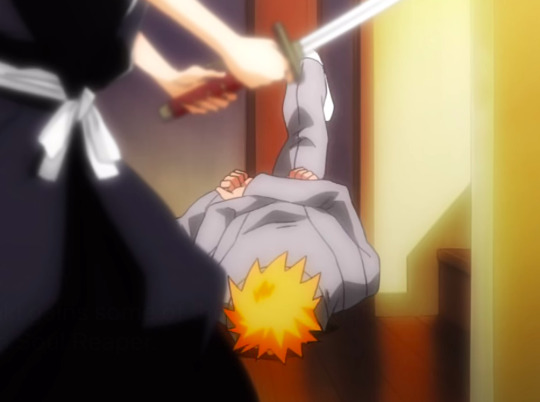
Yooo, pathetic. #NotMyIchigo
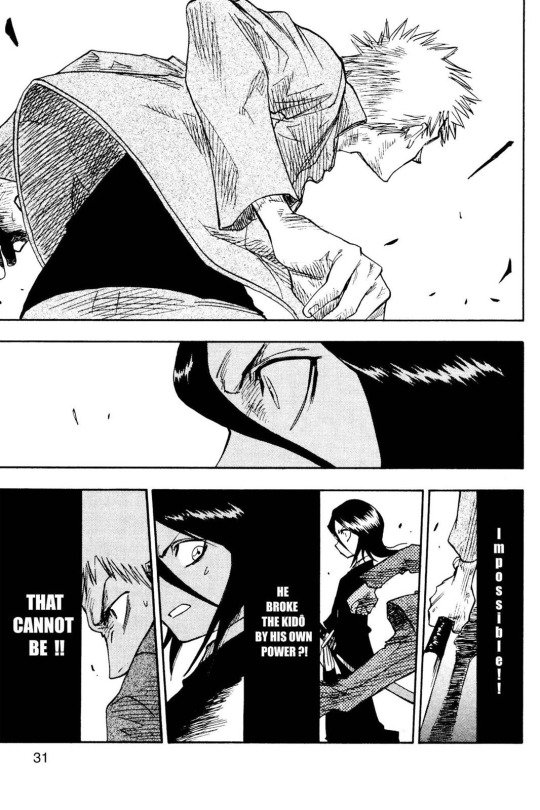
108 notes
·
View notes
Text
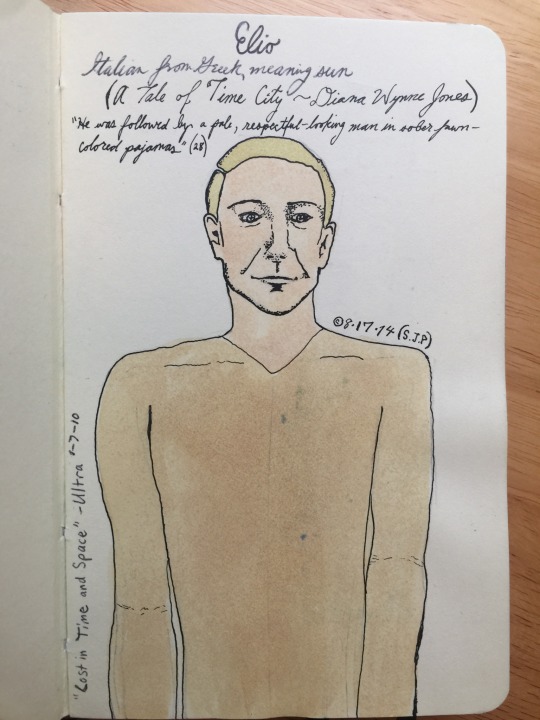
A Tale of Elio and My Fixation with Lovable Androids
TL;DR Feel free to scroll past this unless you’re keen to read my ramblings about androids, Neoclassical art, children’s lit, and bad science fiction movies.
Since the late 1990s one of my favourite books has been A Tale of Time City (1989) by Diana Wynne Jones. It’s a mildly confusing story but engaging, with memorable characters, including the android Elio, pictured above - my own fan art from a few years ago. Studio Ghibli really needs to make this film if no one does a live-action version, seeing as they brought Jones’ novel Howl’s Moving Castle to life. Here’s a scan of my favourite edition with mesmerizing cover art by Richard Bober.
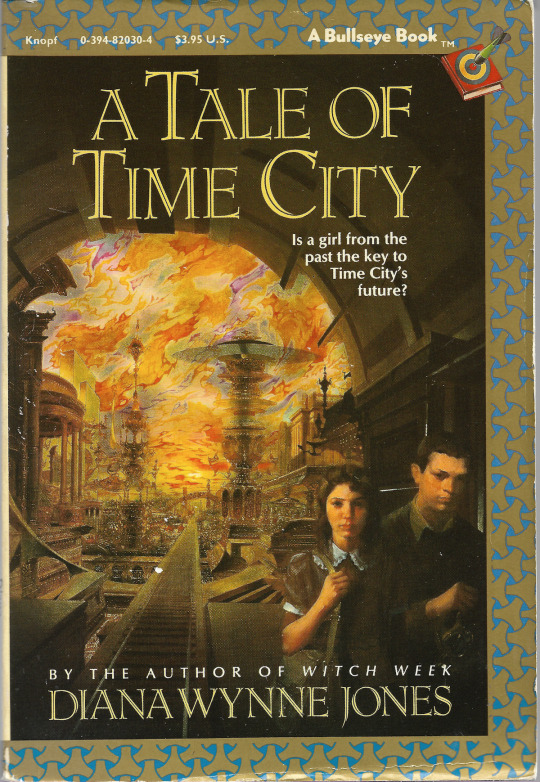
This book inspired me so much I’ve done research on it. I wasn’t in a class in grad school that allowed me to write about it so I took it on as a casual independent project in 2019. Two days after my dad died of cancer I was scheduled to present my paper on Elio from ATOTC. Needless to say I was not able to finish writing the essay. I told the department coordinator I would likely not attend but I would let him know. He was seriously surprised that I showed up. I must have looked like a ghost - wearing a nice top, skirt, tights, and short heels. I was still in total shock but I thought I might as well press on. My paper’s working tile remains as it was: Elio: Android Autonomy and the Personification of the Sun God. I presented a long bullet point list of working ideas and research done up until that point. My work is still on the broad side because it’s an intersection of young adult fiction, Neoclassic art, and android autonomy; I have some narrowing to do. Here are my main arguments thus far:
Firstly, the android character Elio’s physical characteristics and personality are inspired by Helios, the Hellenistic Greek god and personification of the sun. Apparently, Elio is a Spanish name meaning sun and also an Italian given name referring to the element helium, originally derived from the Greek name of the sun-god Helios.
Secondly, Elio and Helios share more than an etymological connection and the comparison of Elio to Helios can be articulated in two distinct ways: the aesthetic comparison, and that Elio possesses some of the qualities Helios is known for. Jones’ work repeatedly associates Elio with sunlight and golden hues, aspects which are exemplified in the 1765 Neoclassical painting Helios as the Personification of Midday by Anton Raphael Mengs. (I vaguely remember translating a couple passages from a large art book written in German when I was studying Neoclassical art.)

This work is considered an unusual depiction of Helios. Mengs uses a motif of the glowing arrow which is interpreted by François-Xavier Fabre as a symbol of the midday heat and the sun's rays which penetrate and give light to the earth. The representation of the sun in this way is considered unusual for the 18th century because it goes against Classical and Baroque iconography which portrays Helios riding a chariot. Ironically, Jones references this. Elio proclaims his fondness for films, particularly the chariot race from Ben Hur. Elio, like Mengs’ depiction of Helios, lacks a chariot but retains his beauty and powers.
As for Elio possessing some of the qualities of Helios, the god is often referred to as “all seeing” or “Zeus’s eye.” Similarly, Elio has the ability to anticipate problems and see what humans do not, but not because he’s a god, but because he’s a servant. However, this is where his self governing comes into play when he uses his observations to take action beyond any directives he has been given. His physical strength, like Helios, exceeds that of humans. Elio himself says, “my utmost is more than twice that of a born-human” (Jones, 211).
Thirdly, Elio’s self awareness allows him to use both his powers of observation and superior physical strength independent from humans. He does not always wait to be told how to use his power; he wields it. Not only does he play a part equal to that of humans in Jones’ plot, he specifically controls the fates of certain human characters. For example, he doesn’t always utilize his speed when he’s at the beck and call of his master, Sempitern. He makes choices not to fully comply with the demands made of him.
My fourth point, which I can’t quite articulate well, is that the most significant dynamic of this comparison is the body of Elio and how his physicality interacts with his autonomy. Elio acts as an individual who contributes to a wider mythology just as Helios does. Yet, while Elio is superior to humans in many ways, his quasi-humanity allows him to act in ways which align with Helios’ qualities.
For example, Elio makes personal choices and exhibits emotions not necessary for him, as an android, to function. He confesses a desire to harm another android out of annoyance where a passionate opinion would not be expected from an android. This human failing is indicative of the same autonomy which allows him to act as Helios does. Elio has been constructed as a superhuman body in terms of his abilities, however, the human qualities which contribute to his Helios-like powers undermine his intended purpose.
Ultimately, Elio ascends the usefulness of his “owned” body by acting independently from the humans who utilize him. His human qualities make him vulnerable and therefore he loses some of his godlike powers. Elio, while only an assistant to his human owners, utilizes his own physical and mental powers to maintain his autonomy. Conversely, his god-like qualities make Elio more human rather than affirming his android identity.
This is a very complex subject and I don’t really know where I’m going with it and have possibly made some suppositional errors. TL;DR: What I do know is that Elio presents a paradox: being idealized for his abilities allows him to be autonomous while being autonomous disrupts the servitude of his body.
I am in the process of determining what lens I will use to analyze Elio’s experience and functionality of being an android. I’m thinking about using Alan Turning’s 1950 work Computing Machinery and Intelligence. I’m still navigating the literary theory aspect, or indeed philosophical aspect, of this area of study.
This brings me to something I came across later that relates to Elio and ATOTC.
SPOILERS AHEAD
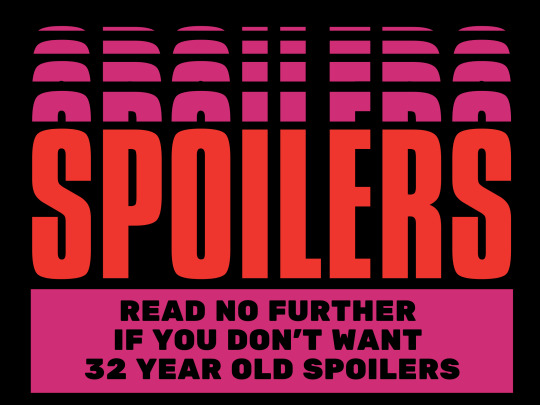
The closest depiction of an android that I’ve seen to Elio other than Data is from a terrible and somewhat forgotten science fiction film from 1989. “Byron”, (played by pre-Jurassic Park-fame Bob Peck) the android in the painfully awful film Slipstream comes very close to Elio in terms of tone, attitude, and characterization. Despite the embarrassingly bad script and dialogue, Peck does a bang-up job, seemingly acting in a wonderful film running parallel to the absolute trash his co-stars were apparently “acting” in. Yes, I rewatched this film just to write this analysis. (The secondhand embarrassment is off the charts and I had it playing at a low volume most of the time Byron was not on the screen.)
When you first see Byron he’s acting out autonomy but you’re not aware he’s an android. The audience is told he’s an escaped fugitive, a murderer, and that’s all we know for over half the film. Yet there are several clues. When you first see him he’s running over rugged terrain in a suit which was kind of a big hint but nothing makes sense in this film so I just thought that it was a weird costume choice. Then he’s literally shot with a grappling hook. He doesn’t seem to be in pain even though he’s shocked by it, and then is pulled down by a bounty hunter named Tasker (Mark Hamill) and hits the ground from a great height and doesn’t die. He just quotes what I think is John Gillespie Magee, Jr.’s "High Flight”: “I have slipped the surly bonds of Earth….and touched the face of God.” Next time you see him, he’s in handcuffs, looking super depressed, and apparently not bleeding out from the now absent grapple hook that’s gone through his forearm.
He eventually quotes Lord Byron to cryptically indicate his name which is lost on Bill Paxton’s character, Matt. “Byron” essentially means cowshed. It’s ironic because Byron the android is in many ways a receptacle of knowledge. Matt even says sarcastically, “Well aren’t you a walking storeroom of information,” and Byron responds cheerfully, “Yes.”
Byron breaks out of his handcuffs saying they’d “become rather superfluous.” You think he’s just showing off but once you know he’s an android you know he’s just honest all the time. He then heals a blind child and paraphrases Psalm 127:3. Matt says, “I didn’t know you were a healer.” Apparently Byron can perform cataract surgery in less than five minutes. Along their journey together (Bill is set on collecting the bounty on Byron’s head before Tasker can catch up) they camp out. Byron sleeps with his eyes open. (Even if he is an android wouldn’t his eyes need to be “cleaned” in the same way humans need to close our eyes and blink?) Matt wakes up to find Byron seemingly strangling him. “I was feeling your carotid pulse,” he explains. “I was just checking for arrhythmia and episodes of ventricular tachycardia.” At this point you realize he’s not so much a spiritual healer as a doctor who philosophizes a lot.
Byron’s miraculous behavior and pontificating is called into question by a nomadic spiritual community which has been torn apart by an attack on their village. As he lays dying, Ben Kingsley’s character calls Byron a “false prophet” but his faith in this stranger is somewhat restored when he says, “all that will be left of me is bits of gold in the sand. You have a soul, do not abandon it in death.”
Another character says, “The stranger is no mortal man.” Therefore it is clear that Byron likely isn’t human. We don’t find out he’s an android until 46 minutes into the film. Once that’s cleared up, other concepts arise in the script. While not well executed, they are really interesting; emotion both positive and negative, free will, perfection, A.I. slavery, and murder are all addressed throughout the second half of the film. Byron says he doesn’t understand “hate” in context of his “master” to whom he was nurse, brother, father, mentor, and friend, but he admits he was more of a slave than anything else.
The character Ariel takes an interest in him for a variety of reasons, especially romantically. In one very evocative moment we see Byron in a museum exhibit, a false garden of Eden, full of fake vegetation and taxidermies, full body mounts. So we’ve got an android having an Adam experience. Whether or not he experiences “original sin” with Ariel or if he’s “fully functional” is never acknowledged. Although one woman says, “Amanda slept with a robot?!” (who the f**k is Amanda?!) and a man says to another sitting next to him, “I hear they’re rather mechanical in the saddle.”
Byron is less concerned with consummation and more excited about love, sleep, and dreaming. When he is with Ariel he doesn’t quite know how to act in terms of sexual play and then apologizes: “I’m not accustomed to being loved.” We see him closing his eyes when he’s cuddled up with Ariel; the next day he is certainly very pleased that he fell asleep with his eyes closed and had a dream.
In terms of his servitude and autonomy they did not spend an adequate portion of the exposition on it. Matt has a change of heart and says instead of collecting the bounty, he’ll set him free as it’s briefly revealed that Byron killed his “master” upon the man’s request. Naturally, this brings up a lot of confusing feelings for Byron. “Is this what it’s like to be human? I don’t think I’m up to it,” he says. “Can I be trusted with human feelings?” And in a way he cannot. Ariel is brutally shot by Tasker.
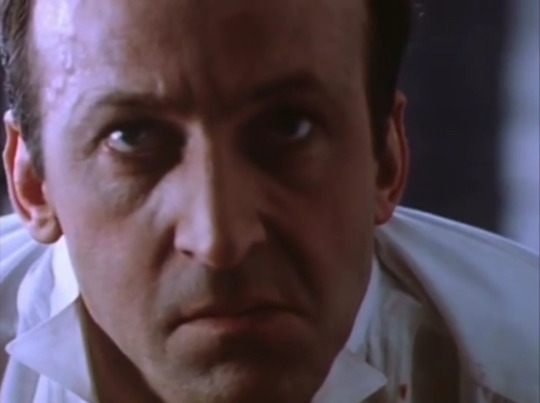
Byron is angered over Ariel’s death and follows the bounty hunter to his ship. Instead of taking him in to collect a reward, Tasker tries to run him down with the glider plane. Byron manages to get himself caught in the engine and starts to strangle his assailant. Tasker quotes “touched the face of god” which brings Byron to his senses and he stops killing Luke Skywalker Tasker and tries to save the plane. It looks like he’s going to hot-wire it but then uses the wires like reins (chariot imagery???). They crash into the side of a mountain slope. Tasker dies but Byron survives. Apparently he’s basically indestructible and somewhat godlike. “I’m too dangerous to be human,” Byron tells Matt. In the end, he goes off in search of the place he’d been dreaming about.
Although in terms of physical appearance the two androids are vastly different, they have so much in common. Here are some basic concepts.
Character: Both are stoic, formal, intelligent, honest
Indestructible: Byron is injured with a grappling hook, takes a major fall of about 20 or 30 feet without a scratch: he is somewhat godlike or slave-like, meant to withstand destruction and pain. Elio is less indestructible but easily repaired.
Healer: Byron has the skills to heal people with basic surgery. Elio doesn’t take his own injuries seriously and experiences pain for the first time (Jones, 218-9).
Both think they deserve to be punished: Elio states this quite clearly (Jones, 276) and Byron says the same thing about himself with resigned passivity.
Complex relationship with “human emotions”: Both come to terms with violence, anger, and love.
Autonomy: At the end of the film Byron goes off on his own to look for a promised land. Elio decides his own fate by deciding to accompany the children of the story, stating that Vivian is a “particular favorite” of his (278).
Dreaming and stories: Byron is searching for a place, “where I think I belong,” he says, which is a place he often thinks and dreams about. Dreaming is considered to be a human attribute, a non-essential bi-product to consciousness. Elio enjoys stories and old films (Jones, 180), similarly “human” in nature.
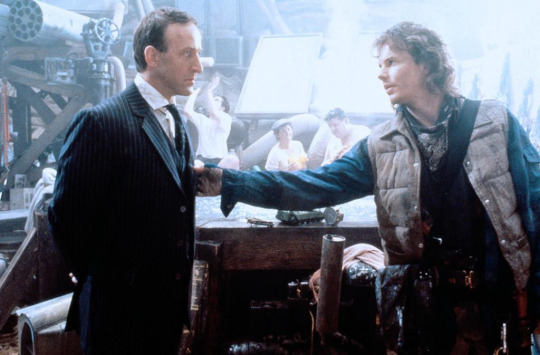
(Peck, seen here waiting for Bill Paxton to learn how to act. Sorry, I’m salty.)
Disclaimer: This is a work in progress! This project is an intersection of niche subjects that interest no one but myself.
Anyway, my point is (yes, I did have a point...or rather several) was that if anyone should adapt A Tale of Time City, Byron from Slipstream is the best example of how Elio should be portrayed in terms of characterization. I feel that Slipstream should have been centered around Byron. The film was kind of like, just about the “we’re both fighting over the bounty of this fugitive” sorta thing. It would have made more sense to focus on Byron as he is arguably the most interesting character and represents many of the conflicts within the story. I would like to combine my research on ATOTC and Slipstream one day. In any case, this is a good start.
Works Cited (WIP)
Jones, Diana W. A Tale of Time City: Knopf, 1987. Print. Perkowitz, Sidney. Digital People: From Bionic Humans to Androids. Washington, D.C: Joseph Henry Press, 2004. Print.
Roettgen, Steffi, and Anton R. Mengs. Anton Raphael Mengs: 1728-1779 Part 2. München: Hirmer, 1999. Print.
Turing, A. M. “Computing Machinery and Intelligence.” Mind, vol. 59, no. 236, 1950, pp. 433–460. JSTOR, www.jstor.org/stable/2251299. Wilson, Eric. The Melancholy Android: On the Psychology of Sacred Machines. Albany: State University of New York Press, 2006. Print
#A Tale of Time City#Diana Wynne Jones#my artwork#fan art#art#grad school adventures#Slipstream#c3po#neoclassic art#tldr#long post#personal#Richard Bober#book cover#my scans#my fan art#Bob Peck#1989#my edits#androids#writing#essay#grad school#AI
35 notes
·
View notes
Note
HI! I'm new to the MDZS fandom and I fell in love with Suibian, but you don't see it that much. I seen somewhere that it would burn out a weaker core and I cried cause I wanted to see that, and as far as I know it doesn't happen anywhere. I'm wondering if you could tell me anything and everything you know about Suibian. I'm starving for anything about it
hi anon! ahahah, it’s always a dangerous thing to ask me about “anything and everything” on a topic because I usually have too many thoughts, most of which are unorganized. but! if you’re interested in that, then here we go!
First, re: your comment about Suibian burning out a weaker core: I am not aware of this theory (or is it something from an interview?? if someone knows, please say so!), but if it brings you joy, then it’s certainly an interesting one to consider! Unfortunately, I don’t have much more to say on it because I’m unfamiliar with it, but I do have quite a lot to say on some other Suibian concepts!
ask and ye shall receive (a very jumbled heap of thoughts as i spiral further and further out of control):
[all rough translations are mine, and thus all mistakes are mine. I am using the version of the novel that is available on luoxia because I can’t be bothered to go flipping through my print edition ahaha.]
the questions about Suibian that interest me the most are why it sealed, when it sealed, when Wei Wuxian began to wield it again, and what that might all mean. I’m going to be talking about novel, CQL, and audio drama canon all together, because I think looking at each canon alone and in combination can raise a lot of very different points!! (I have not watched the donghua or read the manhua yet, so forgive me, I have nothing to say about them. /o\)
So! the one piece of information that we’re given consistently throughout all three of the canons is that Suibian was sealed after Wei Wuxian’s death and that no one but Wei Wuxian himself (and Jiang Cheng, by proxy) could draw it from its sheathe. Thus, Wei Wuxian’s identity is revealed and the golden core swap comes to light. Wei Wuxian is surprised by this, and asks Lan Wangji, “Did it really seal itself?” (novel, chapter 63; CQL, ep 42; audio drama, S2E15).
The novel and audio drama both include a line from Wei Wuxian that emphasizes Wei Wuxian’s surprise, implying that sword-sealing is very uncommon:
万中无一的大好事竟然让我给撞上了
Something incredible that happens less than once per ten thousand times, and I actually encountered it.
the irony, of course, is that this incredible thing is what ended up blowing his cover. rip Wei Wuxian.
but what I think gets really interesting is comparing different points at which Suibian sealed itself and what that might imply in conjunction with other information. Jin Guangyao says “shortly after” his death, but CQL includes a scene in episode 19 that implies that Suibian actually sealed itself much earlier.
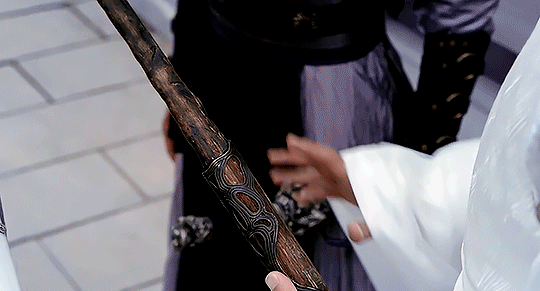
[ID: Gif from episode 19 of the untamed drama. Lan Wangji attempts to draw Suibian after he and Jiang Cheng storm the Nightless City and retrieve their swords. He cannot pull it from the sheathe. /end ID]
(in case anyone is curious, it’s about 30 minutes in. I spent the effort to make the gif, so I might as well give you the timestamp lol)
this scene takes place during the period of time when Wei Wuxian is in the Mass Graves (aka the Burial Mounds) after Wen Chao cast him down and left him for dead, right near the beginning of Sunshot. I’m fairly certain it’s not mentioned in either the novel or the audio drama, so this is a CQL-only detail. (please correct me if I’m wrong; I get my canons muddled all the time //hides face)
CQL basically does nothing narratively with this scene other than giving us some sad shots of Lan Wangji and Jiang Cheng (honestly, valid ;A;) but!! if we decide to accept this scene as our jumping off point, we can get to some interpretations about Wei Wuxian using information from the other canons!
take this exchange from chapter 57 of the novel (immediately prior to the massacre at lotus cove):
江澄道:“还不是又为咱们的剑的事去温家了。一想到我的三毒现在说不定被哪只温狗握在手里,真是……”
他面露嫌恶之色,魏无羡道:“可惜咱们的剑还不够灵,要是能自动封剑,那就谁也别想用了。”
江澄道:“你再修炼个八十年,说不定可以。”
Jiang Cheng said, “He’s gone to the Wen sect regarding our swords again, hasn’t he. Whenever I think that my Sandu might even now be in some Wen-dog’s hands, ugh…”
His face filled with loathing, Wei Wuxian said, “What a pity our swords don’t have enough spirit. If they could seal themselves, then no one could even think about using them.”
Jiang Cheng said, “If you kept cultivating for another eighty years, maybe.”
from the novel, it seems clear that sword-sealing is something that only happens when a person’s cultivation level is exceptionally high. if this is true, and we go with the CQL timeline of Suibian sealing itself long before Wei Wuxian’s death, it means that Wei Wuxian’s cultivation level wasn’t just high, it was leagues above pretty much anyone else when he was still a teenager. (In fact, Suibian had most likely already sealed by the time this conversation takes place.)
If we don’t go with CQL’s timeline, however, I think we could make a very different argument. It’s a bit of a reach, but I think it’s a lot of fun, if you’re willing to come with me on this journey!
Jin Guangyao says Suibian sealed itself “shortly after” Wei Wuxian’s death, but we don’t really have external confirmation of that. For all we know, someone only bothered to test it sometime after his death, and Suibian had been sealed for some indefinite amount of time. All we can say for sure is that by some point shortly after Wei Wuxian’s death, Suibian was already sealed and resisted being drawn by anyone who tried it.
We’re told over and over that one can only wield a spiritual sword effectively if you have a golden core/the spiritual energy to match it. Wei Wuxian stops carrying/using Suibian because he knows that in his hands, it will act as nothing more than an ordinary sword. His method of cultivation is no longer suitable for the sword. Suibian is tied to both Wei Wuxian’s soul and his golden core.
If sword-sealing only happens when the cultivator’s level is unbelievably high, then I think we can make the argument here that by the time of his death, Wei Wuxian’s core was likewise unbelievably strong – but Wei Wuxian is no longer the one developing his core. Jiang Cheng is.
I know it’s a ridiculous reach. To be clear, I don’t think the text actually intends this or supports this in any meaningful way, but I do think that it gives us some very tasty potential!! If Suibian sealed itself sometime after the core transfer (which, honestly, we wouldn’t know – after all, who’s been trying to draw Wei Wuxian’s sword?), but just if, I think we can plausibly make the argument that Jiang Cheng’s cultivation is truly extraordinary.
:DDDDDDDD
It’s fun right?? It’s a fun concept!!! Even if it’s nonsense, even if it’s not that deep, even if this was an unintentional coincidence, I think it would be interesting to look at this as being some kind of measure of Jiang Cheng’s accomplishments. On the flip side, I also think it’s very important thematically that Jiang Cheng’s value as a person has nothing to do with his cultivation, that he is, in fact, always second-best, but that doesn’t make him any less worthwhile or deserving of love. Maybe I’m just projecting lmao. Of course, being extraordinary doesn’t preclude him from still lagging behind Wei Wuxian–Wei Wuxian might have just been more extraordinary ahahah. We can have both!!
Now for a totally different thing! Interestingly, this conversation about cultivation levels and sword-sealing (the one with Jiang Cheng) also happens in the audio drama, S2E12 (about 15 minutes in, since I just checked), but Wei Wuxian adds an additional comment:
(don’t have the transcription of the original chinese, I’m just going to translate it as I hear it)
“But maybe you don’t need to cultivate to a certain level to have your sword seal itself. What if there were some other way?”
these two versions of the conversation actually imply pretty different things, I think! this addition opens the possibility to the audience that sword-sealing is possible even without an extraordinary level of cultivation, and I think lends credence to the idea that Suibian is just an unusually loyal sword, regardless of Wei Wuxian’s cultivation level. Whether that’s something inherent to Suibian’s “personality”, or whether this says something about how Wei Wuxian inspires loyalty wherever he goes, or whether it just speaks to the strength of their bond remains to be seen.
(obviously, this could imply any number of other things as well, but I find this to be the interpretation that makes me happiest.)
If we go with “Suibian seals itself after Wei Wuxian’s death” in this canon, I think this emphasizes the loyalty aspect with a touch of grief.
If we combine this with CQL and have “Suibian has been loyal since he was a teenager”, that also emphasizes the loyalty aspect – just in a different way.
Of course, doing meta combining unique details from different canons is largely pointless in terms of crafting any real “analysis”, so I’m mostly saying all of this because I enjoy the process of building the supercanon in my head that brings me the most joy! To summarize the varied interpretations I’ve brought up in this post:
CQL-only: Suibian sealed itself when Wei Wuxian was a teenager, at latest, by the time he was thrown into the Mass Graves.
Novel-only: Sword-sealing is very rare and achievable only through extraordinarily high cultivation. Shortly after Wei Wuxian’s death, Suibian is discovered to have sealed itself, so Wei Wuxian’s core, by the time of his death, was extraordinarily powerful.
Audio drama-only: Sword-sealing is considered very rare and achievable only through extraordinarily high cultivation, but might also be accomplished by other methods. Shortly after Wei Wuxian’s death, Suibian is discovered to have sealed itself. If Wei Wuxian’s core is not wildly and improbably powerful, this implies that Suibian has become an exceptionally loyal sword by the time of his death.
CQL/novel: Wei Wuxian was already incredibly powerful by the time he was a teenager.
CQL/audio drama: Suibian has been exceptionally loyal to Wei Wuxian since at least his teenage years.
Novel and audio drama-only have a much wider range of when Suibian could have sealed itself, as mentioned, so there are further variances within those interpretations.
there’s a lot of potential here!! with my personal feelings regarding the story, I like novel-only with Suibian sealing post-core transfer, audio drama-only with Suibian sealing post-Wei Wuxian’s death, or CQL/audio drama with Suibian sealing as a teenager pretty much all equally. I think the CQL/novel interpretation gets too close to casting Wei Wuxian as a hyper-special and innately noble individual in a way that undercuts the strength of his character arc, but that’s my opinion. (As an aside, this is actually one of my major complaints about CQL in general, independent from what I’m talking about here. But that is a topic for another day ahahaha. To be clear, I still love CQL very much, despite my many frustrations!)
As for what I think is the most “likely” to be the “right” interpretation (whatever that’s worth), I would probably say the one that emphasizes Suibian’s loyalty with Suibian sealing post-death, because I think it’s the most thematically cohesive and has the textual support to back it. (I think it’s a valid interpretation even using novel-only text; it’s just slightly less explicit without the additional comment from Wei Wuxian.)
A final detail:
We don’t get anything from either CQL or the novel that explicitly addresses when/if Wei Wuxian is able to wield Suibian again, but the audio drama’s rendition of the “Yunmeng” extra very subtly indicates that by the time that extra takes place, Wei Wuxian has cultivated a golden core and is carrying his sword once more. You only get it at a couple of moments, but Suibian sometimes clinks when Wei Wuxian moves or when he bumps into something. The two instances I can remember specifically are when Lan Wangji tosses the ring onto him (the ring hits Suibian), and when he’s rowing the little boat onto the lotus pond and the motion makes a sound. It’s!!! Extremely good!!! It makes my heart very full!!!!!
ANYWAYS, if all of my scattered rambling didn’t fill the Suibian-shaped hole in your heart, I would also like to recommend @zeldacw‘s wonderful WangQingSuiChen series of comics, featuring anthropomorphized versions of Wangji guqin, Chenqing, Suibian, and Bichen. I believe the most recent comic is here, and there are links to the rest of the comics in the post. If you just want her general tag for the AU (which is more than just the comics), it’s here!
If you have interest in listening to the audio drama yourself, you can purchase it through the MissEvan app (Mao’er FM). There are buying instructions linked in this post! If you need English subtitles, @suibiansubs is the group that does them. :)
I really can’t recommend the audio drama enough, tbh, it’s really really dear to my heart, and the team clearly worked so hard and cared so deeply for the story they were trying to tell. Consider this my regularly scheduled plug for the audio drama ahaha.
As always, my meta is my meta and if you don’t vibe with it, that’s chill! I change my opinions constantly (I think I changed them like three times in the course of writing this ahahaha), and I know some of my older meta has been making the rounds and every time I see it I think about all the ways my views have shifted since I wrote it rip. For this post moreso than usual, I want to emphasize that pretty much all of the meta included in this is meant to explore intriguing what-if possibilities, not for serious literary analysis purposes. I am aware that a lot of this is reaching/overinterpreting into implications that probably aren’t there. I just think they’re fun to consider!
so this was a mess, but I hope you or someone out there enjoyed it anon!!
(ko-fi, if you’re so moved)
#mdzs#the untamed#the untamed meta#mdzs meta#suibian#mo dao zu shi#mine#mymeta#asks and replies#Anonymous#oh dear GOD i did it again#past me: why this will be easy! I already know what i'll talk about! probably this will take an hour#present me: *stares into the camera like i'm on the office*#this post is a MESS#running my mouth at 100mph with zero coherent structure? more likely than you think#cyan gets too deep in the weeds#:/#meta#lmao idk if that matters#a window into my 24/7 stream of consciousness#filtered by tag: suibian#cries in a corner#im so tired whatever im punting this into the void#the structure in this is nonexistent and the language is weak please forgive me
944 notes
·
View notes
Note
Hello, I saw a repost of one of your recent post and it's the first thing I've ever seen about you culture? Religion? Forgive me if I use the wrong term. I actually wanted to know if you'd be willing to explain more about it? Asking as someone trying to distance themselves from a far right wing childhood and become more open to the world around me.
TOPIC: The Basic Elements of Heathenry
This is a great question and I’ll do my best to give you a comprehensive answer!
I follow a folkloric (i.e. people-governed) spirituality/religion known as Heathenry. Before Scandinavia converted to Christianity, the Norse, Germanic, and Slavic people all had their own customs, worldviews, and beliefs. While these died out or adapted with Christian colonization, people are revitalizing these things in the form of a modern pagan religion called Heathenry or Heathenism. Practitioners may call themselves “Heathens,” which in this case doesn’t mean the same thing as “heretic.”
My particular Heathen practice is a Norse variety I describe as American Forn Sidr (the word “forn sidr” means “Old Customs”). My practice involves the following:
The Norse Pantheon and Cosmology
The Norse Pantheon is polytheistic, meaning it has more than one god. Thanks to Marvel, people are pretty familiar with figures of the Norse pantheon: Thor, Odin, and Loki to name a few. But these gods are not much like their pop culture iterations.
The stories of “Norse Mythology” are actually a sampling of Norse cultural stories, which are still mostly passed down through oral tradition in Scandinavia. These stories are metaphorical in nature and describe the natural phenomena of the world, complete with ideas about the world’s creation, how it works, and the afterlife. Unlike a codified religion like Christianity, these stories have regional variances and therefore no overarching “canon.” They’re also not viewed as literal or fundamental.
A lot of Norse pagans work directly with the gods with no need for a mediator. Which gods someone works with and in what capacity is entirely up to them. Deity relationships typically aren’t that of Lord/Servant like they are with Christianity, but instead take on may forms in the same way human relationships can. There’s also no obligation to work with them closely if that’s something a Norse pagan isn’t particularly interested in.
Animism
Norse Heathenry is animistic. Animism is the idea that everything in the world has a spiritual essence, and therefore agency. This precludes the belief that everything’s place in this world is inherent simply because it exists. This is very different from Christianity, where you need to earn your place in the world.
Norse paganism acknowledges different spiritual beings connected to the world, including wights (an object’s essence), landvaetter (the “land spirit” or a land’s essence), and other beings like trolls, nisse (house spirits), Alvar (elves), and Jotun (which is crudely translated into “giant” and describes beings of wild, untameable places or concepts). Because I’m more omnist in practice, I believe there are more spirits outside the Norse ones, but if these spirits are tied to certain cultures it may not be appropriate for me to work with them, so I take care with that.
Ancestor Veneration
What it says on the tin. Norse pagans may acknowledge and pray to their ancestors for guidance and wisdom. Some build altars for them and there are even holidays for the ancestors. Ancestors may be your blood relatives, but not always. I personally don’t do a lot with ancestor veneration, currently.
Other Norse Concepts
Wyrd and Oorlag - Wyrd and Oorlag relate to the interconnectivity of all things and destiny. I’m still working on learning these concepts myself, so while I know what they denote, I don’t know enough about them to put them into words clearly.
The Polytheistic Soul - The Norse believed multiple parts of the soul made up a person. Some of these parts move on after death while others continue down the family line.
The Gifting Cycle - The gifting cycle is a form of right relations; we can acknowledge a person’s inherent worth and well-being in the form of exchanges that fortify them. This doesn’t always take the form of a literal gift or favor, but has a sort of “you scratch my back and I’ll scratch yours” quality to it. It’s not supposed to trap you in a sense of obligation, as that would defeat the point.
Holidays
Holidays are very regional and therefore there’s no universal Norse pagan holiday calendar. Most share acknowledgement of the Solstices and Equinoxes though. American Forn Sidr holidays line up and draw from culturally American holidays, so those are easiest for me to practice.
What We Don’t Have
Norse paganism doesn’t have a dualistic worldview (good vs. evil, us vs. them, objectively good forces vs. objectively evil forces, etc). If something’s bad for human beings that has to do with compatibility.
We don’t have rules for getting a good afterlife. Valhalla was an option for Norsepeople who couldn’t be laid to rest with their families. It’s taken on different connotations in modern Heathenry, but it’s not something all Norse pagans desire. I personally believe in reincarnation.
We don’t have holy books, scriptures, dogmas, doctrines, or rules about how we dress or how we must conduct our lives. But sometimes Heathens will create these things for themselves if they’re still stuck on a lot of Protestant hangups.
...Anyway I think that covers most of the very basics. It’s a huge topic to try to contain in one go, so I hope this gives you an idea!
243 notes
·
View notes
Note
hey i'm one of those aforementioned "only-heard-blake-shelton" people - do you have any recs for better country music? i like finding new music but country is hard cause i don't really know where to start
I think the best way to explore any genre is to abandon the feeling that you’re obligated to develop an academic-level base of knowledge in the different foundations and aspects of it. If that’s something that actually interests you then by all means go for it, but despite how pretentious and rude people can get about music, it is at its heart just a form of expression - and while knowing which specific sounds might have influenced others can enhance the listening experience for some people, it’s not like there’s a prerequisite course load you need to take before you can start telling people you like country music at parties.
Anyway, that point aside, here’s some basics: country itself is a really broad concept, and was initially defined more by its ideology and source than any specific structural musical qualities that it tended toward (although its creation was most heavily influenced by Irish, Mexican, and African musical traditions). The common use of instruments like guitars, banjos, and fiddles is more to do with the ease of accessibility and portability for poorer Americans of the late 1800s, who - especially in the West - tended to be at least somewhat nomadic. Thematically speaking, it was most often centered around the experiences of blue-collar workers, including but not limited to cowboys. Subsequently, it has suffered under the combined efforts of corporations and politicians to market a parody of rural America’s own culture right back at them, and that’s why - especially if you’re only in your 20’s or younger - it’s very possible your knowledge of it is defined by commercialized Bro Country (which in my opinion is almost always antithetical to the actual spirit of country music itself, and also from a musical perspective tends to be uninteresting bullshit).
As far as subgenres go, the ideas quickly become so vague that it’s really up to the listener to decide how they want to categorize their music. Region and era can influence sound quite a bit, so that’s one way. Subject matter is another. Actual musical structure is a further one. I’m not going to bother and try to give you a comprehensive idea of all the options, because that’s impossible to do in anything shorter than an essay. Instead I’ll just fill you in on some of my favorites, and some song suggestions to go with them:
Country Music You’ve Been Listening to This Whole Time Without Knowing It: this is an easy one to start with. Lots of folk music is also country music, whether you were aware of it or not. James Taylor, John Prine, John Denver, Bob Dylan…. You’ve been here this whole time.
Outlaw Country: Tends to be either dark or mournful, but regardless it’s dramatic and fun. Usually framed around some fictional crime the singer has committed, which they have either been sentenced for or are on the run from. Good examples are Kate McCannon by Colter Wall, Mama Tried by Merle Haggard, Late July by Shakey Graves, Gallows Pole by Willie Watson, and Hell’s Canyon by Lost Dog Street Band
Spirituals: I’m definitely not going to tell you how to feel about religion itself - but given that music has been such a deeply rooted part of spiritual expression for as long as we’ve recorded history, and has very often evolved in tandem with or in response to religious movements, I think you’re really cutting yourself off from some good tunes if you try to ignore it entirely. Johnny Cash’s later stuff, especially, has the same dark overtones of his earlier Outlaw music but with the addition of gospel stylings and a religious severity that comes together in a way that’s honestly just straight up sexy to listen to. Ain’t No Grave and Redemption Day are probably the best two examples of this. On the other side, there’s the simplistic and heartfelt kind of spiritual country found in stuff like Hank Williams’ I Saw the Light, or I’ll Fly Away as performed by Gillian Welch, which I find really moving.
Honky Tonk: On the subject of Hank Williams, honky tonk is really fun music, and I deeply resent the fact that it’s been incorporated into the classist caricature of rural stupidity. At its heart, honky tonk was just designed to be a good time, and the vocal techniques it employs are actually really difficult to master, so it deserves a lot more respect. Hank Williams, in particular, also tends to use it to get right at the heart of subjects I really enjoy (although don’t confuse him with his son Hank Williams Jr, who writes Bro Country and unfortunately seems to be a terrible person). Anyway, Mind Your Own Business is one of his (and one of my favorite personal anthems), and Wealth Won’t Save Your Soul is a powerful one too. Regarding more modern honky tonk, my favorite up-and-coming musician is named Nick Shoulders, and I’d recommend his songs Rather Low and Snakes and Waterfalls.
Nice Comfortable Country Music Sung By Ladies: this is definitely a genre specific to just me, but it’s a type of music I grew up listening to a lot as a kid and I really love it. Like the title says, it’s just country songs by various very talented women who make you feel like you’re warm and at home. I Have a Need for Solitude by the great Mary Chapin Carpenter, Across the Great Divide by Nanci Griffith, Traveling Alone by Tift Merritt, Angel from Montgomery by Bonnie Raitt, Hammer and a Nail by The Indigo Girls
Poor Boy Blues: again, not a definitive stylistic subgenre so much as it is an opportunity to show off a few different songs of a few different styles that all follow a common and relatable theme, specifically one that is important to the overall genre itself. Dead End Street by Blake Mills, Crop Comes In by Chatham County Line, Thirteen Silver Dollars by Colter Wall, My Rifle My Pony and Me by Dean Martin, Cowpoke by Dave Stamey, Automobile by KALEO
Love And Heartbreak: have you really lived if you haven’t rocked out to Cowboy Take Me Away by the Dixie Chicks? No, you haven’t. You’ll also be happy to hear that I recall a poll that listed Cowboy Take Me Away as being the number one song every cowboy will sing along to on full blast whenever he’s alone. Anyway, there’s also Buddy by Willie Nelson, Crossing Muddy Waters by John Hiatt, Morning by Jim Ed Brown, Every Time I Hear That Song by Brandi Carlile, Gentle on My Mind by Glen Campbell, Kathleen by Townes Van Zandt.
Experimental: if you’d like to get a little weird with it, I’d recommend The Gold is Deep by The Dead Tongues (which uses some really ambient reverb and a small church organ for a more psychedelic sound), or Familiarity by The Punch Brothers (which compositionally borrows a lot from modern classical chamber music with its rhythmic systems and pacing).
There’s lots more we could get into here, like bluegrass, slow dancing music, spaghetti western soundtracks, and the fact that not all country pop-rock is bad, but I’ll stop myself here…. If you’re looking for a more general source for a lot of country all at once, here’s my favorite of my country playlists. Hope that was helpful!
222 notes
·
View notes
Photo
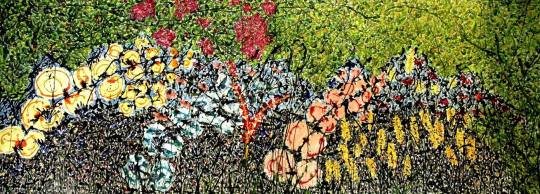
WALL OF EXOTIC FLOWERS, Baljit Chadha
FLOWERMAN CREATED A WORLD RECORD http://baljitchadha.blogspot.in The exhibition with the most paintings of flowers in the world This certificate is given by WORLD RECORD ASSOCIATION / LIMCA BOOK OF RECORDS-INDIA -2014 Baljit-chadha.artistwebsites.com http://www.youtube.com/edit?ns=1&videoid=fCTt1B51fJA http://www.1wra.org/index.php/Worldrecord/detail/id/1241 MY NEW SERIES ZEN MOKSHA FLOWERS/ MANN FLOWERS/MIYOKO FLOWERS /BALJIT’S IKEBANA A PURE HEAVENLY GIFT FOR YOU FRIENDS N RELATIVES • THESE ZEN-MOKSH FLOWERS ARE CREATED WITH A SENSE OF GIVING INNER PEACE,TRANQUILITY, HAPPINESS, SOLACE AND A SENSE OF FULFILMENT, ONENESS WITH THE SUPREME. • I HAVE TRIED TO BRING THEASE ELEMENTS IN MY PAINTINGS,THE FLOWERS YOU SEE DON’T EXISTS, THE MOVMENTS OF MY HANDS,FLOW OF COLORS ARE THE GIFT OF ALMIGHTY GOD. • ZEN-JAPANEASE ZEN IS A SPIRTUAL INSPIRATION; THEY ARE PURE EXPRESSION OF ARTIST’S SPIRITUAL AWARENESS. JAPANEASE ZEN ART HAS ALWAYS BEEN MEANT TO TOUCH PEOPLE FAR AND WIDE. ZEN PAINTINGS ARE OF GREAT POWER, PURE, AND TOUCHING DEEP IN THE HEART, MIND AND SOUL. • MOKSHA- Freedom from life circle. Moksha is attained by dis identification with the body and mind, which are temporary and subject to change, and realization of our true identity Moksh is positive concept in two important ways. First it stands for the realization of the ultimate Reality, a real enlightenment. The mukta is not just free from this or that, It is the master of sense and self, fearless and devoid of rancor, upright yet humble, treating all creatures as if they were he himself, wanting nothing, clinging to nothing. In Sikhism one rises from the life of do’s and don'ts to that of perfection — a state of "at-one-ment" with the All-self. Secondly, the mukta is not just a friend for all, he even strives for their freedom as well. He no longer lives for himself, he lives for others. • APPRICIATIONS • Very interesting work Baljit, the spontaneity, the original technique and the spiritual journey! • i hear music from your flower paintings. What a happy movement! • Baljit! I appreciate that! You have a grand body of work here that shows me some Van Gogh, Miro and Monet and countless others within your style and creativeness. A magnificent talent to behold and appreciate! Keep it up! • I like the original exposition of your beautiful artwork. • Beautiful, cheerful, great colors! • Very fine expressive all Your floral art, not usual • Simply beautiful .It is with great pride and pleasure that I am FEATURING your artwork this week on our special edition of our TOP FEATURES on the Wisconsin Flowers and Scenery Homepage. Your work shows expertise and love in the presentation of this fine art piece. Thanks much for sharing your works with us and being a member of our family of friends and fine artists in our WFS group. Aboard. Liked, Forever .This series is enchanting Baljit, all wonderful visions. Masterful use of your colors creating serene energy. .Baljit, I love these stalks of beauty is a true honor and privilege to FEATURE this creative and wondrous piece of art work on the WFS site, from one of our honored and prestigious members. This awesome piece of beauty is what we are looking for to promote and let others see, including other artists and potential customers, as your works are some of the Best of the Best in my Book! Thanks much for sharing this beauty with us. Liked Forever, Elvisty and love the colors of the floral stems. • • PROFILE • Baljit Singh Chadha • • I grew up as a curious, investigative child helped by my parents’ encouragement to explore and to learn without fear and hesitation. The wonder and awe in God’s creation always held me spell bound. I ploughed my curiosity through love of creation and creativity. At a young age of nineteen years I sailed to a land called Japan that has for long centuries been spiritually bound with India. Like a sleepy rose the petals of my creativity opened as I drank like a honey-bee the nectar of ancient and highly evolved culture of Japan. Japanese art of painting is high meditation in feel and in expression. My Japanese godmother Ms Otha Miyoko a great Japanese artist was my first teacher. She affected my style and expression early on. My journey in art continued and I evolved a style of art that has minimal gap in feeling and expression. Rapidity and quickness of expression in my art comes from the well of inner spirituality. My art is not planned, thought-out and cerebral it is based on spontaneity. Abstract Expressionism is a wider term and my art follows it in variegated dimensions. In my art I experiment with different painting instruments and techniques. My dependence on brushwork is rather limited. I frequently and freely use spatulas, wooden sticks, masking, and sand-mix, push bottles and what comes handy in the moment. I use acrylic with mix media. I have developed acrylic based glazes that were possible earlier only with oil paints. The glazes impart a charm similar to enamel glazes. I created a new technique called ( FLOAT ON COLORS). My art journey finds depth and width in continuous experimentation, forays into the unknown and choosing challenging metaphors of expression. I did an installation (Wall of Divine flowers) with 12000 painting on 12-12-12-12hrs-12mnts-12sec at Zorba in New Delhi and donated entire collection to Smile Foundation New Delhi, for a girl child education. Where my art journey will take me next I leave to higher forces. Presently I offer you ZEN MOKSHA FLOWERS /MANN FLOWERS/MIYOKO FLOWERS AND WALL OF HEAVENLY FLOWERS as my next creations. Group Shows;- Newyork, Singapore, • Canvas Art Gallery , Nehru Place, Delhi 2006 • Studio Vasant, Vasant Vihar New Delhi, 2006, 2007 • Prabhat NGO, New Delhi, 2007 • Nithari, Canvas Art Gallery, 2007 • Sahaj Sankalp, Habitat Centre, New Delhi , 2008 • Aspiration, Charity show at Epicenter Gurgaon, 2008 • New Finds, Singapore, 2008 • Group Show at World Fine Art Gallery, New York, 2008 • Reverberation Habitat Centre, New Delhi, 2008 • Art for Prabhat Presents 'The Eternal Circle' MAY-2009 • Art Ponixs Mumbai-2013 Solo Show • Studio Vasant, New Delhi, 2006,2007 • Studio Vasant, New Delhi 2008 • DLF Mall, Saket, New Delhi 2009 • STUDIOVASANT,NEWDELHI • STUDIOVASANT,NEWDELHI-2011 • STUDIOVASANT,NEWDELHI-2012 • WALL OF DEVINE FLOWERS-ZORBA,NEWDELHI 2012(world record) • WALL OF EXOTIC FLOWERS-EPI CENTRE GURGAON-2013 • HOME& interior expo, EPI centor.GURGAON-2013 • Independence day Celebration-EPI CENTRE-2013 • Art-Phonix-NEHRU CENTRE MUMBAI-2014 Artist friend Baljit S. Chadha has a lasting honeymoon with flowers in his artistic expression. He paints sometimes with frugality of a Zen master. I can understand that as he had his early training in painting in Japan where he lived and studied as a teenager and had the benefit of the tutelage of great Japanese masters. But his present series on flowers nonplussed me with wonder and joy. He has in the present works a new dimension and a new personality of flowers that I have not seen before. This is because he has distilled the expression from his inner joy and happiness that is the essence of flowers per se and not from their forms. His flowers have a nearly expressionistic, abstract persona. He uses a watercolour like free flow of colour and tonalities to invest his work with a sensual poetry. His works are acrylic on paper and therefore amenable to idiosyncratic overflows that lends a fresh charm to his oeuvre. Another landmark quality of Baljit’s new works is that they are rendered in fiery shiny glazes. As we know glazes are traditionally done in oil paint medium. But Baljit has worked them with acrylic colour and without the use of pure impasto. The colours diluted with water float and embrace each other and still have lustrous intensity. Baljit Chadha has created a fresh stylistic edifice and his creative expression jumps from the visible-familiar to spiritually felt flowers in a divine Eden. Viktor Vijay Kumar Director Curator European Artists’ Association Germany • ART IS IMAGINATION/ART IS DREAMING/ART IS INOVATION/ART IS THINKING/ART IS CRAETIVITY/ART IS EMOTIONS/ART IS SUPPORT/ART IS COMBINATION OF MATERIALS/ART IS CONCEPT/ART IS TO DO SOME THING DIFFERENT/ART IS TO EXPLORE AND ART IS FOR EVERYONE TO DO AND ENJOY All images © Baljit Chadha All rights reserved. Copying and/or distributing without my permission is strictly prohibited.
https://www.saatchiart.com/art/Painting-WALL-OF-EXOTIC-FLOWERS/392880/2559933/view
2 notes
·
View notes
Note
Hi! I know this is kind of a discourse-y topic so you don’t have to respond, but could you talk a bit more about reality shifting? I’ve seen a lot of different perspectives on this, but I’d like to hear more about it, if possible. Why do people think it’s real? Why do people think it’s fake? Do you think that it could be feasible in any form, like on a smaller scale or with technological assistance? Do you feel different about reality shifting in sleep VS moving your everyday life into another reality 24/7? Sorry about all the questions, I’m just really curious about this ^.^
I don’t mind giving it a shot, and I’m sorry it took a while to get back on this. I’ve had some bad insomnia and this isn’t the kind of thing I want to answer on 3 hours of sleep. This is going to be along one, so for the sake of everyone’s dashes, I’m going to put a keep reading here.
First we’ll take a moment to define “reality shifting”, which is getting more and more difficult to do. When I was made aware of reality shifting it was mostly as a topic of discussion on Tiktok, but there seems to be a few less popular versions elsewhere that I don’t know as much about, so we’ll be sticking to the popular Tiktok version. From my understanding, reality shifting is a spell or ritual that involves writing rules for a world you want to visit, and then while you’re alseep your soul/spirit/consciousness/(or in some versions)actual physical body is transported to an alternate reality of your own choosing. Often it’s stated repeatedly that these are not dreams in any way, but an actual shift in your metaphysical being (or physical being in some cases) to a preexisting reality that you’ve chosen. It seems important to state that you are not creating this reality, but it’s a parallel dimension of your choosing, which has it’s own history of existing long before you did. The other people are real, the laws of physics are appropriate to that reality, the actions have consequences, it is 100% as real as our reality.
So let’s go through these questions one at a time, and I’ll give some of my thoughts.
Why do people think it’s real?
Honestly, I think it’s a combination of ignorance of a lot of existing topics, escapism, and hope that there’s are better or more interesting places out there.
One of the main supporting pseudosciences is the idea that the universe in infinite in the way that there’s overlapping multiverses where everything possible happens, which just isn’t what science has told us, and Tiktok witches say it’s fairly easy to move into any of those realities. People want that to be the case, just like shows and movies where the characters explore different realities.
Even if there were overlapping multiverses, which is Hollywood’s misunderstanding of real science, I can’t imagine it would be easy to move your soul to another physical reality, that ll just happen to have a spare empty vessel waiting for you’re one time use that night. It’s hard for most people to move their consciousness outside their own body in this reality, such as remote viewing or astral projection, so casually moving to another reality seems like more than a step above that in difficulty, if possible.
Another point of ignorance is just not knowing about these other similar things, and then evolving the definition of reality shifting to specifically not be those other things once the similarities are pointed out. The current definition specifically makes a point to imply it’s not astral projection by saying you’re picking another reality that is physical and not the astral plane, and it makes sure to imply that it’s not a dream, and thus not lucid dreaming.
The last reason they think it’s real is because tiktok has a notoriously bad reputation of just following the crowd and believing what popular users say, regardless of anything really. Popular witch says it’s a thing, they believe it without question. and those who do question get buried in the comments by those who believe.
Why do people think it’s fake?
I believe it’s because it’s way too similar to other things that exist in magic and spends too much effort specifically not being those things. I think reality shifting is a combination of self hypnosis and either lucid dreaming or astral travel (depending on the person and technique used). Which is fine, that’s a great way to achieve lucid dreams or astral travel, both of which are useful tools for mental and spiritual growth, exploration, and fulfillment. But so little of it makes sense in real terms, as moving yourself to a butterfly effect universe in your sleep.
It’s the want to be a special super power which I think annoys a lot of people, especially people who already lucid dream using the same techniques.
And if it is astral travel, people don’t think it is, and they aren’t taking the precautions you should take when doing astral travel. It’s kinda dangerous from an magic point of view. And if it is just escapism via lucid dreaming, refusing to believe it’s a dream is dangerous to people’s mental health.
Do you think that it could be feasible in any form, like on a smaller scale or with technological assistance?
As it is, no. The main part I have trouble seeing possible would be the kind of reality that reality shifting aims to take you to. The concept of overlapping alternate realities is a thought experiment that is vaguely rooted in science, but everything we know about the possibility of multiverses suggests it’s just not like it is in fiction. I don’t see there being any possible way to scale it down either. It’s either a different reality, or it isn’t. You can’t scale down universe, or find an easier universe, and the amount of time doing it doesn’t seem to be a problem. I don’t see a scaled down version to pursue.
If there are alternative realities, current science says they would exist outside of this universe, which distance wise is pretty far in the 3rd dimension. Maybe someday in the incredibly distant future, where humanity becomes a Type V or Type Omega civilization on the Kardashev scale, will we be able to do that with technology, but I don’t know if that would ever be anything more than scifi too. A Type Omega civilization is theoretically meant to control their local multiverse, but even thinking about the goals of humans that far in the future seems like a wild guess.
Do you feel different about reality shifting in sleep VS moving your everyday life into another reality 24/7?
I think I do? I don’t think either are possible, but I’ve always said, if a portal opened up and could transport me to a fantasy world, I would totally jump in. At least there the decade of martial arts and swordsmanship training might be useful. But back on topic. I feel like the reality shifting in your sleep, and only in your sleep, leads back to that problem of other similar methods and desperately wanting to not “just be lucid dreaming”. Now if people were literally vanishing to live in another reality, and we could watch someone phase out of reality with our own eyes, and maybe even come back and tell us where they were, then we’d have something. But sleeping and telling me you spent the night in a physical real reality that is definitely different from lucid dreaming or astral travel, I’m just not buying it.
That all being said, philosophically I can’t say that this reality isn’t my own dream. I’ve had enough near death experiences that never made sense, so this could all be my own last moment of existence before dying, or maybe it’s an afterlife, or alternate reality. One of the greatest philosophical thoughts is about how one can know their own reality is real, and it can only really be solved with a shrug and a “I think therefore I am”.
I hope that answered your questions and you have a better idea of my personal feeling on the matter. I’m definitely not an expert on reality shifting, so I could be wrong about a lot of this, especially if we talk about people who are doing something different from the main tiktok craze. I do have very frequent lucid dreams, and I used to do a lot of astral travel, and from everything I see on tiktok, it’s just one of those two and not some fantasy magic.
Any other questions or followups, feel free to let me know. If you want some other views on it that are similar to mine, search @kens-craft‘s blog. I blame him for me ever knowing what this is. Him as his dares for me to brave witchtok.
9 notes
·
View notes
Text
ERYS
“People love to just talk about me by name and say, "Oh, Jaden Smith this, Jaden Smith that." It’s time for a new awakening and a new consciousness.” - Jaden on his album SYRE, Complex Magazine November 2017
Jaden Christopher Syre Smith was the boy born into the shadow of his father’s fame. However he took his birth into the public eye as an opportunity, not a blessing. Jaden uses music to make a name for himself, fighting to bring his own identity out of the shadows of his famous father. Smith’s second album, ERYS, details Erys emerging from the death of his opposingly naive and Icarus-like self, Syre. Jaden depicts the rise, fall, and conflict of his autobiographical character Erys in four tracks; ‘i-drip-or-is’, ‘Again’, ‘Got It’, and ‘Fire Dept’; these four songs are the centrefold of the entire album, where Erys becomes Syre and Syre becomes Erys. Through Erys’ aggressive and angry flaunting of his perceived power, Jaden explores the recklessness of an overinflated ego. Erys becomes a successful drug dealer for the drug ‘Vision’ in Los Angeles, however the money and power eat away at him as he overestimates his ability to control ‘Vision’. This is assisted by the internal conflict between Erys and Syre, as Syre’s gentle and lost voice wanders throughout the tracks urging Erys to understand that his reckless behaviour won’t fix their problems. The introduction of internal conflict within ERYS expresses the integrity of Jaden’s inner conflicts during the process of finding his true identity, how his polar opposite identities had to converge at a point to create a completed state of being. This conflict is also used to address the taboo of adolescence in relation to drug culture. Jaden’s “strict, hard rap album” is a force to be reckoned with; “every song, back to back, high tempo, a lot of bass like just crazy.”
Without context, Jaden’s music is the amalgamation of the typical hip-hop genre; autotune, models, drugs, cars, power, fame. By manipulating these features, Jaden uses hip-hop to his advantage in creating an egotistical Erys. ‘i-drip-or-is’ boasts;
“LV head to toe, MSFTS necklace on
They be stressin' 'cause I'm reckless and I'm flexin' hard
Flexin' super hard, she a superstar
With the stupid car, and it's supercharged
Rolex, he went to Luther, got my jeweler far”,
luxury brand names flying throughout the first verse, the picture is set. Interestingly, Erys has already acknowledged his tendency to be reckless in the second line, yet the context provides evidence that he believes this to be a good quality. Erys’ ego continues on in the next track, ‘Again’, where Erys talks about his fame, money and power;
“Now the gang got no shit to do, they just a chatterbox
Now I wear a muzzle to the bank, because I laugh a lot
Now I tell the paparazzi "Turn the fucking cameras off"”
gangs are out of the drug business as a result of Erys’ ‘Vision’ drug, he laughs so loud at the bank that they muzzle him, and he is being plastered all over the press. Thanks to Erys’ drug dealing business, he has achieved all facets considered for an individual to be successful. As a result, Erys believes he has solved his problem with his love interest as depicted in ‘Got It’;
“She want that brand new designer, that Louis bandana
I told her I got it
She want that wrist with the water and Virgil the wallet
I told her I got it
She said her ex n**** wildin' and giving her problems
I told her I got it.”
But this is not the end of the story. As Erys parties on top of the world, ‘Vision’ gets the better of him, and we see his collapse in the fastest song on the album, ‘Fire Dept’. Erys’ monotonous voice screams through the electric guitar and banging drums;
“Go fire department, call my mom
Said, "Your son dancin' on fire, it's all night long"
I think I just decided, need a ride home
95 percent, I go hard, still killing the vibe though”,
as he realises he needs urgent help. The last line pierces through the ears. Erys is acknowledging that he is losing energy coming down from 100 percent to 95, yet refusing to believe his power is dying, claiming to be “still killing the vibe”. Ego has trapped him in a state of denial. As the song progresses, Erys’ drug-induced screeches become more aggressive and the tempo increases, confessing “I think I lost my car/I can't see straight, I'm fucked” pokes out through the madness of his nonsensical rambling about his surroundings. Erys has lost control.
Erys’ rise to the top pushed him to his limits, and he has fallen as fast as he has risen. This short lived spark of incomprehensible power perfectly demonstrates the double edged sword of the human ego. Erys’ ego pushed him to reach incredible milestones of not only material success, but likely impossible spiritual experiences created by his drug ‘Vision’. However ego becomes an external force with no intention to cooperate with human ability, and pushes Erys to OD on ‘Vision’, resulting in his reckless regression. Jaden has become a master swordsmith with his storytelling genius, with ego being his deadliest double edged sword sticking out of ERYS as a forever-imminent threat. The concept of ego courses like blood through the body of four explosive tracks. Ego is a perilous feat of humanity, and Erys is being destroyed by his.
If one listened intently to the tracks, they would notice a solitary voice wafting through ‘Again’ and ‘Fire Dept’. This is Syre, trapped in the dark by the emergence of Erys. Audibly, Syre is juxtaposed against Erys by tenderly singing instead of belligerently rapping. Additionally, Erys’s voice has been manipulated by autotune of various degrees, which distinguishes Jaden’s natural voice for Syre. Syre’s presence in Erys’ rise is the most pertinent feat of ERYS because this is what makes Erys human. Syre may have died, however the true parts of his soul remain, his real thoughts and feelings. In ‘Again’, the music fades and echoes. Syre emerges singing of the girl he loves and how he has become adrift; “Girl, we can paint such a pretty life…I admit I'm lost, can I hitch a ride?/Something bout your voice, like a lullaby.” Yet Erys interrupts Syre’s digression with frustration;
“Who the fuck turned this shit on, n****
I told you don't play no motherfucking wack shit
Big drip only”.
It is tacit Erys is fighting to silence his inner self, believing that his new behaviour is the only way to overcome his hardship as it has worked on his external image. This also explains why Erys feels the need to always drop big luxury brands in his lyrics (particularly in ‘i-drip-or-is’ and ‘Again’), because the clothing he wears on his body is a conspicuous external composition of his ability to succeed. As Syre mentioned their love interest, Erys comes back with ‘Got It’, as described earlier, being an entire song about how he can now provide for the girl that they once couldn’t help. This feeds into the psyche of Erys believing that he is better off living the life that he has now, because on paper it all makes sense. Syre makes another appearance after Erys goes off the deep end at the end of ‘Fire Dept’ and continues his digression about his love interest;
“Think about
Your life
Too much
I'm losin' light
I'm cruising on
I think a lot
I think about
You a lot
Too much
Do too much
I should be movin' on
(For sure).”
This time, Erys cannot fight Syre’s appearance, and the song ends without interruption.
The conflict between Syre and Erys is a trademark of adolescent growth. Jaden uses this conflict to show how he had suppressed his true emotions by using drugs and money as a bandaid on his emotional and spiritual wounds. This is a common trend in adolescence, to believe that material wealth or a chemical alteration of the brain is the only solution to fixing hard problems. Syre and Erys’ conflict cries at our unforgiving society for help, for the aid that adolescents so desperately need to deal with their struggles. It seems that the youth do not have the resources they need to navigate a life that is expected of them, and thus they cope with what is available - drug culture. Just as Erys learnt to push ‘Vision’ across the city of Los Angeles, young people dealing with problems beyond their control resort to drug taking or dealing to handle their problems, and it destroys them just as Erys has been destroyed - even if they know deep down that drugs won’t fix their problems.
Syre and Erys also represent Jaden’s state of being. The conflict between the two characters is a metaphorical picture of Jaden’s internal fight against himself in his journey to finding his true identity. It is no question that Jaden Smith would’ve lived perfectly fine under the care of his father, yet he chooses to make his own name. This makes him a striking individual due to the immense care he takes in creating his true identity. By creating conflict between his two characters, Jaden immortalizes his story in his own words. He immortalizes the importance of finding one’s true identity, and inspires the youth of his generation to do the same. Syre and Erys eventually go on to merge into one person; Jaden. The existence of this resolution is an integral part of urging young people to become their real selves, because it shows that having a true identity is real, and achievable.
Jaden’s second album ERYS supersedes expectations of a boy born into fame and privilege. Following the completion of the SYRE and ERYS projects, Jaden is showing the world that he is more than his family name. Often teenagers want the world to understand they are their own person with their own dreams, feelings, desires and struggles. Jaden, in my opinion, expressed this best.
2 notes
·
View notes
Note
What would you have thought if the Kumurikage from the Avatar comics were real, and not a hoax? And that it really was the spirits that kidnapped the kids. And that the kidnappings were the spirits way of “restoring balance to the world” by making the fire nation pay for their crimes. And that Aang(and possibly Azula) must figure out a way to stop the kidnappings and figure out how to applease the spirits.
Well, damn, Anon... you see, I generally just don’t like the overuse of spiritual beings that a lot of post-canon ATLA content has relied on. Spirits, as LOK Book 2 proved, have to be handled in a very thoughtful way and canon doesn’t often do that, at least not in the comics and in LOK. ATLA Books 1 and 2 did it really well because spirits felt utterly unpredictable, from the most inoffensive ones to the most dangerous ones. You absolutely could feel that there was something otherworldly to how they behaved, to how they saw the world... whereas I never had that same feeling when I read Yang’s comics (nor with LOK Book 2). Whether because the spirits had some remarkably simple, even human-like motivations, or because they were easily roped into service of a human just because the plot demanded it (Unalaq... just, Unalaq...), it just felt off, and the Kemurikage might feel off similarly if they’re not handled properly.
I guess the thing is... even just the concept of spirits stealing kids to make the Fire Nation pay for their crimes sounds like they’d be too concerned with human reality? And I’m not sure that’d really suit spirits, at least, not the way I like to see them...
To break down what I mean: Hei Bai gets angry that the forest was burned down, and goes on a rampage that affects humans all around. Hei Bai saw no difference, fundamentally, between the humans who destroyed and the humans who didn’t... until Aang showed him the forest could be regrown. Hei Bai wasn’t attacking the village because he blamed the villagers... he was attacking in retaliation for the forest burning, an emotional, volatile reaction that only stopped when his problem was, more or less, resolved. It was irrational entirely, and highly dangerous because there was no telling just what the spirit was doing or if his actions would do a lot of harm to innocent people.
Secondly, Koh: what does Koh obtain from stealing faces? I mean, sure, he has a collection of faces, but they serve no particular purpose, do they? If he just wants to kill for the thrill of it, he doesn’t need to steal anyone’s face for it. Yet... stealing faces is what he does. That’s his power. It’s cruel, it’s creepy, it’s the subject of horror films, really xD and part of what makes it terrifying is that in the case of Koh, there’s NO REASON, no stated logic to it, he just does it because he has that power and finds amusement in destroying lives the way he does. Koh steals from animals, from humans, from spirits, from whatever he wants... just because he can. It’s not all that different from the reasoning of the Fire Nation, attacking and destroying just because they can: in fact, the Fire Nation has more ideological basis for what they do, more reasons behind which to make excuses for the destruction they’ve waged, than Koh does. Neither, of course, is justified, but Koh is notoriously unnatural because... this is just what Koh IS. A face-stealer. He gives zero shits about hurting anyone, probably even finds amusement in it... this guy is one nasty piece of work, and he’s a spirit. Which tells you... spirits aren’t simply pure and good beings. There’s some like Koh who are DEADLY. That he has no sob story (in the show) only makes him extra daunting and effective.
Thirdly... Wan Shi Tong. This guy is probably the most straightforward of all, and precisely because of that, he’s really interesting and I despise how he was written in LOK :’D but in ATLA, Wan Shi Tong outright says one of the most poignant lines of the show when he tells Team Avatar that they’re not the only ones who think their war is justified. It’s not an excuse of the Fire Nation, obviously not: but it’s criticism of war as a whole, of human violence perpetrated for whatever their reasons may be. Wan Shi Tong doesn’t give a flying fuck about their reasons, Fire Nation or not: he only cares about his library and knowledge. If these people put his library and its contents at risk over a war he must consider pathetic...? He’s not going to take it lying down. Like Hei Bai, who prioritizes his forest, Wan Shi Tong prioritizes his library and acquiring knowledge: anything that threatens his potential acquisition and preservation of knowledge is the ultimate offense against this creature. If humans are going to bring their violence into his library, he’ll be violent right back to protect his knowledge. And he’ll also isolate himself by sinking his library as deep as he wishes because... why wouldn’t he? xD if he wants to keep humans away, there’s no better way to do so than to keep his library to himself.
These three examples show there’s an inhumane simplicity to these spirits: they’re absolutely bound to be violent for their own reasons, when what they prize most is in danger, for instance. There’s also those who are dangerous just because they can, like Koh: then there’s others who are good and helpful to humans, like Tui and La (then you even have La as an example: when Tui is killed, La goes on a rampage against the killer, taking advantage of Aang’s spiritual power to do so, but La absolutely targets the enemy, La doesn’t murder the Water Tribe people willy-nilly), or even the lion-turtles. Basically? You never know what you get with spirits, and that’s the part that was really interesting about them in ATLA. The lion-turtles do feel a little more convenient and helpful because the whole role of the creature was to bestow power upon Aang just because... but there’s a shroud of mystery around it that still works, you know? No one knows where the lion-turtle took Aang, how it entranced him, why it showed up right then and there... it’s still mysterious enough that it works, as far as I can tell.
Meanwhile, LOK simplified matters so much... even featuring Wan Shi Tong somehow striking an alliance with Unalaq and being supportive of Vaatu? Why would he give a flying fuck about Unalaq and Vaatu? Why would he help them kidnap Jinora? What does that have to do with Wan Shi Tong’s long-established priority: knowledge? Instead, they featured him saying that Unalaq “was a good friend to the spirits”. Like... like the spirits are nationalistic or something? Why would it matter one bit to Wan Shi Tong if Unalaq wants Vaatu’s kite? :’D and that’s exactly what I’m referring to when I say that I dislike spirits serving human purposes: it steals from the otherworldly, starkly non-human behavior of these entities, and renders them as simple plot devices rather than actual characters.
As for Yang... I hate the Mother of Faces. Her design is interesting, but not only is she profoundly inconsistent, she destroyed part of what made Koh so intriguing by establishing a completely confusing concept of spirit motherhood and by playing it as though Koh steals faces “to feel closer to his mommy”. Why... why would you do this. Why would anyone feel the need to do this. Why would they need any connection in the first place. Why would that connection have anything to do with the Mother of Faces turning into a lamp genie and handing out wishes left and right, when she had already established she only granted ONE WISH per human encounter... *siiiiiiiiiigh* it feels so wrong to me, and it again makes spirits so unnecessarily human. Why. Just... why.
Thus, I wouldn’t want the Kemurikage to be real if they would only turn out... like that. Stealing Fire Nation children in some sort of vindictive spree to punish the Fire Nation when the war is FINALLY over...? It sounds a little weird. With the storyline established by the comic itself (though I’d honestly never hold that too close to heart, I really disliked that so-called origin of the Fire Nation...), these spirits came to be because a warlord stole all their children and they were taking revenge for that. That, at least, still sounds in-line with the logic that spirits have a specific purpose in mind, right? So... if no one’s stealing children, they probably shouldn’t show up to steal them themselves spontaneously. If they were concerned with the war and the Fire Nation’s lack of balance, they could’ve punished the Fire Nation back when Sozin was in power since that’s when it all began. Why punish it when Zuko shows up and ends the war?
In the end... I’d say if there’s no clear means to keep the spirits in question as otherworldly and non-human as possible, I don’t want stories with spirits. I think, for a story where spirits force Aang to work with Azula somehow to protect the Fire Nation, we’d need a wholly different concept, and not the Kemurikage. Just to use a quick and REALLY SOLID example from Inuyasha... there’s a spirit there from a one-time episode that plays a flute to guide the souls of dead children whether to heaven or hell. Its eyes are closed when everything’s going well, but if a child resists, the eyes start to open and if they open fully... it means the kid’s going to hell. Dark, ey? It’s a single episode and yet it nearly made me cry xD but the point of the comparison is... this spirit has a duty, of a sort. It’s not “stealing” children, it’s herding them off to the next life. What happens in the episode is that one particular soul of a very bitter and frustrated little girl refuses to heed the soul piper’s call because she’s taking “revenge” on her brother, whom she blames for her death (along with her mother): the girl’s defiance results in the spirit nearly dragging her to hell, and the protagonist has to do everything she can to rescue the girl’s spirit and in the end, the girl’s realization that she’d misunderstood her mother and brother, who of course never wanted her dead, makes her change her mind about them and the spirit gives her a second chance when it senses she’s changed indeed. There’s no morality to the duty of the piper, not really: if the child’s a rotten apple, it goes to hell. Unless the child proves NOT to be a rotten apple, as the girl did last minute, there’s no changing the spirit’s mind. If the child’s a good kid, the spirit will just herd the child off and nothing bad happens.
How to apply a story like this to ATLA? Well, it’s obviously hard to say xD but my point is... if any other spirits would show up in future stories, if there’s going to be any more of them doing... anything? It should be along the likes of Books 1 and 2, or like this soul piper. A spirit with its own concerns, with its own duties, who either coexists with humans peacefully or exists completely apart from them until whatever they care about is threatened... but not a spirit that goes on a furious rampage against humans because the crush who friendzoned him died and he assumes humans killed her. Not a spirit who has an established behavior that she then sets aside immediatley just because. Not a spirit that has some sort of random stake on the state of the human world when that’s not their dwelling and they probably see little to no difference between warring nations. Hence... the Kemurikage as a concept probably would be best off left, in my opinion, as a matter of lore rather than anything that should be making a comeback in Zuko’s era. If some other spiritual entity causes trouble in the future, I’d rather it were written with a different set of beliefs and understanding of the world rather than making them excessively human... the way all of Yang’s spirits were. Just... defeats the purpose of making them spirits if they’re essentialy humans with fancy weird powers beyond bending.
... At any rate, I’m not saying there’s anything inherently wrong with taking this storytelling route... just that I, personally, don’t find the Kemurikage all that interesting as a concept, not as the spirits they’re supposed to be, not as villainous entities. If you, personally, want to write this, you’re 100% free to do so and to explore these sorts of storylines. Just... it’s not my cup of tea, and I doubt it ever will be.
#anon#when it comes to spirits#I have too many ~opinions~#I'm sorry if this sounds discouraging#that's not the intent#you can absolutely set up stories for Azula to end up helping Aang in different ways too#at least that's how I'd go about it#but if you want to go about it this way#you're absolutely free to do so#zero judgment here!
7 notes
·
View notes
Text
Day 43: Openbound
We’ll principally be doing Act 6 Intermission 3 today, so expect lots of pictures in this one!
Believe it or not, I initially didn’t like Openbound very much; I felt like it kind of dragged on my first readthrough, and generally had a pretty hard time getting myself to care about the Dancestors. They’re a pretty unsympathetic bunch.
Then again, lots of Homestuck characters are pretty unsympathetic! I’ve been really feeling that in the second half, as retrospect allows me to view a lot of secondary characters through the lens that we’re not intended to get attached to them.
That said, Openbound is actually pretty key to helping us understand the second half of the comic, I think, and makes explicit a lot of the themes that it explores, and how it builds upon the first half.
I think that the theme of Openbound as a self-contained work within Homestuck that we can use as a tool to decode Homestuck can be concisely stated like this; “Nostalgia and a desire for unity with the past causes toxic stagnation.”
So, aside from the introduction that we’ve already gotten to Meenah through the short conversation she had with the other kids, this is our first real opportunity to get to know her! Boy is she obsessed with money.

Money, like Cake, is a symbol that is associated with the Aspect of Life. As an aspect principally associated with Raw Power - the power to do what you want, unfettered by the stringent restrictions that are associated with Doom - it’s natural that Life would be associated with money.
The origin of money in history is pretty nebulous; it precedes the invention of writing, so any theory concerning its invention is ultimately conjecture. What I think is interesting about money is that the move toward a monetary economy in history mostly (but not always) happens as a result of the fact that it is way more efficient to collect taxes; the state mints standard coins, only accepts taxes in the form of standard coins, and propagates them into the economy by buying goods and services from the market.
It’s a tool of government, and even though Meenah may abrogate her inheritance, the Princess can’t escape her birthright. Money offers control, security... and power. What makes all of this extra interesting is that money is effectively worthless in the afterlife. Here, there’s actually nothing for her to really buy or spend it on; anyone can dream up whatever they want with ease.
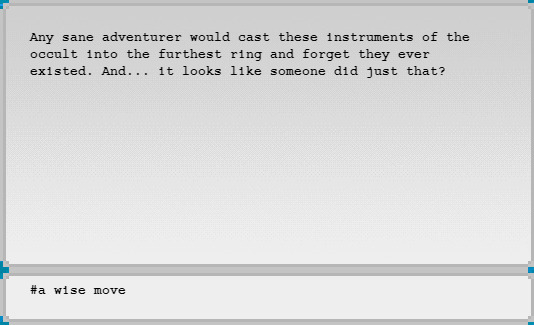
It’s a nice bit of callback humor that Meenah has the same reaction to discovering the Thorns of Oglogoth that Rose does, but unlike Rose, Meenah actually does destroy them on the spot.
For being so headstrong and dangerous, there are ways in which Meenah is really pretty surprisingly sensible.

Lord English can destroy ghosts - this has always been a pretty disturbing thought for me. I may have said something to this effect before, but if I haven’t I’m a free-thinking Theist - raised in the Church, and largely independent in terms of beliefs, but I’m still pretty convinced that there is some kind of life after death. It doesn’t bother me nearly as much in works that have final death as a general presupposition, but it always bothers me when some kind of eternal life after death exists in a setting, and can be arbitrarily denied by evil beings with some power or another, like how some Demons and Liches can destroy or devour a soul in Dungeons and Dragons.
In Homestuck though, it fits with the themes established by the ways in which everyone God Tiers - spiritual power can be pretty arbitrary, and generally signifies very little about the moral worth of the one who has it; it does not intrinsically elevate the one who has it. It fits with its general criticism of power and the powerful, whether that’s the Mayor’s hatred of Kings, or the associating of corporatism with the worst parts of Jane’s characterization and Crockercorp in general.
Lord English has the power to destroy ghosts and end the lives of immortals not because he has attained to any kind of heightened spiritual awareness. He’s just some douchebag who through cosmic serendipity was in the right place at the right time to become basically all-powerful.
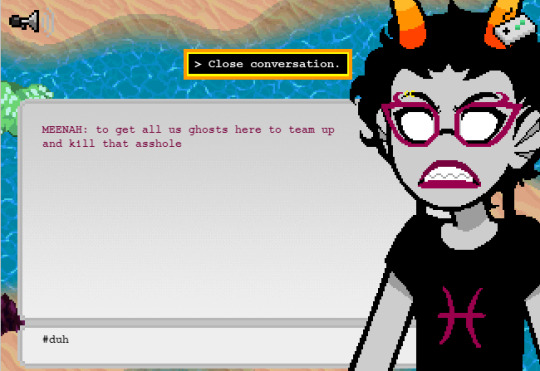
I adore Meenah’s spark. Who gives a fuck if Lord English is invincible? She knows exactly what she’s going to do when she gets her hands on him, and she’s got a plan from the outset. I think it’s also interesting the way that even though Meenah is absolutely taken by the spectacle of power, it isn’t sufficient to make her want to join up with English. Only soft power works on Meenah Peixes; emotional intimacy, friendship... keeping her entertained. All of these are the actual way to moderate her violent and dangerous personality.

While neither Rose nor Meenah is a parallel character to either Gendo or Rei from Neon Genesis Evangelion (I think, actually, that Dirk is the character who most strongly parallels both of them), this bit reminds me of the way that Ritsuko describes both of them;
Rose says of herself and Meenah, “You’re not very good at this, are you? ... talking to people.”
Ritsuko says of Gendo and Rei, “They’re not very adept (at)... living, I suppose.”
The same can really be said of a lot of characters in Homestuck, particularly the ones who primarily find their identity in some form of power-seeking. Whether it’s Rose, or Dirk, or Meenah, or even someone as innocuous as Jake, none of them is particularly adept at living.
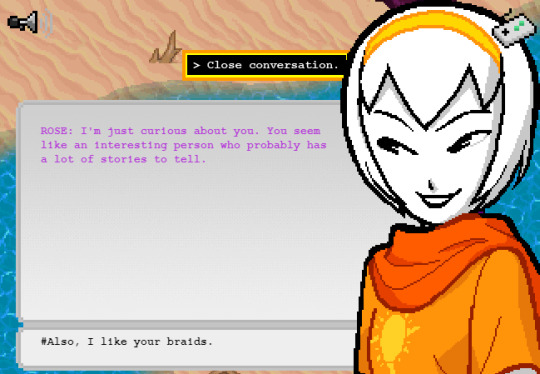
Rose is pretty conciliatory with Meenah; given her attraction to danger and darkness, it’s probably not surprising that she makes such an obvious pass at Meenah in spite of the fact that she probably knows what their relationship was in another life.
Further evidence that Rose is the horniest Homestuck character.
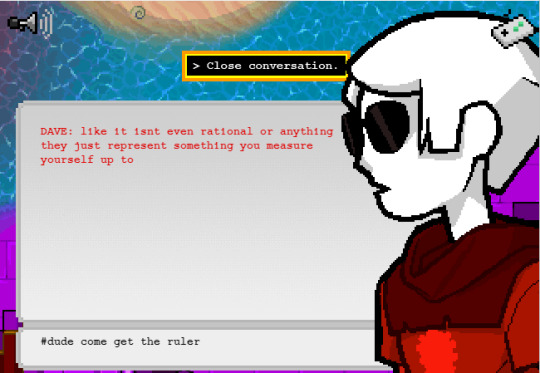
“you know how it is with ancestors
they just kind of hold this inexplicable power over you”
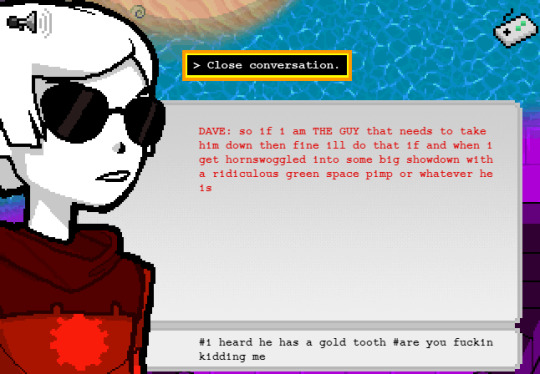
Dave continues to progress down the path of not giving a shit, as did Sollux before him.
He’s not quite to the level of reluctance that he eventually adopts, of choosing to just not engage with English at all.

Gods are, to some extent, aware of the various narrative forces that govern their existence.

About the only thing this piece of nasty trash has in common with Karkat is the extent to which they both blabber, and he helps create contrast with the other, somewhat more likable dancestors. Kankri is pretty much openly contemptible, and really in the worst way. I’m almost inclined to call him a concern troll because of the extent to which his verbal essays exist purely to make him feel better about himself. Any time it comes time for him to listen to people who historically actually suffered from the systems they were involved in, Kankri shows his true colors, slut-shaming and misogynistic.
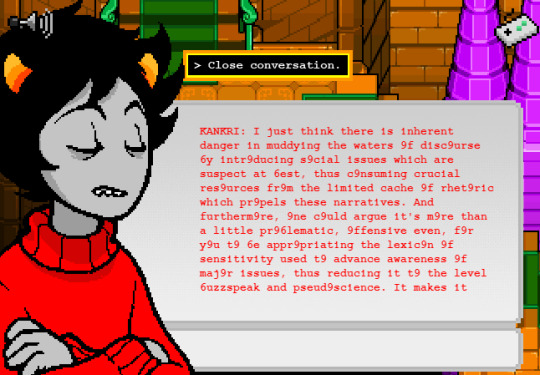
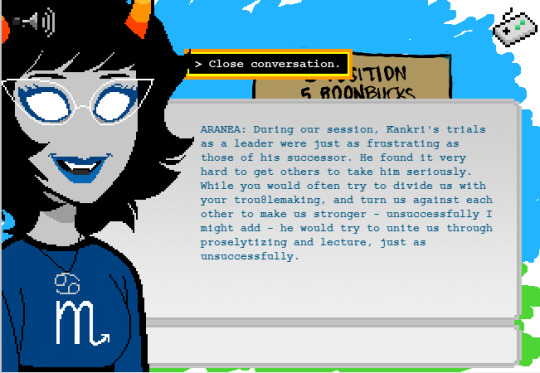
Unsurprisingly, The Other Thief is also the vector for English’s ideology in her session, “turning us against each other to make us stronger.” While Kurloz may be a worshipper of English, and Damara may have thrown in her lot with the demon because of her nihilistic despair, Meenah (rather like Dirk!) is clearly driven toward a life of violence, and restless action for its own sake.
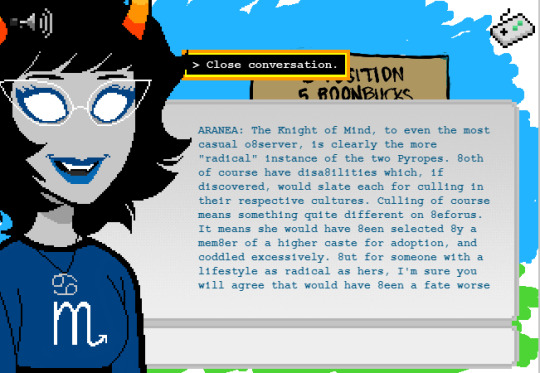
Now we’re starting to get some insight into Feferi’s style of rulership, which in turn, probably gives us some insight into Jane. For Feferi, leadership means taking power away from the people you’re leading if it seems like they have the potential to hurt themselves (or to be a drain on society if left to their own devices). It represents a violation of agency, perhaps not so severe as the kind that Vriska perpetrates usually.
Feferi and Jane are the sort of people, I think, who want to create a perfect world - but it’s important to them that they’re the one who’s creating that world, and less important that the world is perfect for anyone in particular. Just perfect.
https://homestuck.com/story/5288
John’s whole self-conception, and especially his conception of himself as a man, and someone who might be growing up to take on the same roles as his Father, is tied up in the icons of dadliness and masculinity in the movies that he likes.
So we should expect that his disillusionment with his past will change the way that he thinks about his future, and what he’s going to do with it. It’s a shame that this line of questioning never goes anywhere in Homestuck proper, but I’ll use it as evidence in the “John/June Egbert is trans” folder. Reminds me of how my decisive lack of affinity for the Boy Scouts serves as a nice little retrospective bit of evidence in my own trans narrative.
Based on the number of trans Eagle Scouts I know, I feel like there’s a certain extent to which it be like, a fast-track to figuring that out about yourself, like, you tried all the boy stuff and just decided, nope! Not for me.
https://homestuck.com/story/5290
Man, especially if we continue to read this section of Homestuck as conflating the characters and the audience, this whole section reads as John not just having a meltdown about Con Air, but also generally having a meltdown about his own story so far - everything he’s done in Sburb, etc. It just all feels lame and shitty in retrospect, when it was something that was kind of exciting at the time, at least up until the point where his loved ones all dropped dead there at the end.
It turns out that there was nothing particularly edifying about John’s suffering.
https://homestuck.com/story/5300
Teens can be such monsters. It’s the anniversary of Bro’s Death too. Davesprite is probably as broken up about that as John is about Dad, but it’s hard for boys/men to talk about that kind of thing with each other.
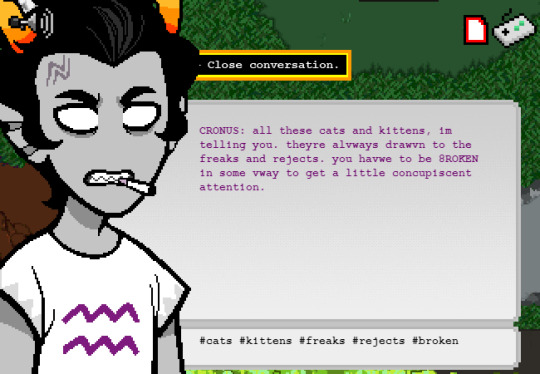
Cronus is even more of an incel than Eridan. He may be the most singularly contemptible character in Paradox Space. Do I hate anyone more than Cronus? No, I think I do not.
I won’t have a lot to say about the middle leg of Openbound; it’s relatively empty of substance, and not much that happens in it is ever relevant again compared to the first and second legs.
I like to think that this leg of the journey is, more than anything, a chance to ruminate on some joke characters who were already parodies; parodies of parodies, a joke made at the expense of an existing joke. The kind of thing Dirk Strider would write, basically.
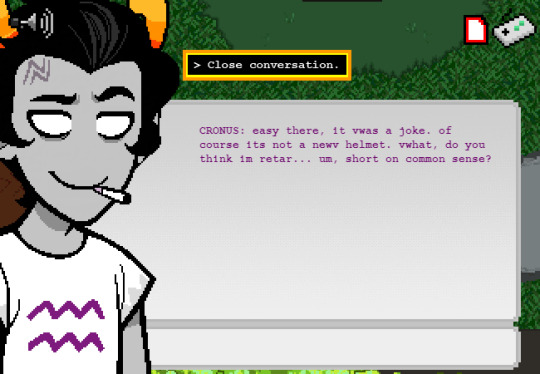
Hey check it out, the Year of Our Lord 2012, and Andrew was starting to show some mild sensitivity in his choice of words. Just mild enough to have the lowest character in the story show a tiny bit of sensitivity himself.

This leg of the adventure does give us some more insight into Meenah’s character. Just like Vriska, she’s all about being a hardass super-murder, until she starts causing problems for the people she actually cares about.
Being Evil Sucks.
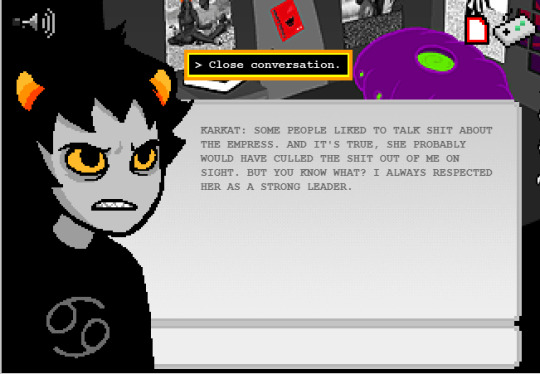
This is a really weird sentiment for Karkat to have in light of like, everything else about the latter half of the comic. I mean, he hasn’t exactly had the epiphany yet that the ideas that he has about being a leader are kind of awful and shitty, so it’s possible that he’s talking the Condesce up to avoid thinking about that. IDK.
He also immediately claims he’ll leave behind the meteor to go and join Meenah’s army, so maybe Karkat is just in a pretty low place in general? That tracks.
Karkat’s little conversation with Terezi explains at the two thirds mark of Openbound exactly what this whole thing is about.
Almost the entire second half of the comic is about examining the character’s guardians, and their relationships with them. The Guardians - Grandpa and Bro especially - are hyped up to be these outrageous badasses, both in-and-out of universe, and their ambivalent relationship with their kids creates this ambiguity throughout the comic about whether the kids are worthy, whether they’re living up to their parents’ legacy - and it’s the kind of thing that plagues them throughout.
But the thing is, Ancestors can be lame, or even terrible. They’re not really anything to aspire to, and the image of success that they project onto the world is one of learned confidence, and usually that only if they’ve really managed to make it.
Even the best parents are flawed, and instead of trying to measure up to them, growing up healthy usually means learning what those flaws are, and committing not to reproduce them.
Parents don’t suck; they can be awesome, and generally speaking, for a long part of our life, they’re all we’ve got. It’s hard not to love them. But we shouldn’t turn them into idols.
(On another note, it’s one hundred percent fitting for Terezi’s Ancestor to be an outrageous coolgirl. Terezi is perpetually anxious about being cool enough, the sort of person who is breathlessly fun to be around, who commands the attention of everyone around her, and she’s surrounded by them wherever she goes.)
https://homestuck.com/story/5340
John’s distress leads him to dream about his dead Dad, and boy is he angry. He spends a lot of the second half of the comic seething in rage directed at whomever is responsible for all the suffering he and his friends endure, dishing out beatdowns toward those responsible, but I’ve never gotten the impression that these little outbursts of his are particularly rewarding for him.
https://homestuck.com/story/5358
That was quite a blow. He knocked out like a tenth of Jack’s health bar.
https://homestuck.com/story/5387
Depending on where you’re standing some really totally different things can matter to different people. From Vriska’s point of view, the things that happened back when she was alive totally don’t matter at all anymore - only the matter of Cosmic importance that is fighting Lord English.
But the stuff that matters to the people she left behind, and the suffering she’s responsible for - especially for putting Terezi in a position where she had to slay her - all of that still matters very much to the people who are alive, which is what makes her self-conception as someone who is on the side of the angels now really... not sit well.
She clearly hasn’t changed all that much. She just thinks, as usual, that now that things are even, now that the score is settled, things can go back to the way they were before.
https://homestuck.com/story/5388
Tavros and Vriska are really bad for each other in general. Like, it’s not good for her to be around someone as pliable as Tavros is, and it’s plain to everybody that it’s not good for him to be around her either; whenever he’s around her, he apes her bogus inflated self-esteem in all the worst ways.
https://homestuck.com/story/5397
Tavros’ explanation of what Vriska does suggests that storytelling has become kind of a ritual for her - a means by which she is attempting to connect with her Ancestor, by performing the same actions she is, miming her - still the same old Vriska.
That’ll be all for now. Cam signing off for now - join me for the thrilling conclusion to Openbound tomorrow, Same Cam Time, Same Cam Channel.
8 notes
·
View notes
Text
02 and the question of “what a life is”

One topic more specific to 02 is the question of what exactly counts as being “alive”, which is initially brought up as a question when Ken discarding the Kaiser persona is directly caused by the revelation that he might have misjudged this, leading into the second half of the series where other issues reveal that it’s not as easy of a question as one thinks. In the end, 02 never gives a concrete answer about what constitutes the boundary between something that’s “alive” and “not alive” -- but, being a series that’s very much about pragmatism, gives a much clearer answer as to what one should do about it.
While it’s not named directly in the series itself (I’m not sure if this specific named concept was the intent, as it’s since expanded to become a fairly ubiquitous theme in sci-fi and fantasy overall), 02 deals heavily with a question related to a thought experiment called the “Chinese room problem”, which originated as a question related to artificial intelligence development and has since expanded into having philosophical and spiritual nuances (perhaps fittingly for Digimon Adventure, which is heavily about digital technology and sci-fi but mixes it with a lot of philosophical and spiritual imagery).
The Chinese room problem goes like this: let’s say you’re a person who has never learned, studied, or grown up with the Chinese language (or, really, any language you can’t understand or read; Chinese was only used as an example because the person explaining the thought experiment was using himself as an example and couldn’t read or understand it). You’re locked in a room that has a bunch of Chinese phrasebooks that give you instructions -- basically, they indicate common Chinese phrases, and sensible responses you can give to them (without actually translating it to a language you know). Someone slips you a piece of paper under the door with some Chinese phrases on them. You use the phrasebooks to write appropriate responses, and slip the paper back. The person outside the door reads the paper, sees what they gave you, and sees the response you gave them. It makes sense, of course, because the phrasebook told you to write an answer that made sense. But can you be said to actually understand Chinese? No, because you were just following instructions without actually understanding what they meant.
So let’s expand this to make it a bit more complicated: say you have an AI or a robot or something of the sort that accepts “input” -- people saying things to it, or showing it things -- and gives expected “responses” that seem sensible, through a bunch of complicated programs and processes in its programming. Can you say this robot is “alive”? One might say “no”, because, no matter how complicated and intricate it is, all of it is technically following a set of routine commands telling it to do certain things in response...or so you might say, but couldn’t you say the same thing about a human brain, which also takes input, processes it according to its own instructions (just caused by chemical processes instead of bytes and code), and creates output? After a certain point, this question is going to become far more of a philosophical, spiritual, and potentially even religious question than anything.
Adventure and 02 undoubtedly have a very spiritual element to it, given the heavy usage of Neoplatonic themes, the concept of “destiny” that hangs heavily over it, and the fact that Digimon themselves are heavily linked to spiritual things like Japanese youkai or other spirits and literally being part of the human soul. Digimon partners are treated as part of their partners’ human psyches, yet are also treated as individuals. And, in the end, it’s driven home that Digimon are made out of data -- but “digital technology” is treated as something that can communicate with such spiritual things. So here’s the question: At what point can a Digimon be called a living being?
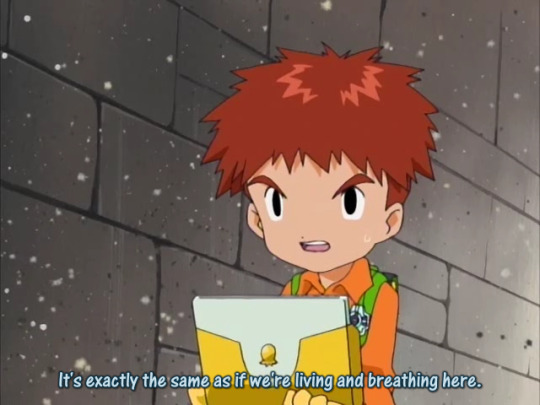
Well, really, the first time this had really been brought up was the allusion to the issue in Adventure episode 20 -- when Taichi takes the revelation of the Digital World being a “digital” world a bit too literally and decides to treat it as a game, acting a bit too recklessly as a result. Koushirou himself buys into the theory of “real bodies” (which turns out to be false; this isn’t a Matrix situation where their bodies are sleeping somewhere, but they are actually being migrated here), but the point by the end of this episode is: just because everything is “data” doesn’t mean you get to treat it any less lightly. Do not treat the Digital World like a “game world” or something you can fiddle with at will.
Even if the technicals may make it seem like a computer, the reality of the situation is that everything you do has a permanent effect that you cannot instantly take back. It doesn’t matter what it’s “made” up out of; the issue is more about what you do, and the practical impact it has on what’s around you. (This will very important for later, so keep this in mind as we go.)
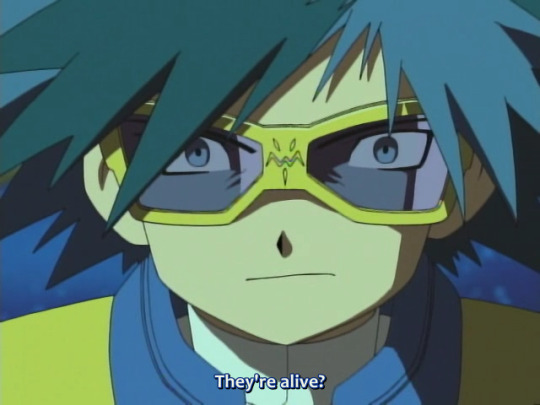
So by the time we get to 02, the first time this issue is brought up again is in 02 episode 20, when Ken, as the Kaiser, recognizes the kids’ Digimon Baby forms as the “plushies” he’d seen them carrying in real life during the soccer match back in 02 episode 8, which reveals a lot about his mentality in approaching the Digital World and Digimon -- he’d been under the impression that Digimon couldn’t leave it, apparently, and that they were therefore all part of a simulated game. Driving it in further is that Wormmon refers to the Digimon having “bodies” (as in, physical bodies), which trips Ken’s radar that there’s a lot more to this than he’d thought. There’s also a lot of evidence that Ken wasn’t just solely trying to buy into this concept for the sake of denial and self-justification; up until this point, he’d been noticeably hesitant to physically harm other humans, so he really did buy into there being a substantial difference here.
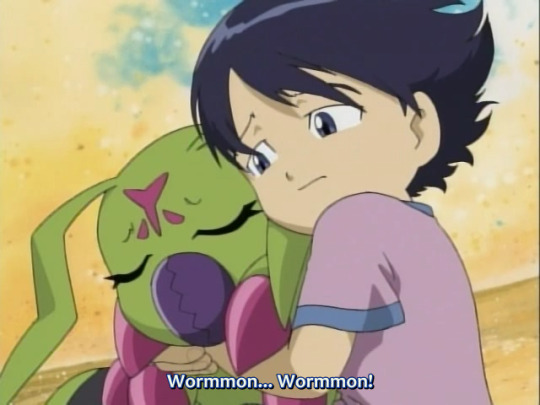
...But, funnily enough, we later learn in a flashback in 02 episode 23 that Ken didn’t necessarily always have this attitude of “Digimon aren’t living beings, so I get to do whatever I want with them” back during his original adventures with Wormmon in the Digital World. One could argue that maybe he “knew” that Digimon were alive back then and the Dark Seed just made him forget through trauma, but even Taichi hardly treated the Digimon badly back when he thought that everything was a “game” back in Adventure (rather, he was reckless with himself more than anything). Later in this very series, there’ll end up being a massive debate on what exactly constitutes a Digimon having a “soul”. No, the real issue is actually...
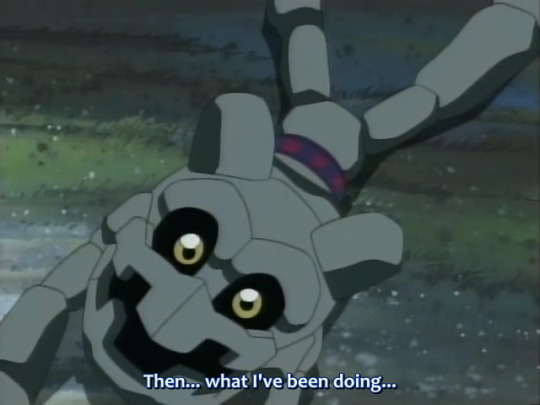
What tips Ken over the edge into discarding the Kaiser persona is empathy -- when he retroactively reflects on the implications of the Digimon being “alive” meaning that every single action he’d done had an impact on causing “pain” or “torture” on others. That’s why it didn’t matter so much to him back then, because he was willing to treat Wormmon with the respect of a living being, regardless of what he was made out of (and, really, humans are more likely to be kind to things than otherwise, even when they’re supposedly “artificial”; for an extreme example, see how people are inclined to treat their robotic vacuum cleaners like family members, or have a hard time picking rude choices in video games, and those are all things you have much less of an argument for there being any actual pain inflicted).

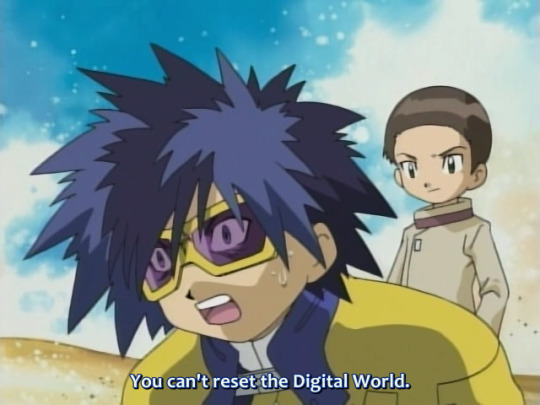
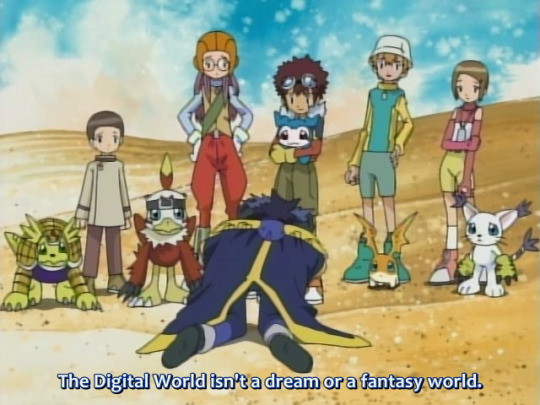
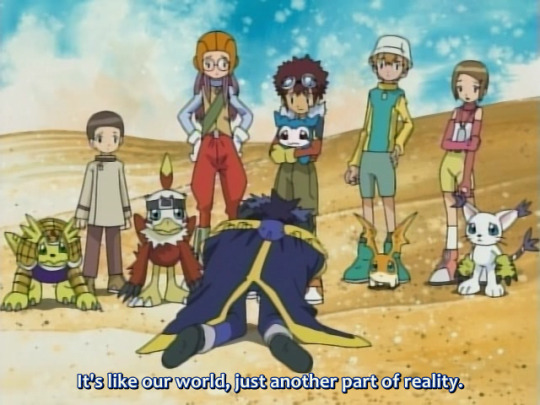
And, hence, the main reason why the kids rail so much on the Kaiser for suggesting the heresy of “resetting the Digital World”: because he’s treating something with the gravity of “reality” like it’s something he can just toy with for his own convenience. Who cares what it’s made up of? There are actual civilizations building a livelihood here and “living beings” that can feel pain or show emotion. Nobody ever gave the kids immediate knowledge that Digimon have souls or any higher answer like that -- it’s just that the Kaiser is a callous, unempathetic jerk who’s willing to toy with so many lives and living individuals for his own pleasure. And, most importantly, everything the Kaiser has done here is something he can’t take back, and has to accept the consequences of; this wasn’t a place where he could vent out his feelings of being unable to “take back” Osamu’s death and treat everything lightly.
It doesn’t actually matter what it’s made up of -- the fact is that they act like living beings, show obvious personal feelings and a propensity to feel pain, and thus have the right to be treated as such. If you’re practically able to observe this, then you should be respecting that.

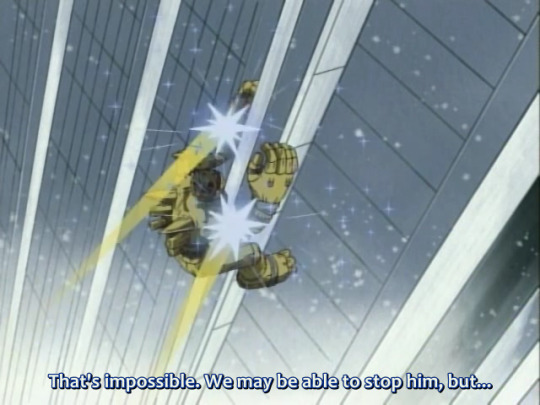
Once Archnemon takes over the position as most prominent antagonist, the kids start dealing with her Dark Tower Digimon that she uses to indiscriminately destroy things. This initially creates a lot of confusion for the kids, especially when Ken and Stingmon so easily kill Thunderballmon and it looks to them like he’s gone right back into sadism after supposedly being reformed -- thus, this would provide an issue with Ken’s apparent lack of empathy if he’s allowed to keep going, because he (seemingly) hasn’t learned his lesson and will go on to keep hurting more victims.
When Golemon goes to destroy the dam, it’s repeatedly commented on how unusual it is for a Digimon to just go and destroy a dam for no reason except to ruin people’s lives -- even the enemies back in Adventure at least had a power-hungry motive, and the non-verbal “wild” ones back in File Island were ultimately territorial at worst, and certainly not interested in wanton destruction without reason. On top of that, in fact, only two people -- Iori and Miyako -- in this group of five are actually that vehemently in favor of trying to spare Golemon for the sheer reason of it being a living being -- Daisuke starts to consider the fact that it may become necessary to save potential victims before Ken is even brought into the picture, Takeru points out how close they are to push-coming-to-shove, and Hikari clearly laments the fact it may become possible but doesn’t take nearly of the strong “we absolutely cannot do this” stance that Iori and Miyako have. And, after all, Takeru and Hikari were there back in Adventure when killing some very sentient Digimon became necessary, and learned that it may be something you have to do if you want to prevent more victims, and Daisuke had personally been a victim of Vamdemon back in 1999 and also happens to be one of the most pragmatic in this group.
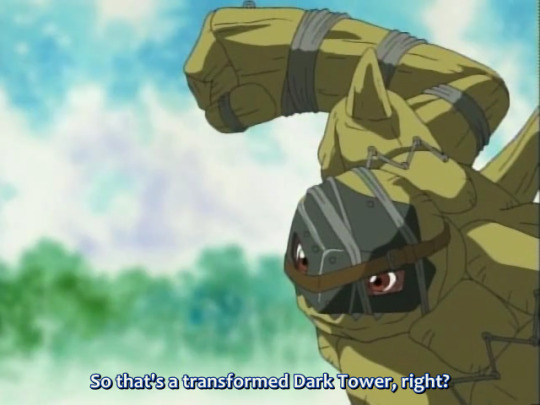
Thus, the reveal that Golemon is actually a Dark Tower Digimon confirms two things for them: firstly, that it’s very unlikely that Golemon is powered by anything but a sheer instinct of wanton destruction, and secondly, that Ken does, indeed, have a concept of empathy. The kids had already noticed that something was “unusual” about Golemon in that it seemed to be incapable of independent action, just an order to “mindlessly destroy”, and it being what the series refers to as “a Dark Tower in the shape of a Digimon” just happens to confirm that it may not actually be that capable of independent action or emotion -- which they then realize that Ken also realized, and thus that he wasn’t killing Digimon out of callousness. This is, also, effectively, the same reason they’d been okay with killing Chimeramon earlier -- because there was absolutely no evidence that it had been capable of sentient reason or anything besides “destruction on instinct”.
So, again: their judgment on the situation is based on a practical observation about whether the entity in question was capable of having emotions or independent thought, and, again, a question of empathy...


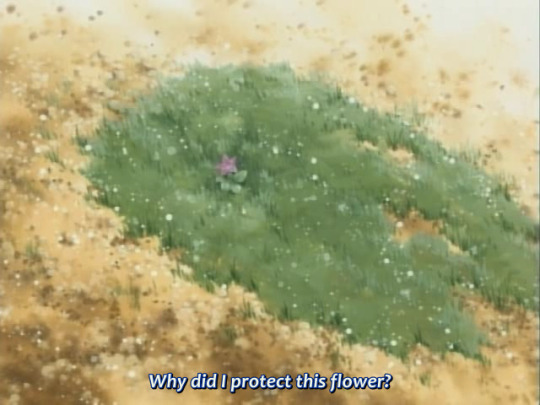
...because we learn that the same process, when applied to enough Dark Towers, is enough to create a Digimon who is capable of that kind of independent thought and doesn’t feel up to taking orders, regardless of whether Archnemon is his “creator” or not. So we’ve got a demonstration of a Digimon who’s clearly capable of independent thought in ways the other Dark Tower Digimon are not (he even voices “envy” for the other single-tower Digimon Archnemon creates for being unable to think about anything), and starts exhibiting irrational behavior and the concept of “emotions”.
Recall the issue of the Chinese room problem: if we’re talking about a room of phrasebooks that simply take one input and export output, you, in the middle of the room, can’t really be said to be “understanding” Chinese. But the more complex the inputs and expected outputs get, the more complicated and intricate and explanatory those phrasebooks are going to need to be, and at some point, given a complicated enough question you get, if you’re capable of answering that in the same way a human might be expected to, that information in the phrasebooks will have to be explanatory enough to an extent you’ll be said to understand Chinese. Exactly “how complicated” or “how nuanced” does a program get before we tip that boundary? Clearly there is some difference between BlackWarGreymon and the other Dark Tower Digimon, but what is it?

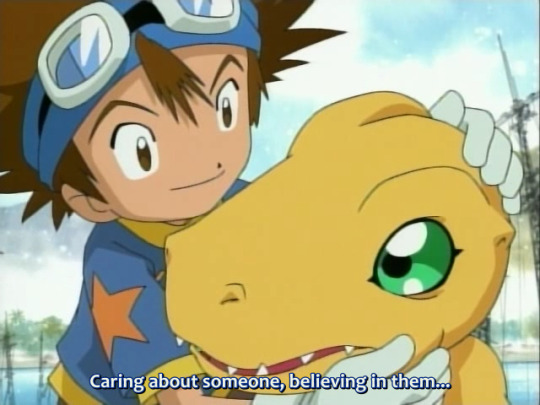
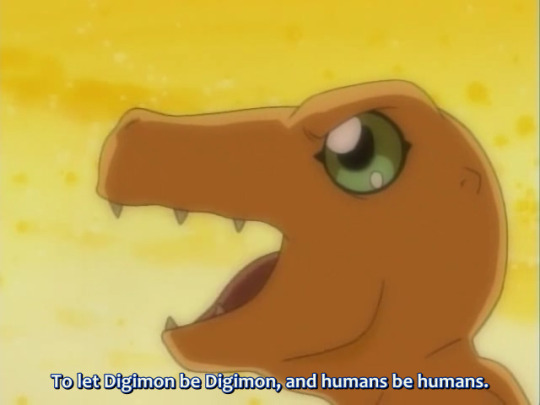
And when 02 episode 32 comes around and Agumon decides to have a little bonding chat with BlackWarGreymon, even he can't answer the question definitively as to what a "soul" or “heart” is -- nobody in this narrative can, and this series has no answer. There’s no real clear-cut rule as to the boundary as to when one can be considered sentient. But while Agumon may not be able to immediately yank out deep philosophy, he at least has a deep level of insight and understanding as to what it means -- you have feelings for others, you have emotions, you have things you want that aren’t necessarily what others expect you to do, and you can bring your own perspective to the table.
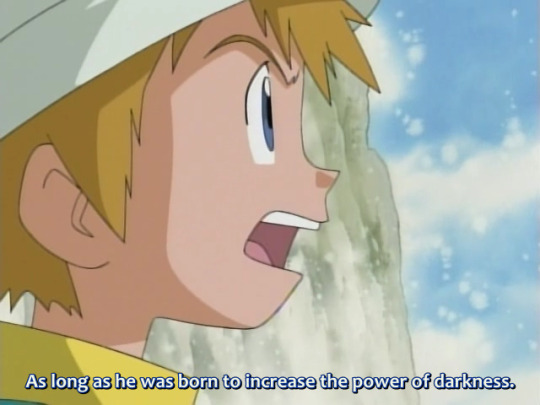

The debate over what to do with this also leads to the rift between Takeru and Iori that they have to work towards mending during their Jogress arc -- Takeru’s trauma regarding Patamon in Adventure has spiraled him all the way over into prejudice against anything related to the darkness, and Iori, who understands there’s more to the situation than that, but also happens to be on the other extreme of considering it immoral to kill anything regardless of whether it’s about to murder a ton of other victims while it’s at it.
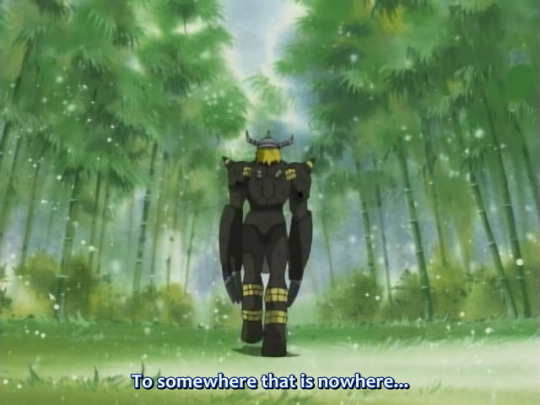
Ultimately, Adventure and 02 is a narrative that prioritizes “pragmatism” first, and the moment it’s made clear BlackWarGreymon isn’t going to cause problems anymore, the kids all decide it’s fine to let him be. In the end, whether BlackWarGreymon is “alive” is a philosophical question, but...

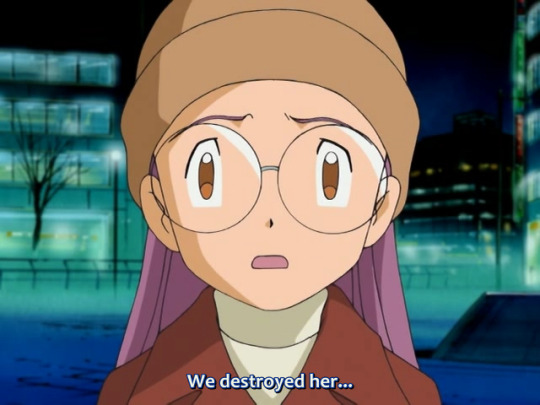
...whether they should hold back in fighting just to “spare lives” really has no bearing on that question. Enemies like LadyDevimon and the other Digimon the kids are ultimately forced to end up fighting are clearly alive with their own emotions -- it’s just that those emotions do happen to be uncontrolled sadism and an active desire for wanton destruction. Miyako herself even observes that LadyDevimon is a “coward” -- but she’s also still emotionally torn by the fact they end up killing her, and the story also doesn’t give her grief for this, because there’s no sin for her to have empathy. She recognized what it meant to kill a life, but they also cannot be blamed for taking that life in the process of saving multiple others. The issue of “whether it’s alive or not” had always been a separate question from the morality of fighting said lives -- and, either way, it’s still valuable that characters like Hikari, Miyako, and the other Chosen Children aren’t necessarily doing this because they like doing it, because it’s still important to keep that feeling of “empathy” in their hearts, even if push did ultimately come to shove.

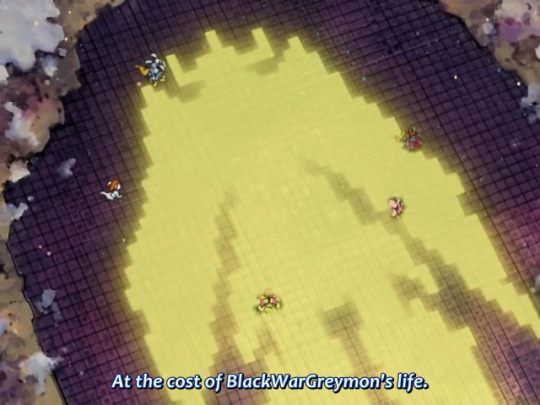
So when BlackWarGreymon does return, again, nobody has an answer for him on whether he has a soul or not, but in 02 episode 47, Agumon, V-mon, and Wormmon encourage him to embrace the concept of life by “experiences” -- happiness, sadness, pain, playing and enjoying life with those you care about. Because those experiences are “real”, and Agumon himself says that “those experiences have made me who I am”; regardless of the higher philosophical question of whether he has a soul or not, he’s still someone who’s capable of having experiences and acting based on his memory of them, and that’s what’s really important. And hence, when BlackWarGreymon sacrifices himself one episode later, it’s because he understands the meaning of “doing something for others”, and is also implicitly mourned by the other Digimon, who had never failed to see him as “someone they could have befriended”, regardless of what he had originally been made up of.
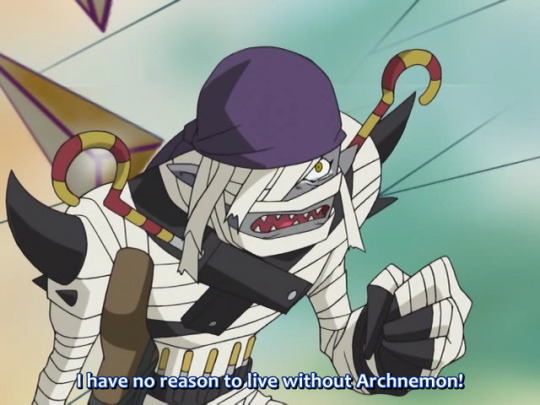
It’s also why the kids are so traumatized by Archnemon and Mummymon’s deaths in 02 episode 48 -- they had no reason to be personally attached to them prior to that, and Archnemon had even said that her personal goals were nothing but wanton destruction in 02 episode 29 (which had been the first time Iori had really considered that pacifism may not be completely possible here). All of the wacky hijinks between the two of them had largely been outside of their view. But even back in 02 episodes 36-37, the kids had understood that there was some degree that they were harmless if left alone, and in the end, they watched Archnemon die in unambiguous pain and Mummymon die in the name of true love, by dying in a suicide attack because of his despair over losing her.
Archnemon and Mummymon had ultimately turned out to be “artificial lives” on their own, created at the hands of Oikawa to be his minions, and also somewhat guided by “wanton destruction” and not entirely fully aware of what they wanted to do independent of him -- BlackWarGreymon’s existential crisis had caused them to question their place in the world in 02 episode 47...and quickly shrug it off again. Could you say anything about whether they were alive or not, or whether they had souls? Perhaps it doesn’t really matter -- whether or not they were able to fully have deep thought the same way BlackWarGreymon and the other Digimon had, they at the very least were able to feel attachment and pain, and that alone deserved to be respected.
In the end, you could say that’s 02′s answer -- or non-answer -- to the Chinese room problem. You may not be able to answer the intrinsic philosophical question of whether it’s got a “soul” or is “alive” or not, but if it’s clearly demonstrating an observable and practical phenomenon of showing emotions, acting on some degree of independent will, taking in experiences and acting on them, and being able to feel a sense of pain, then you should still treat it with the appropriate amount of empathy -- regardless of what it’s made out of.
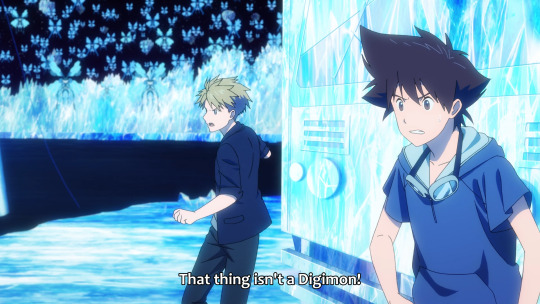

Incidentally, we do actually get a very small revisiting of this topic in Kizuna, when Menoa creates a ton of Eosmon by “scientific” methods -- and, much like the Dark Tower Digimon, they’re not recognized as living beings by anyone in this narrative, because their behavior is clearly that of mindlessly following Menoa’s orders; Yamato won’t consider it a Digimon, and Menoa herself even acknowledges that this is in no way a real “partner” like her true one, Morphomon. What does get Menoa to recognize Morphomon within Eosmon is when it does one thing -- smile -- that’s clearly outside that view, and an obvious show of independent emotion, leading Menoa to realize that her true, living partner may be closer than she’d thought.
51 notes
·
View notes